Welcome to Essential Politics, our in-the-moment look at California political and government news.
Visit Essential Washington for coverage of the White House and goings on in the nation’s capital.
Sign up for our free newsletter for analysis and more, and subscribe to the California Politics Podcast. Share your feedback here. To support in-depth journalism, subscribe to The Times. And don’t miss our Essential Politics page in Sunday’s California section.
- Share via
Newsom’s budget proposes $3 million for Alzheimer’s research, brain task force
Gov. Gavin Newsom will call for the creation of a brain health task force and dedicate $3 million annually from the state’s general fund to Alzheimer’s disease research in the budget proposal he will release Thursday, a source close to the administration said.
The money for Alzheimer’s research would target the new grants at understanding why the disease is more prevalent in women and people of color. Former California first lady and Alzheimer’s activist Maria Shriver pushed for the funding to be included in the state budget.
Shriver said in a statement Wednesday that the funding would make California the first state to make “understanding our brains a priority.”
The state’s former first lady, whose late father Sargent Shriver was diagnosed with Alzheimer’s, founded the Women’s Alzheimers Movement, an advocacy group raising awareness about women’s increased risk for developing the disease. In 2011, she wrote a comprehensive assessment on the disease, to which Newsom — then mayor of San Francisco — contributed a portion called “What one city is doing.”
“This is personal to me, just like it is to millions of California families,” Shriver said. “Alzheimer’s is one of the largest medical, social and economic crises in our state, and of our time. I am so proud that, once again, California is leading the way. Wiping out Alzheimer’s is going to require bold thinking, and there is no doubt in my mind that California is home to bold thinkers who can make this happen.”
- Share via
Gov. Gavin Newsom orders ‘reinvention’ of troubled California DMV
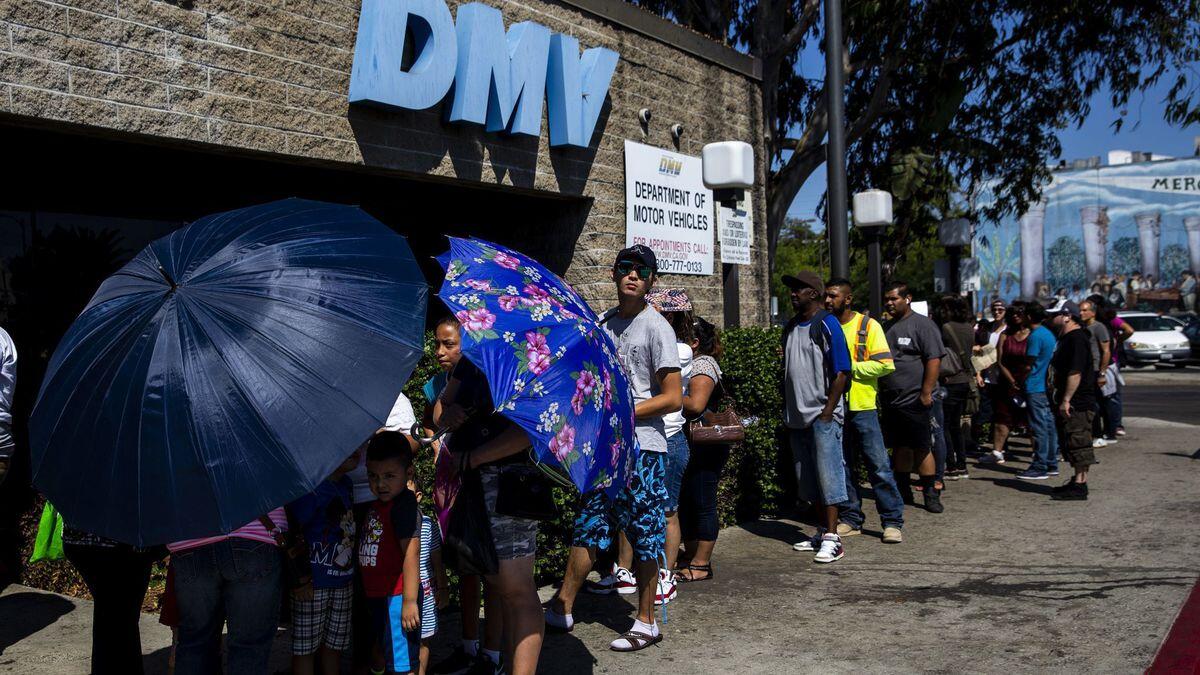
Gov. Gavin Newsom on Wednesday ordered an overhaul of the California Department of Motor Vehicles, which has been plagued by hours-long wait times at field offices, computer crashes and voter registration errors involving tens of thousands of customers.
Just a few days after taking office, Newsom appointed a top advisor to a new “DMV Reinvention Strike Team” to revamp the beleaguered agency over the next six months.
“By any metric, California DMV has been chronically mismanaged and failed in its fundamental mission to the state customers it serves and the state workers it employs,” Newsom said in a statement, adding “It’s time for a reinvention.”
The governor appointed state Government Operations Agency Secretary Marybel Batjer to lead the strike team with a goal of modernizing the agency and enacting changes that improve customer satisfaction, employee performance and transparency. Newsom also ordered an accelerated review of initial findings of an ongoing audit ordered last year by Gov. Jerry Brown.
The action was welcomed by lawmakers who have been critical of the DMV, including Assemblyman Vince Fong (R-Bakersfield).
“The egregious management failures of the DMV have been self-evident, which is why I have been calling for new leadership and a comprehensive independent audit of this troubled state agency over and over again as the problems grew significantly worse,” Fong said.
Last summer, Californians seeking new driver licenses complained of wait times of four to six hours at DMV offices, which the agency blamed partly on snafus caused by a rush of people trying to get Real IDs, a new identification card design required for airline passengers starting in late 2020.
Delays were also blamed on computer crashes at DMV offices as the agency struggled to update its aging automation systems.
The DMV also admitted that there were an estimated 23,000 errors as people either were unknowingly registered to vote or mistakes were made in their registration status as part of the state’s new “motor voter” program. The agency registered to vote as many as 1,500 people with legal U.S. residency but no citizenship.
Last month, DMV Director Jean Shiomoto retired from the agency. Legislators were angered earlier this week when the DMV said it needed an additional $40 million to prevent the return of long lines at its field offices.
In addition, the agency has been under fire for issuing driver licenses in the last year that do not comply with the federal Real ID standards requiring two forms of identification by applicants.
- Share via
California police unions are preparing to battle new transparency law in the courtroom
Just as a landmark police transparency law is going into effect, some California police agencies are shredding internal affairs documents and law enforcement unions are rushing to block the information from being released.
The new law, which begins to unwind California’s strictest-in-the-nation protections over the secrecy of law enforcement records, opens to the public internal investigations of officer shootings and other major uses of force, along with confirmed cases of sexual assault and lying while on duty. But the lawsuits and records destruction, which began even before the law took effect Jan. 1, could tie up the release of information for months or years, and in some instances, prevent it from ever being disclosed.
“The fact that police unions are challenging this law is on some level not surprising,” said Peter Bibring, director of police practices at the American Civil Liberties Union of Southern California, one of the principal supporters of the new law. “They have a long history of fighting tooth and nail against transparency.”
- Share via
Secretary of State Alex Padilla begins second term with challenge to ensure ‘every Californian is counted’
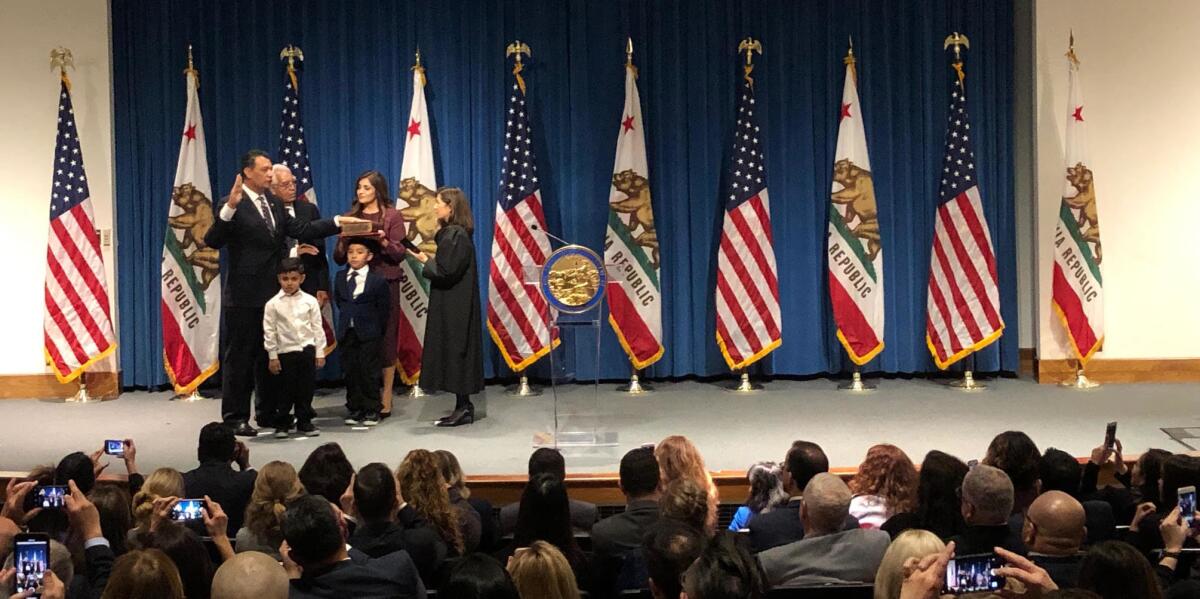
Secretary of State Alex Padilla was sworn in for a second term on Monday, saying he would continue the battle to protect the right to vote at a time when voter suppression efforts, online disinformation campaigns and interference from foreign adversaries have polarized the public and threatened to undermine trust in U.S. elections.
“I am doubling down on our fight here in Sacramento and in Washington, D.C., to defend our democracy,” he said. “Working on the front lines with so many of you, I know that our collective resolve has never been stronger.”
But the loudest applause came when Padilla promised to fight back against the Trump administration’s changes to the U.S. census, saying he will “ensure every Californian gets counted.”
Padilla, a former state senator and Los Angeles City Council member from the San Fernando Valley, led the cause for a new “motor voter” registration law in 2015, and a new system for online business registrations. But the programs have had experienced problems: More than 23,000 Californians were registered to vote incorrectly by the state DMV, the agency reported last year.
On Monday, Padilla said he would continue to push back against false claims of voter fraud in California and pointed to the state’s voter turnout as proof that his office was involving more people in the democratic process, a promise he made when he was first sworn in four years ago.
More than 12.7 million voters cast ballots in the Nov. 6 midterm election, representing roughly 65% of the state’s registered voters, the highest number of any midterm election since 1982, according to state certified results.
“I made that promise based on a shared belief that we are a stronger democracy and a better California when we hear all voices from all corners of California, and when those voices are not just heard but counted,” Padilla said.
- Share via
Ricardo Lara, California’s first statewide officeholder to come out as gay, sworn in as insurance commissioner
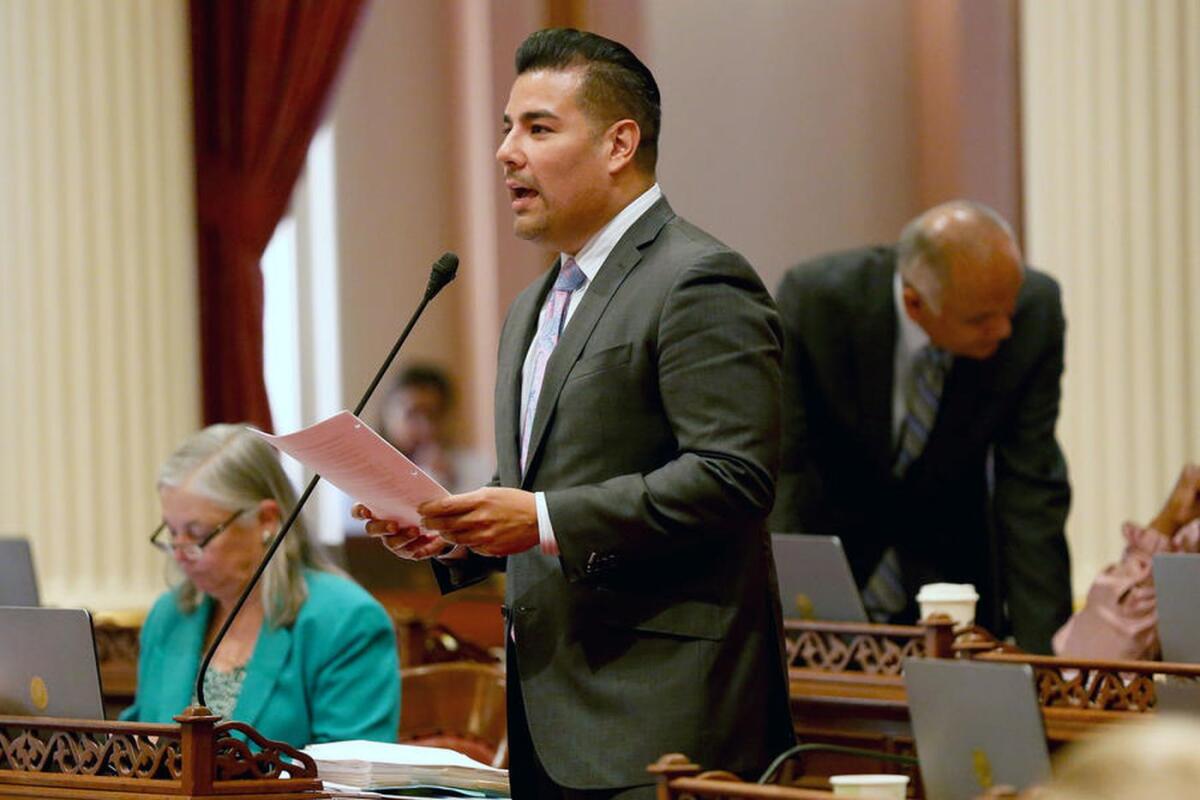
Ricardo Lara took the oath of office as California insurance commissioner on Monday, pledging action to boost healthcare coverage and combat climate change.
Lara, a Democrat from Bell Gardens, is the first elected statewide officeholder in California who has come out as gay. He began his speech in downtown Sacramento by thanking LGBTQ leaders who came before him and celebrated the occasion.
“Today, because of you, we’ve shattered the pink ceiling,” Lara said.
In his inaugural speech, Lara announced the creation of an executive position in his office to address climate change.
“There is no other industry that has the necessary expertise to ensure that California is prepared to mitigate and reduce risk to our communities and our environment,” Lara said. “Our planet can’t wait. I’m ready, and I hope you are too.”
Lara served as a state legislator and in 2017 introduced a bill to create a single-payer healthcare system in the state. He promised to work with new Gov. Gavin Newsom to expand coverage across California.
Lara was sworn in by retired U.S. District Judge Vaughn Walker, who declared unconstitutional California’s Proposition 8 gay marriage ban. State Sen. President Pro Tem Toni Atkins (D-San Diego) was on hand for the ceremony along with multiple other state lawmakers.
- Share via
New California Lt. Gov. Eleni Kounalakis says she will help expand access to universities in the state
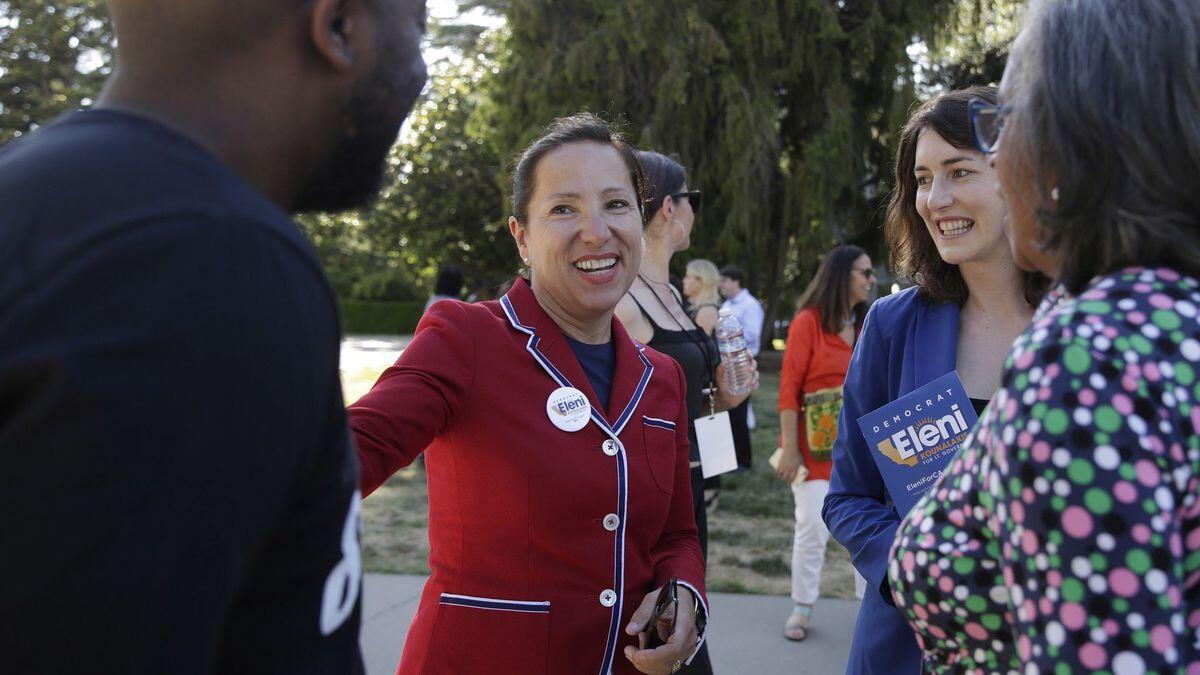
More Californians should be given access to public universities, Eleni Kounalakis said as she took the oath of office Monday to become the state’s first woman elected lieutenant governor.
Kounalakis was given the oath of office by Gov. Gavin Newsom, her predecessor in the job, who pledged they would work together.
As lieutenant governor, Kounalakis serves on the University of California Board of Regents and the California State University Board of Trustees, she noted in a speech at her swearing-in ceremony at the main Sacramento Library.
In that role, she said, she will be “committed to expanding access to affordable public higher education here in our state. It’s wise, its smart and it is the best way to address our rapidly changing digital economy.”
Kounalakis is former president of a development company founded by her father, Angelo Tsakopoulos, and served during the Obama administration as the U.S. ambassador to Hungary.
In November, she won her first run for statewide office. Also attending the ceremony were House Speaker Nancy Pelosi and former Michigan Gov. Jennifer Granholm.
- Share via
California meets Dutch Newsom, who steals the show at his father’s inauguration
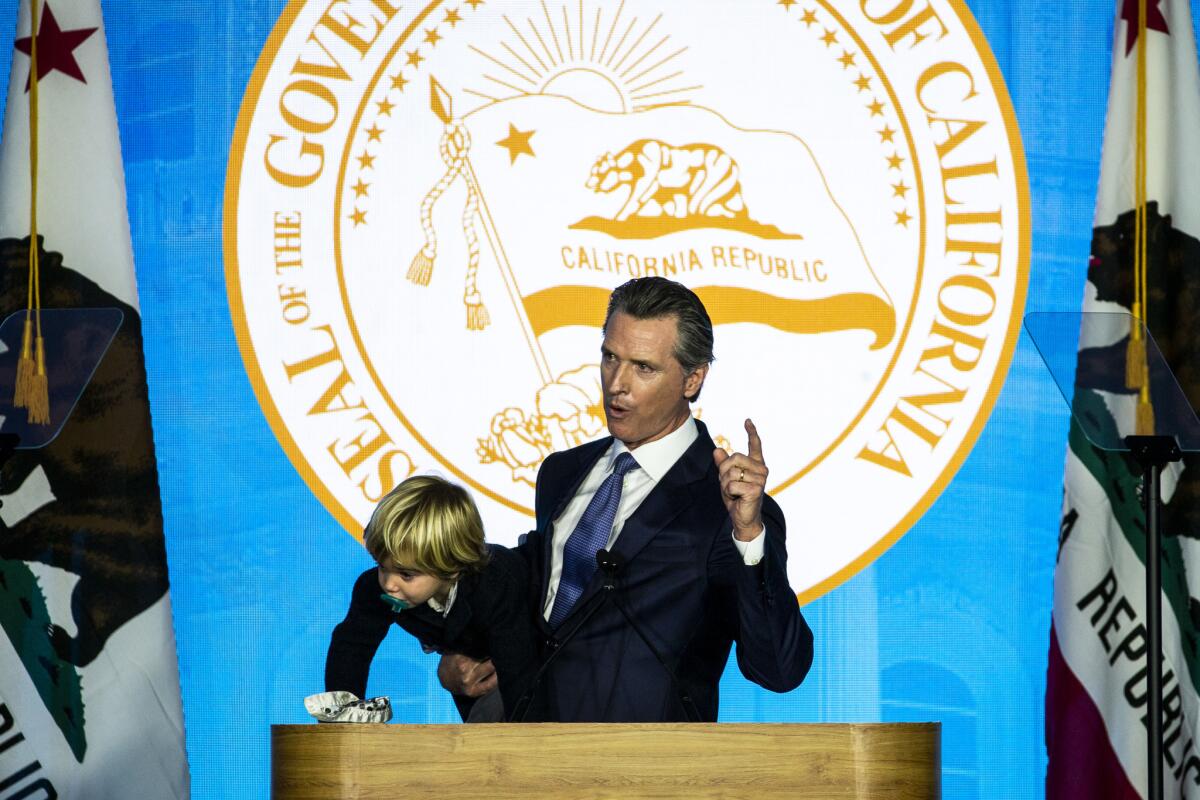
In the California political world, all eyes were on Gov. Gavin Newsom on Monday until his 2-year-old son stole the show.
Dutch, the youngest of four children in the Newsom brood, climbed onstage in the middle of his father’s inaugural address in a tent outside the Capitol on Monday. The unplanned moment saw the 51-year-old governor’s big day interrupted by the toddler, bringing levity to the ceremony.
Newsom was recounting Gov. Jerry Brown’s last inaugural speech and reference to the Sermon on the Mount, a biblical story about two men who built separate homes on sand and rock, when Dutch approached his father, a pacifier in his mouth and blanket in hand.
“Now more than ever we Californians know how much a house matters and children matter,” Newsom said, improvising as he scooped the boy into his arms.
The governor kissed Dutch on the cheek and held him for several minutes as he continued with the speech.
“This is exactly how it was scripted,” Newsom joked.
Newsom eventually put his child down and Dutch walked to the edge of the stage before retreating behind the podium to hide from his mother, First Lady Jennifer Siebel Newsom. The crowd roared.
Siebel Newsom was able to briefly divert her son only for him to return to the stage minutes later. She grabbed him again and this time, the crying toddler did not reemerge.
“When fires strikes, when kids cry and the earth shakes, we’ll be there for each other,” Newsom said.
Los Angeles Mayor Eric Garcetti, who said the moment humanized Newsom, threw cold water on any theories that Dutch’s cameo was planned.
“No, I know it was not,” Garcetti said with a laugh after Newsom’s speech concluded. “I could see that look of absolute abject terror [on Newsom’s face]. We’ve all been there. Kids always think it’s about themselves and they’ve proved it.”
California Assembly Speaker Anthony Rendon (D-Lakewood) agreed.
“I worked in early childhood education for 20 years and there’s no way you can ever get a child to do anything when you want them to do it,” Rendon said.
- Share via
Fiona Ma takes oath as California’s new treasurer
Fiona Ma took the oath of office in Sacramento on Monday as the state’s 34th treasurer, promising to boost California’s economy.
Ma previously served on the San Francisco Board of Supervisors, in the state Assembly and on the California Board of Equalization.
“I want to thank everyone for entrusting me with this important job. I understand my role here as your state treasurer is to build that financial wall around California so that we will remain the fifth-largest economy,” Ma said in brief remarks. “That is my promise to you.”
California Supreme Court Chief Justice Tani G. Cantil-Sakauye administered the oath to Ma.
Following the ceremony, Ma held an ice cream social for guests. On Wednesday, she will host a public event in San Francisco to celebrate her swearing-in.
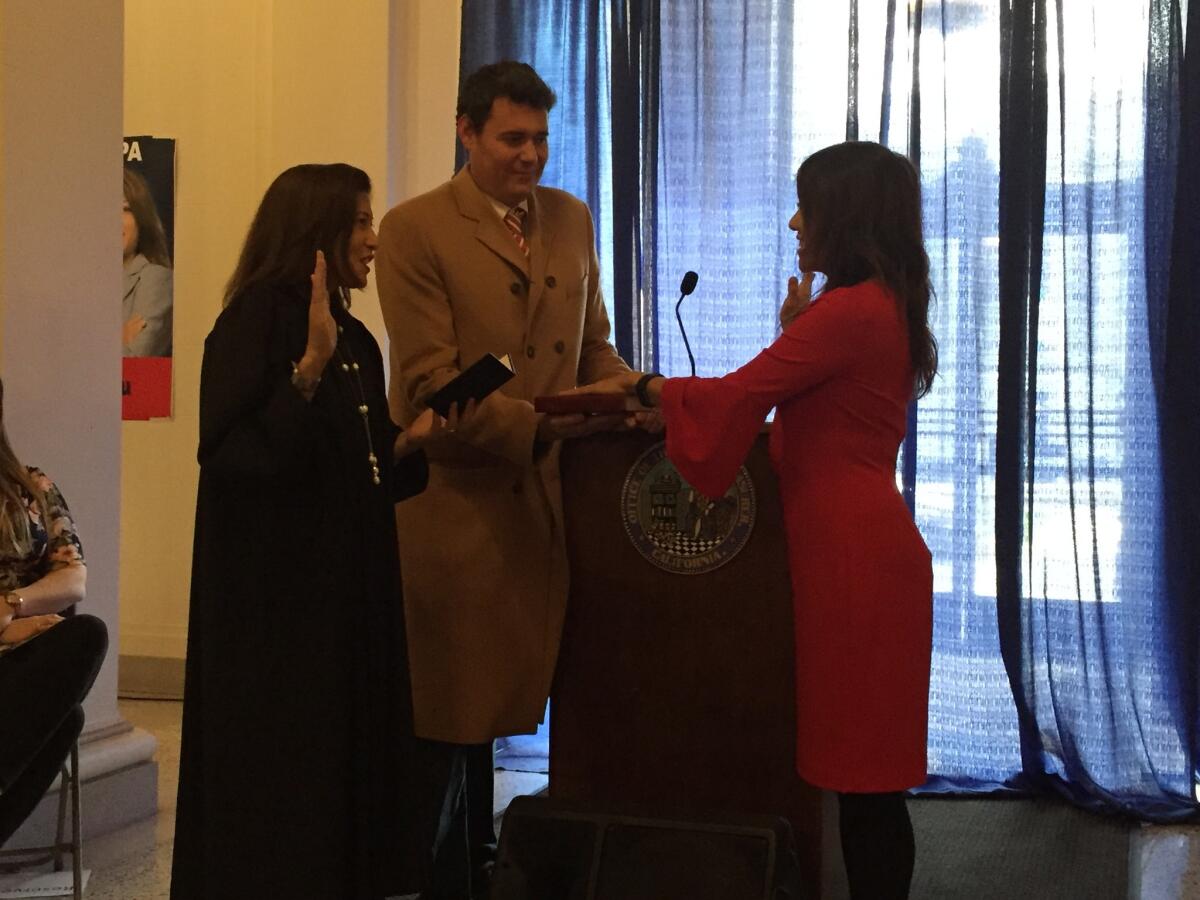
- Share via
Watch live: Gavin Newsom is sworn in as California’s 40th governor
- Share via
Expectations are high for newly sworn-in state schools chief Tony Thurmond
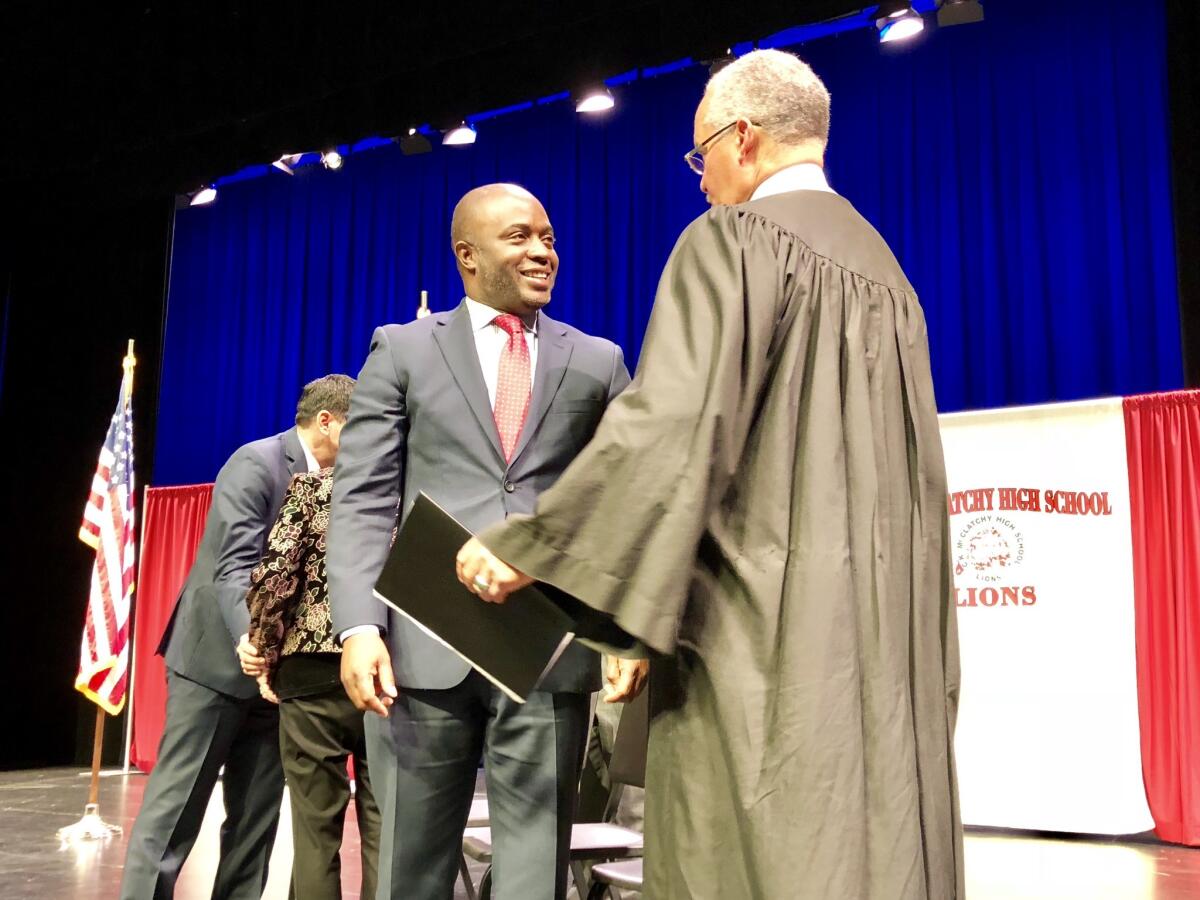
Tony Thurmond took the oath of office as California’s state superintendent of public schools on Monday, promising a labor-friendly agenda before the teachers, students and Democratic officials who filled an auditorium at McClatchy High School in Sacramento to watch him being sworn in.
“We can’t close the achievement gap without a great teacher at the head of every class,” Thurmond said Monday to applause. “We have to make sure we provide quality compensation and support to our teachers and our classified staff and all the educators who support our kids.”
Thurmond, a Bay Area Democrat who served in the state Assembly, won a hotly contested and expensive race with the help of labor leaders against charter school executive Marshall Tuck. The race took several days to sort out after Tuck held an initial lead in early returns on election night before falling behind thereafter.
Thurmond was sworn in Monday by retired Alameda County Superior Court Judge Gordon Baranco. He was joined on stage by labor rights leader Dolores Huerta and Assembly Speaker Anthony Rendon (D-Paramount).
Thurmond’s former colleagues in the state Assembly took turns praising him and promising to be an ally in improving schools. Many said they expected Thurmond would be a strong leader focused on improving student outcomes.
“We know we are going to work hard to give you the money you need and the budget you need to fully fund education and our schools so we can put our money where our mouth is and make sure our children have everything they need,” Assemblywoman Connie Leyva (D-Chino Hills) said.
As state superintendent, Thurmond will oversee the education of 6.2 million students at 10,000 schools. Thurmond was a member of the West Contra Costa County School Board and a Richmond city councilman before he was elected to the state Assembly.
“Tony is the right man at the right time to fight the federal, Donald Trump, Betsy DeVos anti-child, anti-education, anti-civil and -human rights agenda,” U.S. Rep. Barbara Lee (D-Calif.) said. “Tony is going to do that for us.”
- Share via
State Controller Betty Yee takes oath of office with call for more affordable housing and healthcare
California Controller Betty Yee took the oath of office Monday for a second term, saying she still has work to do addressing problems that include a lack of affordability in housing, healthcare and higher education.
A San Francisco native, Yee is the chief financial officer of California — the fifth-largest economy in the world — having first won election to the post in 2014 before winning reelection in November.
“No region is spared from the widening inequality and increased poverty that plague our state, fueled by the lack of affordable, stable housing, the cost of healthcare and transportation, limited educational opportunities, student loan debt, displacement caused by disasters and more,” she said.
Yee was administered the oath of office by California Supreme Court Chief Justice Tani G. Cantil-Sakauye at the Crocker Art Museum in Sacramento before an overflow crowd that included state Senate leader Toni Atkins (D-San Diego), state Atty. Gen. Xavier Becerra and San Francisco Mayor London Breed.
“As a public official it is about governance that delivers results and stays accountable while upholding the underlying value of dignity for all,” Yee said.
- Share via
California Atty. Gen. Xavier Becerra begins new term promising to fight Trump policies
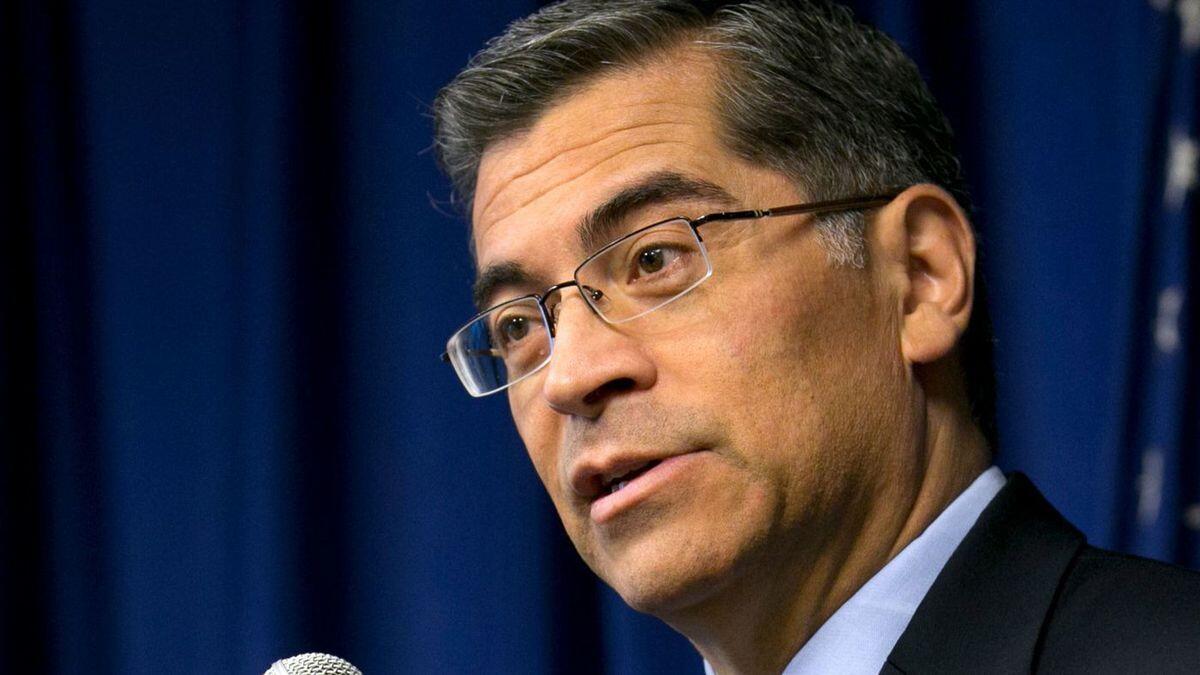
California Atty. Gen. Xavier Becerra on Monday took the oath of office for a new term, saying he would continue his role as a leading challenger to Trump administration actions that he believes are counter to the state’s interests.
Becerra, a former 12-term congressman, has become a national opposition figure to Trump, having sued the federal government 45 times since he was appointed as the state’s first Latino attorney general in 2017.
“We’ve been a little busy stopping the dysfunction and insanity in Washington, D.C., from infecting California,” Becerra told an audience during a swearing-in ceremony at the California Museum in Sacramento.
“Whether it’s the criminals on our streets or the conman in the boardrooms or highest office of the land,” Becerra said, “the California Department of Justice, well, we’ve got your back.”
Becerra won his first statewide election as the state’s top cop in November, two years after he filled the post vacated when predecessor Kamala Harris was elected to the U.S. Senate.
He has peppered the Trump administration with lawsuits challenging federal policies on healthcare, the U.S. census, the environment and immigration.
“Our state builds dreams, not walls,” he said in a direct criticism of Trump’s proposal to build a wall at the U.S.-Mexico border.
Just last week, Becerra led a coalition of 17 Democratic attorneys general in announcing an appeal of a federal judge in Texas that ruled the Affordable Care Act unconstitutional.
“The ACA has been the law for nearly a decade and is the backbone of our healthcare system,” Becerra said last week. “This case impacts nearly every American — workers covered by employers, families, women, children, young adults and seniors — so we will lead the ACA’s defense as long and far as it takes.”
- Share via
California Democratic Party Vice Chairman Daraka Larimore-Hall announces bid to lead group
Daraka Larimore-Hall, a top official at the California Democratic Party, said Monday he’s running to replace former chairman Eric Bauman, who resigned abruptly in November after being confronted with allegations of sexual misconduct.
Larimore-Hall, a longtime state party activist and former chairman of the Democratic Party of Santa Barbara County, was one of the party leaders who urged Bauman to resign following the allegations.
In an email to supporters announcing his bid, he urged “both structural and cultural change at every level of our Party.” He also repeated his call for a “top-to-bottom investigation” of the allegations, the party and its culture.
In a Times investigation, 10 party activists and staff members said Bauman made crude sexual comments and engaged in unwanted touching and physical intimidation in professional settings.
“In order to be where we need to be for 2020, we have to confront the culture of abuse and fear that allowed someone to behave in such a vile way for so long,” Larimore-Hall said in an interview. “We can’t brush it aside or think that our activists or our candidates or our donors are going to forget about this overnight.”
Larimore-Hall said his first priority would be to fully investigate the allegations and restore rank-and-file confidence in the party’s leadership.
The second would be to refocus the party on political priorities as the 2020 presidential election nears. The Bauman episode, Larimore-Hall said, threatens to derail the Democrats’ plans to help defeat President Trump and keep the seven congressional seats gained in the midterm elections.
“It’s definitely a crisis,” Larimore-Hall said. “But the component parts — the energy, the enthusiasm, the volunteers, the infrastructure — it’s still there. We just need to direct it toward something.”
Larimore-Hall was elected vice chairman of the state party in February following Bauman’s razor-thin victory over Bay Area activist Kimberly Ellis.
Ellis has announced another bid for the chairmanship and former state Senate leader Kevin de León is also mulling a run. The vote will take place at the party’s May convention in San Francisco.
- Share via
Newsom will vow to ‘seize this moment,’ and swipe at Trump in Monday inaugural address
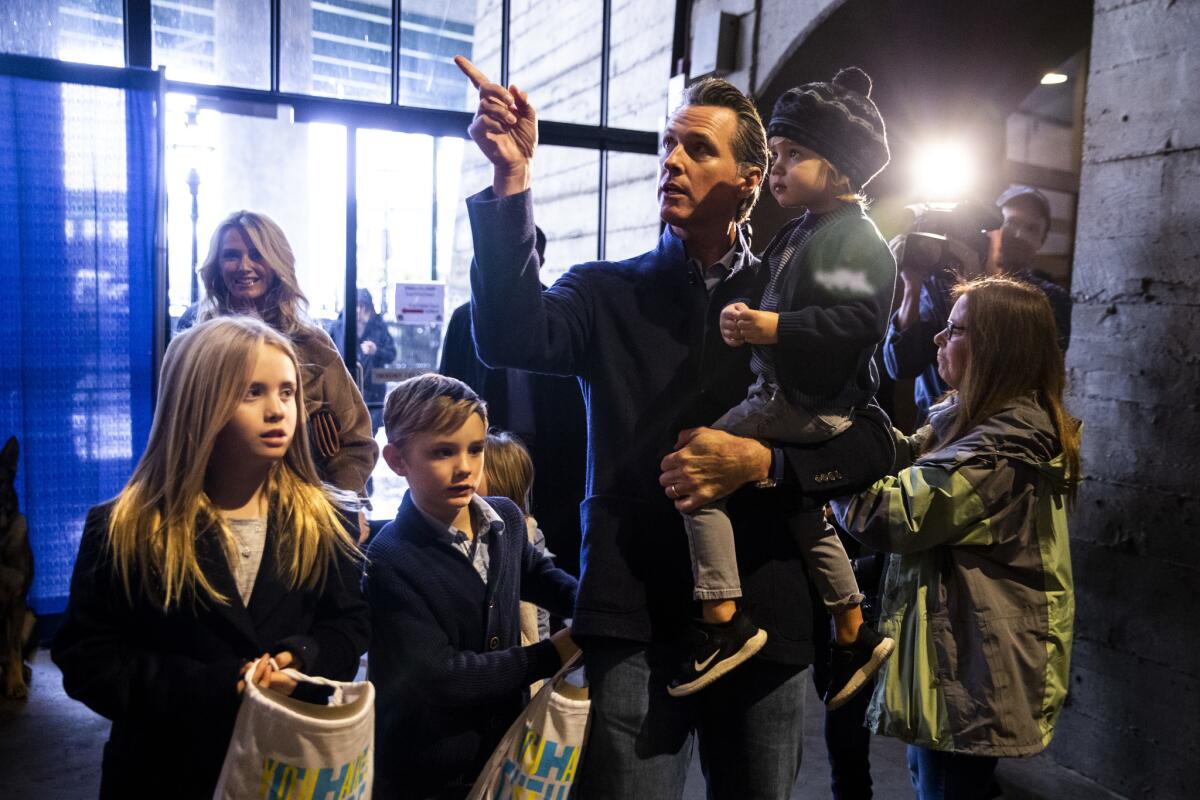
Building on the theme of California exceptionalism that defined his campaign, Gov.-elect Gavin Newsom will depict the state as a guardian of progressive values and a counterweight to President Trump in his inaugural address Monday, according to excerpts of his prepared remarks.
“What we do today is even more consequential, because of what’s happening in our country,” read the excerpts obtained by The Times. “People’s lives, freedom, security, the water we drink, the air we breathe — they all hang in the balance. The country is watching us. The world is waiting on us. The future depends on us. And we will seize this moment.”
The speech casts California’s political stakes in a decidedly national scope, promising an agenda that will unify and be an example to the rest of the country. It contrasts the governing goals of Newsom, a Democrat, with that of Trump, the incoming governor’s perennial foil.
“We will offer an alternative to the corruption and incompetence in the White House,” the excerpts say. “Our government will be progressive, principled, and always on the side of the people.”
Newsom campaigned on an ambitious and wide-ranging platform, promising sweeping solutions on housing, healthcare, education and other issues that rank among Californians’ top concerns. In the weeks after his election, he struck a more muted tone, taking pains to emphasize his fiscal caution and need for patience in achieving those goals.
The inaugural excerpts indicate a return to lofty pledges. While Newsom will vow to “prepare for uncertain times ahead” by building budgetary reserves and paying down debt, the prepared remarks quickly turn to a vow to be “bold.”
Newsom has already floated several proposals for his first budget that carry significant price tags, including a nearly $2-billion plan to boost early childhood development for low-income families and a dramatic expansion of paid family leave from six weeks to six months.
When asked for a preview of his inauguration speech during a news conference Sunday evening, Newsom predicted pundits would criticize his address as “short on specifics.”
“Well, of course, I’m at an inaugural,” Newsom said. “But I’ll be very detailed in the budget, a few days later. And then we will architect, in much more nuance and detail, in state of the state. I really see this as three opportunities … to communicate over the next few weeks our agenda, our vision for the state.”
Times staff writer Taryn Luna contributed to this report.
- Share via
Newsom-hosted benefit concert raises nearly $5 million for wildfire victims
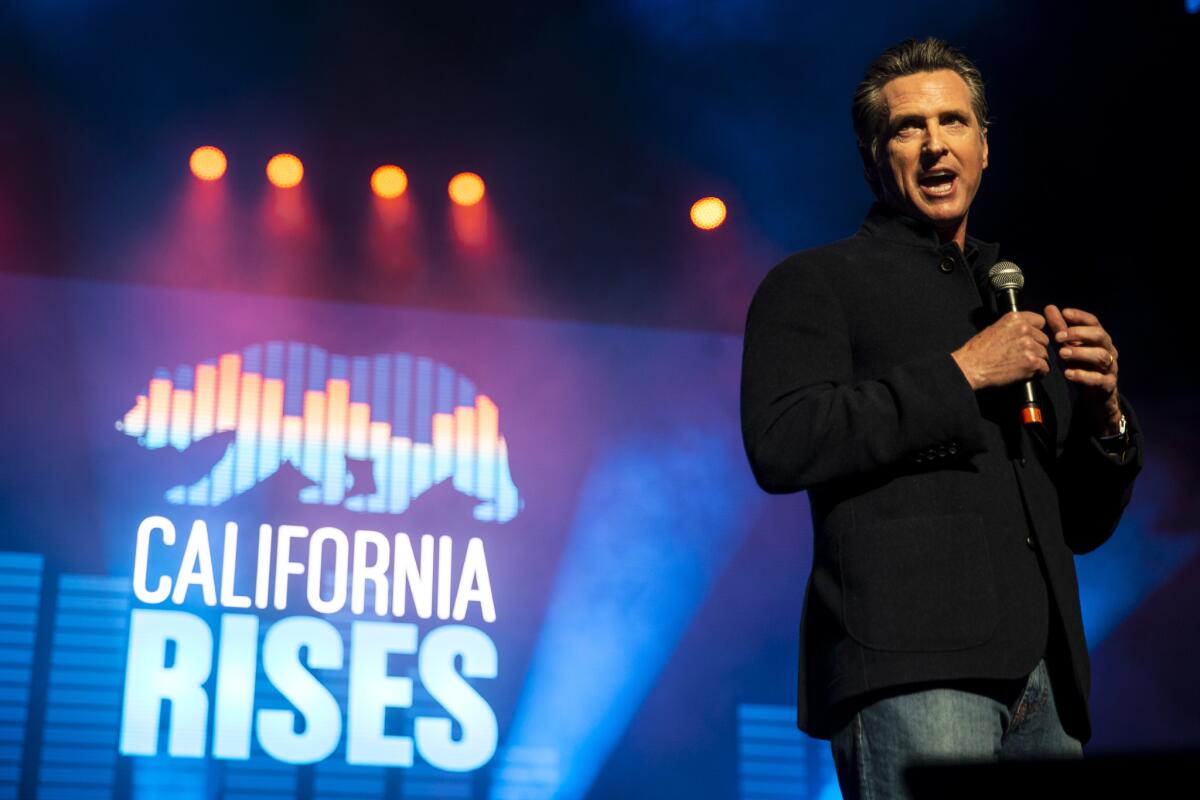
On the eve of the gubernatorial inauguration, California’s political class rubbed elbows in Sacramento for a benefit concert hosted by Gov.-elect Gavin Newsom and headlined by the rapper Pitbull.
Newsom told the crowd gathered at the Golden 1 Center on Sunday evening that the fundraiser brought in nearly $5 million for the California Wildfire Foundation, a 501(c)(3) that supports the families of fallen firefighters and communities affected by wildfires.
“You know, a lot of folks feel anxious about not just politics, but government,” Newsom said on stage before introducing the rapper and activist Common. “But those firefighters, they are the antidote to the fear and cynicism; they are the manifestation of why government matters and why you should care.”
Top sponsors, including Salesforce, Kaiser Permanente and other interest groups, paid up to $1 million each to support the cause and curry favor with the new administration. Nathan Click, a spokesman for Newsom, said organizers sold more than 7,000 tickets.
Several state lawmakers attended the concert alongside Capitol staff, lobbyists and business types, who mingled on the floor of the arena and offstage in private VIP areas.
The rock band X Ambassadors and a duo called the Cold Weather Sons from the town of Paradise, which was destroyed by fire in November, were among several performers who entertained the crowd during the four-hour event.
The “California Rises” concert is the final in a series of festivities held Sunday to celebrate the inauguration of California’s 40th governor. Earlier in the day, Newsom attended a private brunch at Sacramento’s Crocker Art Museum and his inaugural committee hosted a free party for families at the California State Railroad Museum at the Old Sacramento Waterfront.
Newsom’s inauguration is set to begin at 11 a.m. Monday on the steps of the Capitol.
- Share via
Inauguration fever hits Sacramento as Gov.-elect Gavin Newsom prepares to take office
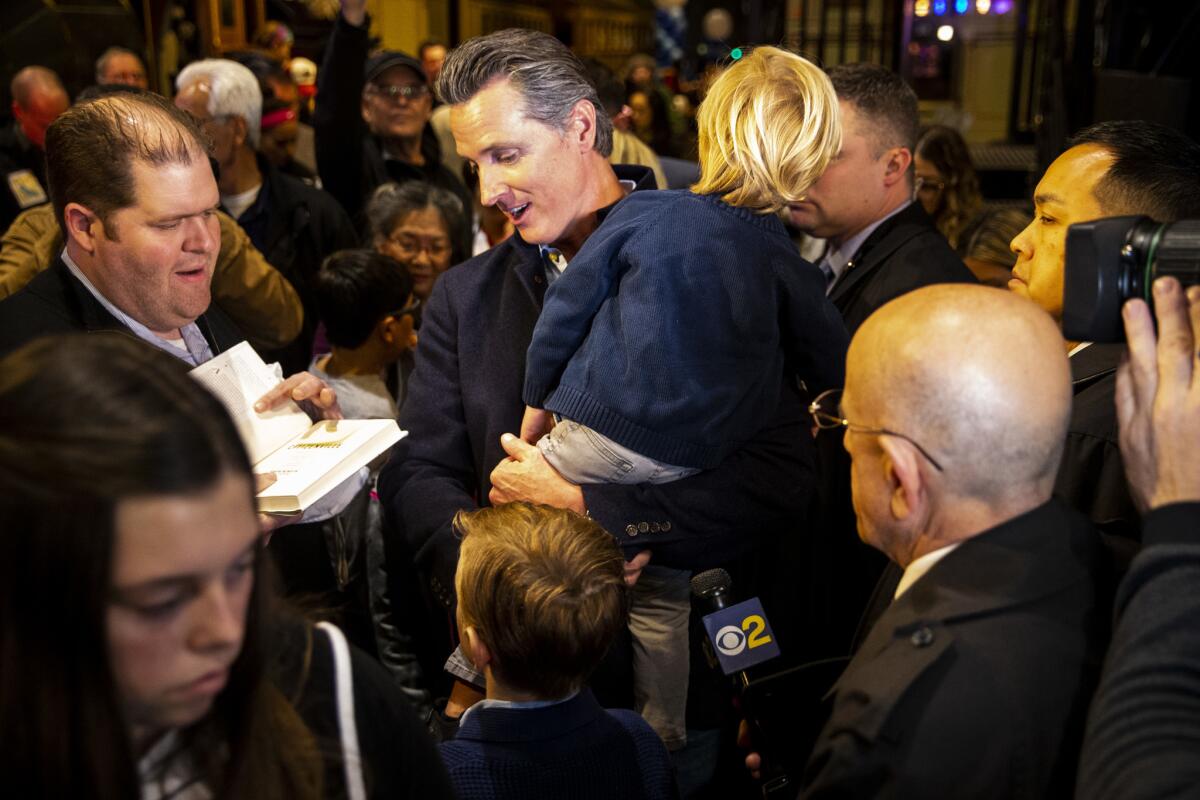
Incoming Gov. Gavin Newsom doesn’t officially take the oath of office until Monday, but the parties celebrating his inauguration were in full swing all day Sunday.
Newsom and his family were mobbed by well-wishers at the California State Railroad Museum at the Old Sacramento Waterfront in the afternoon, where his inaugural committee hosted a free party for families.
“He just has charisma. He’s able to really connect with people,” said Rosielyn Pulmano, an attorney from Elk Grove who came to see Newsom with her husband, two sons and her niece. “I think he cares about working Californians and a lot of their issues.”
Newsom arrived with his wife, documentary filmmaker Jennifer Siebel Newsom, and their four young children, and the governor-elect spent a good deal of his time wading through crowds, taking selfies with supporters and signing autographs as music boomed in the background.
As the family toured the inside of the museum’s locomotives and the bevy of exhibits, Newsom’s two-year-old son, Dutch, was wide-eyed, impressed by all the train cars and seemingly a little overwhelmed by the crowd.
Newsom said that for his son, all that was missing from the museum was Thomas the Train, popular fictional locomotive in children’s books and cartoons .
“If there’s one thing I can contribute to Sacramento maybe it’s getting a Thomas the Train exhibit for the two years olds,” Newsom joked when talking with reporters afterward.
Newsom said he wanted to include such an event in his inaugural festivities to highlight families and children, whose wellbeing will be among the top priorities of his administration.
“You’ll see that not only as a preamble to the inaugural and the budget that we’ll be submitting next week, but I think it’ll be a big part of the administration,” Newsom said.
The museum event followed a private, high-dollar brunch at Sacramento’s Crocker Art Museum. A steady rain failed to dissuade as many as 200 guests who sipped wine and dined on chicken and salmon while waiting for a photo with California’s new first couple.
Seen at the event were representatives of some of the state’s most powerful political interests, among them organized labor, healthcare companies and tribal gaming interests. A few other high-profile guests attended, too, including Larry Baer, CEO of the San Francisco Giants, and Erika Jayne, a singer and cast member of the reality TV show “The Real Housewives of Beverly Hills.”
“I’m excited to see someone like Gavin — young, vibrant — taking over the state and leading us into the future,” Jayne said after attending the brunch with her husband, attorney Tom Girardi. “He’s got a lot of great plans.”
Attendees said the event, which was closed to reporters and held under a tent in the museum’s outdoor atrium, did not include prepared remarks by Newsom. Among those seen leaving the event were representatives of AT&T, the California Medical Assn., Uber, Kaiser Permanente and the State Building and Construction Trades Council.
A fundraising invitation obtained by The Times offered bundled tickets to all of the inauguration events, including those on Sunday and the Monday ceremony, ranging in price from $25,000 to $200,000. The money will be collected by a committee specifically organized to pay for Newsom’s inaugural weekend.
Sunday’s festivities are scheduled to end with a benefit concert headlined by Pitbull at the Golden 1 Center, home of the NBA’s Sacramento Kings, to raise money for the victims of California’s recent deadly wildfires.
- Share via
As Newsom inaugural events begin, he unveils more state budget promises on education and paid family leave
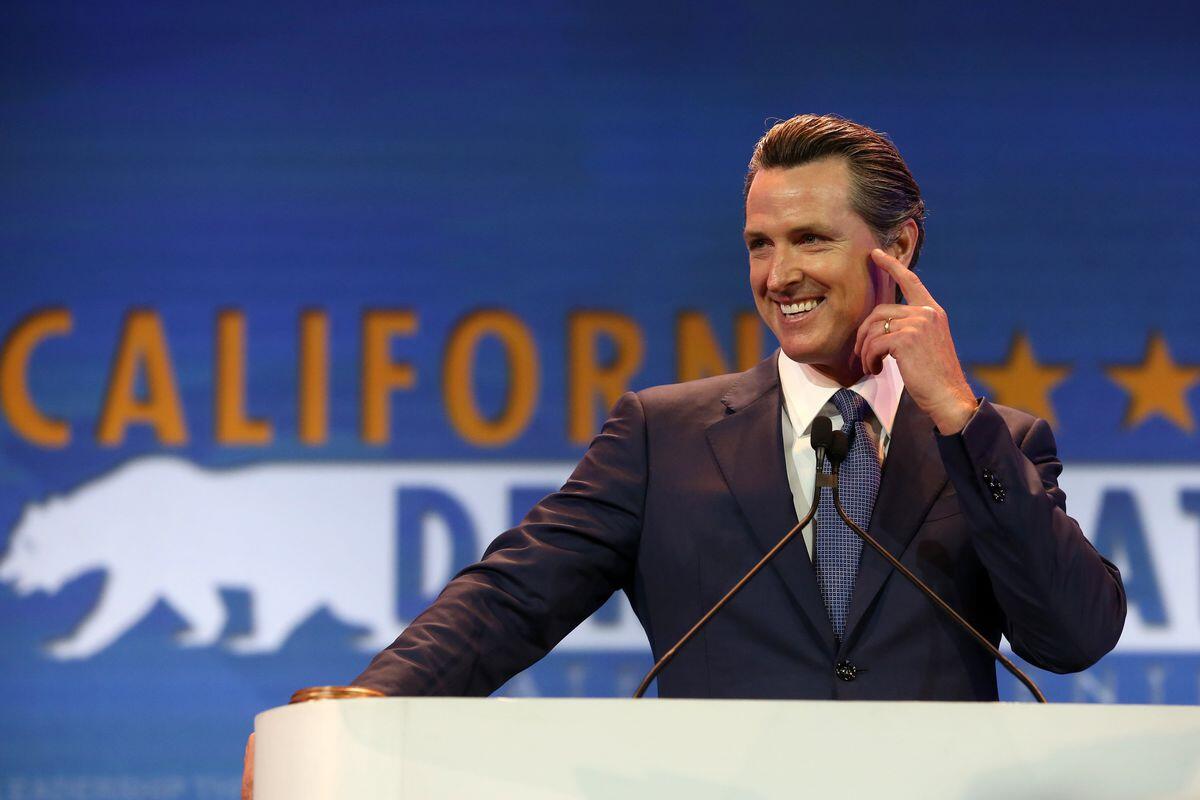
California’s incoming governor, who must send his first state budget plan to the Legislature this week, has already signaled a significant new focus on programs to help families and children from infancy to college.
Gov.-elect Gavin Newsom campaigned on a platform that included a number of child-focused efforts specifically aimed at helping lower-income families. The price tag for the initial efforts is expected to approach $2 billion — a cost paid out of an unrestricted tax revenue windfall that could be one of the largest in state history.
Newsom may also seek help for families through new subsidies paid by California employers. The governor-elect is expected to propose a dramatic expansion of paid parental leave — from six weeks to six months — according to an internal document provided by a source close to the Newsom transition team, first reported on Sunday by the New York Times.
The document doesn’t offer a full explanation for how the program will be funded, saying instead that the budget will set “a goal of ensuring that all newborns and newly adopted babies can be cared for by a parent or a close family member for the first six months.” Employers across the state are currently assessed a payroll tax that helps offer a subsidy to parents who temporarily leave their job to care for a newborn.
Newsom’s plan, according to the document, would pay for some of the new costs by shrinking the mandated cash reserve of the state fund that administers the program, allowing more of the money to be paid in benefits. The increase in paid leave would not all happen at once but instead be phased in over a multi-year period.
A task force to help implement the expanded care plan is also envisioned, according to the document. It would determine whether two parents could split the six months of paid leave and whether an extended family member could be enlisted to help care for the child of a single parent over the six-month period.
The incoming administration’s focus on young children will also include $1.8 billion in new spending on early childhood education programs, with a particular focus on training childcare workers and pushing for more California schools to offer full-day kindergarten. Those costs, according to an overview memo obtained by the Los Angeles Times, are considered to be a one-time expense while leaving the long-term costs of the effort to be determined later.
More community college students would get free tuition under a third initiative expected in the new governor’s budget plan. Newsom will propose spending $40 million to offer a second year of tuition-free college to California students, according to an outline provided by a transition official, first reported by Politico. Students are already eligible for a single year of paid tuition under a plan agreed to by Gov. Jerry Brown and lawmakers in 2017.
The incoming governor embraced the idea of free community college during the 2018 campaign as part of a broader focus on additional investments in higher education.
“Education is an economic development strategy,” Newsom said at a higher education forum last spring. “We need to significantly increase the investment from the general fund of this state on higher education. There’s no greater higher return on investment.”
Whether the proposal would be targeted to students based on a family’s financial need is unclear. Many low-income students are already eligible for fee waivers at community colleges. The new governor must submit his full state budget plan to lawmakers no later than Thursday.
- Share via
Gavin Newsom and his family decide Sacramento is the place to be

Gov.-elect Gavin Newsom and his family will give up the Marin County life and move to the Victorian-style governor’s mansion in Sacramento after he takes the oath of office Monday.
Newsom and his wife, documentary filmmaker Jennifer Siebel Newsom, had debated whether or when to relocate to the state capital since his election in November.
The couple have four young children and expressed reservations about moving in the middle of a school year.
“To best serve the people of California while also maximizing family time together, the Newsoms have therefore decided to move to Sacramento,” said Newsom’s spokesman, Nathan Click. “On Monday, they will move into the Governor’s Mansion – along with their four children, their two family dogs, and their family bunny rabbit — and reside there for the immediate future.’’
The Newsoms currently live in Marin County.
Gov. Jerry Brown and his wife, Ann Gust Brown, moved into the grand house in 2015 after it underwent $4.1 million in renovations to update electrical and plumbing systems, as well as to remove lead-based paint and install a fire sprinkler system and other security features.
The mansion was built in 1877 and has been home to 14 governors, but before Brown it had not housed a California governor for nearly half a century.
The state bought the mansion from a wealthy Sacramento hardware merchant, Albert Gallatin, in 1903 for $32,500. It was one of the few California homes at that time to have indoor plumbing.
- Share via
Newsom announces top labor, business liaisons as he prepares to take office
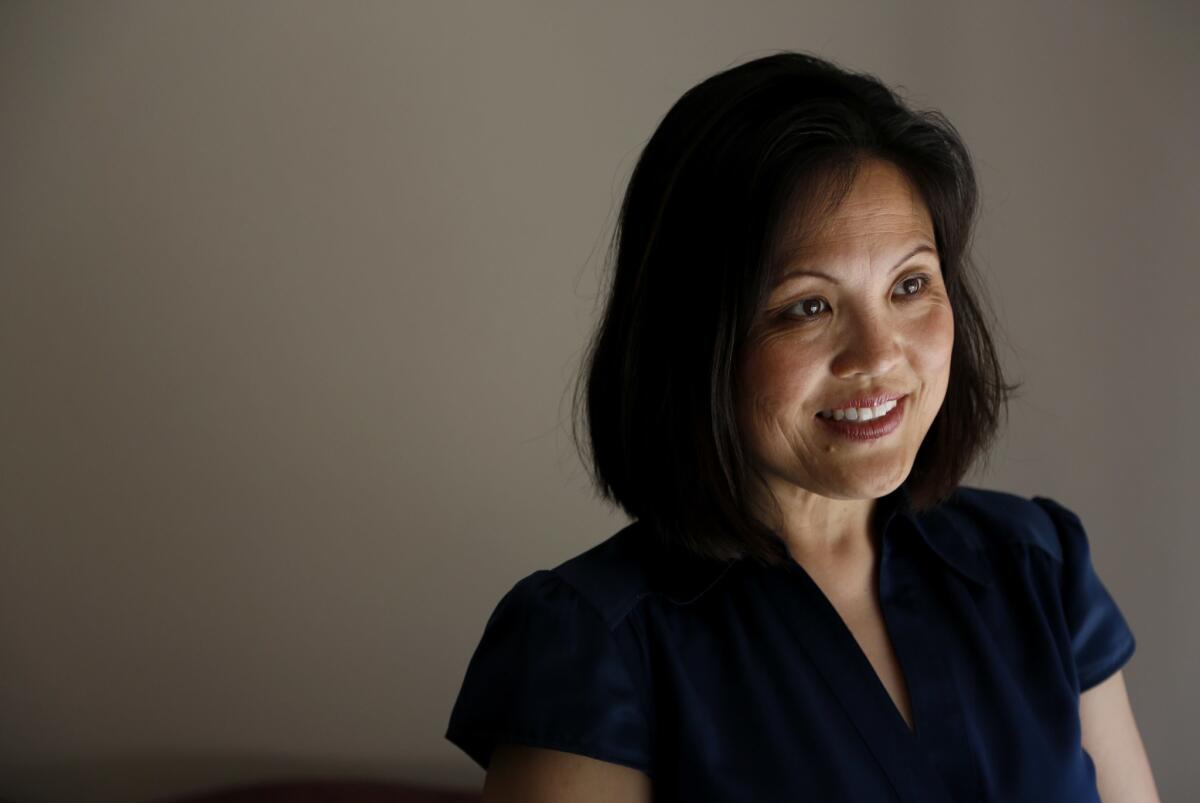
Gov.-elect Gavin Newsom on Friday named two advisors on issues related to the California economy, each recognized for their expertise on business and labor.
The incoming governor will appoint Julie Su as secretary of the California Labor and Workforce Development Agency and Lenny Mendonca as chief economic and business advisor and director of the Governor’s Office of Business and Economic Development.
Su, 49, has served as state labor commissioner under Gov. Jerry Brown since 2011 and has led an office tasked with the enforcement of California’s labor laws. She won a MacArthur Foundation “genius grant” in 2001 and previously worked as a civil rights attorney representing low-wage workers. In her new position, Su will be tasked with coordinating the work of several workforce departments in state government, including those that administer unemployment benefits and oversee the relationship between agriculture workers and employers.
Mendonca, 57, has been a longtime advocate for rethinking government operations as co-chairman of the nonprofit organization California Forward. Previously, he was partner at McKinsey & Co., a global management consulting firm. While he will be a key advisor to Newsom on the state’s economy, Mendonca will also lead the office often referred to as “Go-Biz,” designated as a high-level way to encourage job growth and economic development.
“In his new role, Mendonca will help ensure that California is rolling out the welcome mat to current and future California businesses and growing a sustainable economy for every Californian,” said a statement from the Newsom transition team.
Newsom will take the oath of office as governor Monday. He has previously selected key advisors on the state budget, legislative affairs and the executive branch’s wide array of agencies and departments.
- Share via
Joshua Groban, aide to Gov. Jerry Brown, sworn in to California Supreme Court
California Supreme Court Justice Joshua Groban, a lawyer and longtime aide to Gov. Jerry Brown, was sworn into the state’s highest court Thursday in Sacramento.
The ceremony marked Brown’s fourth appointment to the state Supreme Court and gave the seven-member bench a Democratic majority.
“We live in a highly chaotic, ever-changing and ever-confusing world,” Groban said in prepared remarks at the Stanley Mosk Library and Courts Building. “But I’m happy to report that I’m joining an institution whose fundamental purpose, at core, is to provide stability and consistency amidst this chaotic place we live. I look forward to doing that with a sense of reflection, respect, fidelity to the law and compassion.”
None of Brown’s appointees, Groban included, have judicial experience. Groban served as legal counsel to Brown’s 2010 gubernatorial campaign and joined the administration as a senior advisor to the governor, overseeing the appointments of some 600 judges over the last eight years. Prior to working with Brown, Groban, 45, practiced law for more than a decade.
In perhaps his final public appearance before his successor, Gov.-elect Gavin Newsom, takes office next week, Brown pushed back on notions that he stacked the court.
“I don’t want this to be known as a ‘Brown court,’” the governor said before administering the judicial oath of office. “First of all, the so-called ‘Brown appointments’ do not agree with themselves and nor should they. They are individuals. They will differ. It’s not anybody’s court.”
The governor called the court a “high calling” and said Groban possesses the values for the job.
“Probably, next to my wife, I’ve talked to no person as much as I’ve talked to Josh Groban,” Brown said.
“I think you’ve talked to him more,” California’s First Lady Anne Gust Brown interjected.
“I can’t tell you what the hell he’s going to do,” Brown later quipped. “I warned him, don’t screw up, at least not at first.”
- Share via
California campaign watchdog agency seeks law barring use of campaign funds to fight harassment claims
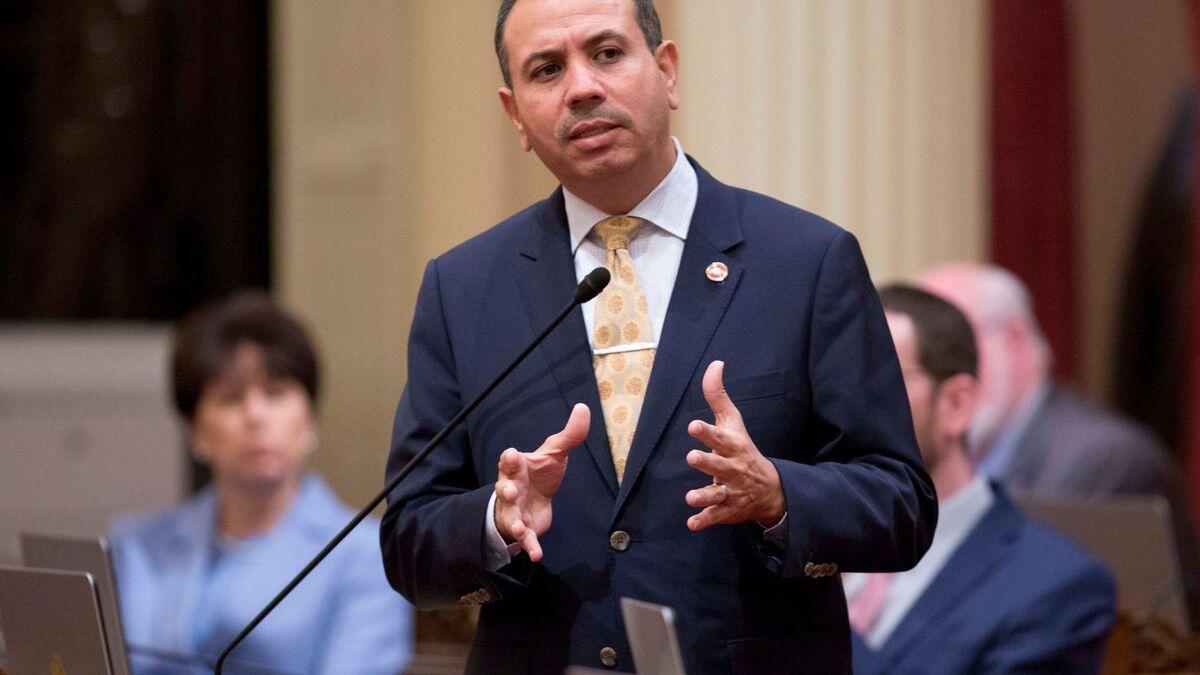
Elected officials accused of harassment or discrimination would be barred from using political contributions to cover their legal defense costs under legislation proposed by California’s campaign watchdog agency.
The state Fair Political Practices Commission has agreed to pursue a law change to clear up confusion after an attorney for one former state lawmaker argued political funds could be used in such legal defenses.
Commission Chairwoman Alice Germond said putting a prohibition into the law would “provide some much needed clarity.”
“As chair, I would like to show the public their lawmakers are held to a standard that is above reproach,” Germond said in a statement. “People don’t give money to campaigns for lawmakers to use it to defend their own bad behavior, so lawmakers shouldn’t be able to use it in that manner.”
The issue came up a year ago when an attorney for former Sen. Tony Mendoza (D-Artesia) sought a formal opinion from the FPPC after the Senate launched an investigation that later concluded Mendoza likely engaged in a pattern of harassment against female aides.
Mendoza resigned in February under threat of expulsion by the Senate.
In a Jan. 10, 2018, letter, Cassandra Ferrannini, an attorney for Mendoza, wrote to the FPPC that she believed Mendoza “should be allowed to establish a legal defense fund able to defray his legal expenses” in defending himself against the allegations.
“The use of campaign funds for attorney’s fees under these circumstances would fall squarely within the scope of legislative matters, since it involves the alleged conduct of a legislator with regard to legislative staff that he supervised,” Ferrannini wrote.
The commission staff originally issued an advice letter that said Mendoza may use campaign and legal defense funds to defend himself from claims of sexual harassment that arose directly out of his activities or status as a candidate or elected officer.
But the panel later rescinded the letter after some members questioned using campaign funds to fight sexual harassment claims. That left uncertainty about what was allowed, which Germond said could be cleared up by a new law. The FPPC is still looking for a legislator to carry the bill, a spokesman said.
- Share via
California’s landmark police transparency law takes effect after court denies police union effort to block it
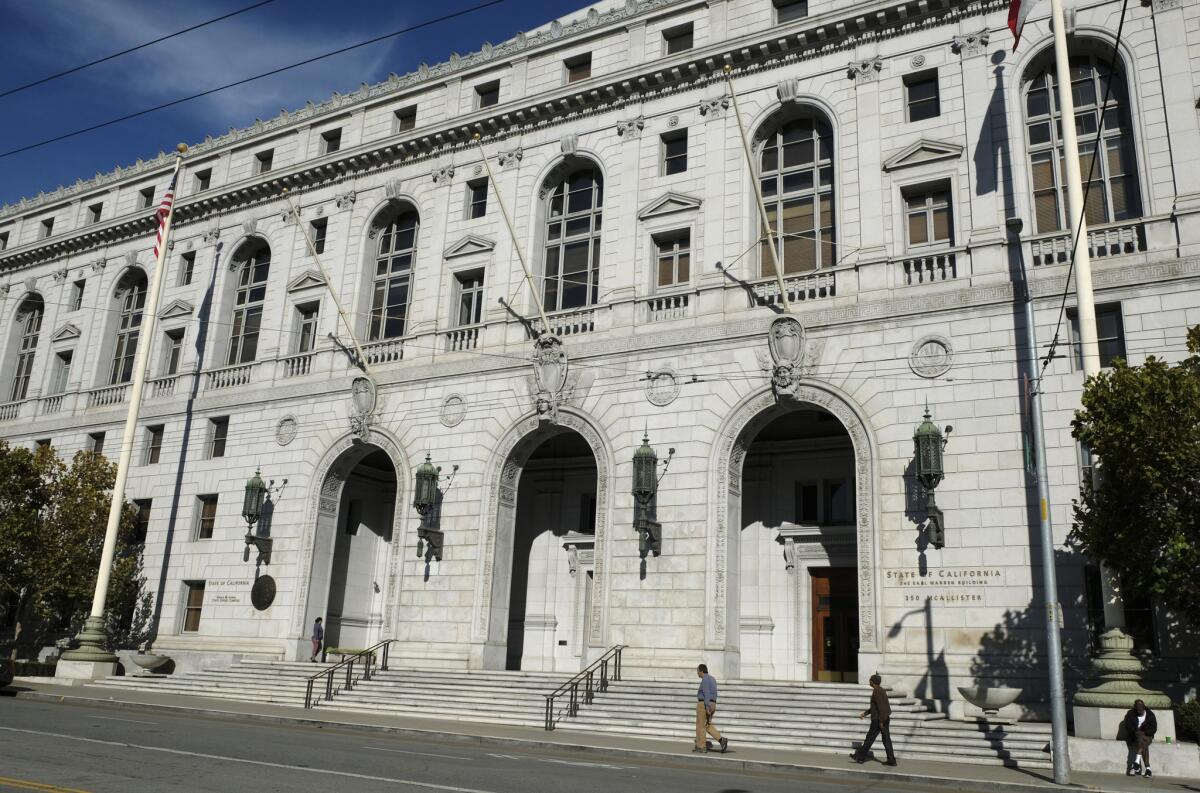
A new state law allowing the public disclosure of internal police shooting investigations has gone into effect after the California Supreme Court on Wednesday denied a bid by a police union to block it.
The law opens to the public for the first time internal investigations of officer shootings and other major uses of force, along with confirmed cases of sexual assault and lying while on duty.
The San Bernardino County Sheriff’s Employees’ Benefit Assn. challenged the law last month, asking state Supreme Court justices to decide that the law only apply to incidents that occur in 2019 or later. The court rejected that request Wednesday, allowing members of the public to seek all applicable records held by police departments. Union president Grant Ward said in a statement that his organization was disappointed with the decision and is now seeking other legal options.
“We feel this is a statewide issue and should be considered accordingly,” Ward said.
Last month, the city of Inglewood authorized the destruction of more than 100 police shooting investigations and other records in advance of Jan. 1, when the disclosure law was scheduled to take effect. California law requires police departments to keep such records for five years, and Inglewood City Council voted to destroy records older than that. Mayor James T. Butts has said the decision had nothing to do with the new law.
In Los Angeles, Police Chief Michel Moore has said that complying with the new disclosure rules could take hundreds of thousands of hours of work.
State Sen. Nancy Skinner (D-Berkeley), the author of the transparency law, has said she has no immediate plans to propose changes to it.
- Share via
Few complaints of racial profiling are sustained by police agencies in California, state panel finds
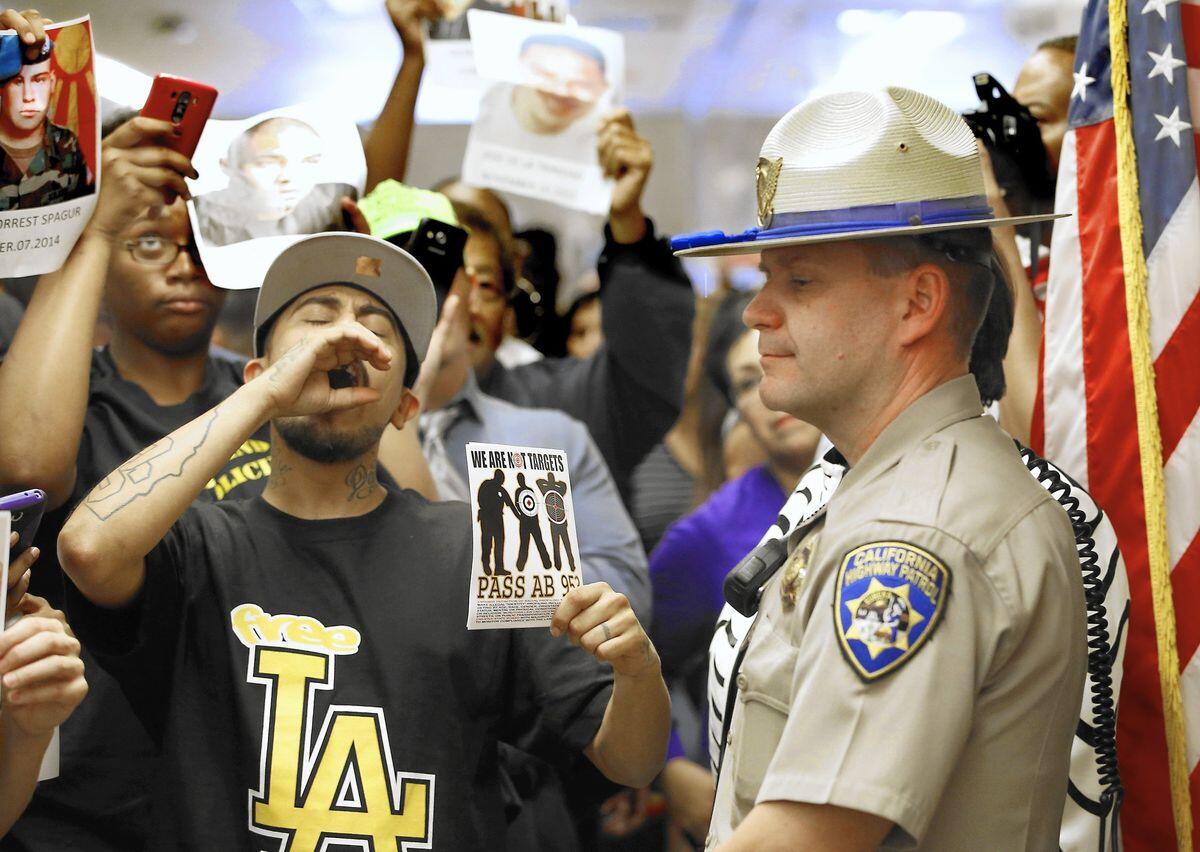
Law enforcement agencies in California sustain few citizen complaints of racial or identity profiling, according to a report Wednesday by a state panel set up to help reduce bias in policing.
The state’s Racial and Identity Profiling Advisory Board recommended in its annual report that law enforcement agencies improve training and adopt clear guidelines for tracking and reporting data on who is stopped by officers.
The panel said that 453 law enforcement agencies in the state received 9,459 civilian complaints in 2017, including 865 complaints alleging racial or identity profiling.
Of the racial and identity complaints that reached a disposition that year, 1.5% were sustained, 14.6% resulted in officers being exonerated and 83.9% of complaints were not sustained or were determined to be unfounded, the report said.
A clearer picture of the issue is expected from a 2015 law that requires police agencies to report demographic data on all detentions and searches. The first reports by the eight largest agencies, including the Los Angeles Police Department and the Los Angeles County Sheriff’s Department, are due to be submitted in April.
California Atty. Gen. Xavier Becerra, whose office oversees the board, said tracking of all detentions and searches will be helpful to understand the scope of the issue.
“The Board’s recommendations will help make our law enforcement agencies more transparent and promote critical steps to enhance, and in some cases, repair the public trust,” Becerra said in a statement Wednesday.
- Share via
California housing crisis podcast: What Minneapolis’ decision to end single-family zoning might mean for California

There’s a national movement brewing to roll back zoning rules in cities that only allow one house on a plot of land. The epicenter of that movement is Minneapolis, which passed a plan last month to eliminate single-family zoning citywide and let landowners build duplexes and triplexes on residential property.
On this episode of “Gimme Shelter: The California Housing Crisis Podcast,” we talk about the reasons why Minneapolis leaders took this action, including their desire to combat a history of racial exclusion and spur more housing density to fight climate change. We also debate how Minneapolis’ decision might affect housing politics in California.
Our guest is Minneapolis City Council President Lisa Bender, who helped shepherd the new zoning rules to passage and a former San Francisco city planner.
The episode also crowns 2018’s Avocado of the Year — the most ridiculous story exemplifying California’s housing woes — and includes our predictions for the most under-the-radar important themes in housing politics in 2019.
“Gimme Shelter,” a biweekly podcast that looks at why it’s so expensive to live in California and what the state can do about it, features Liam Dillon, who covers housing affordability issues for the Los Angeles Times’ Sacramento bureau, and Matt Levin, data and housing reporter for CALmatters.
You can subscribe to “Gimme Shelter” on iTunes, Stitcher, Soundcloud, Google Play and Overcast.
- Share via
How young immigrant ‘Dreamers’ made flipping control of the House a personal quest
Gabriela Cruz, who was brought to the U.S. illegally when she was 1, couldn’t vote, but in the final hours before the Nov. 6 election, she was making one last run to get people to the polls.
The sun was setting in Modesto when she found Ronald Silva, 41, smoking a cigarette on a tattered old couch behind a group home. He politely tried to wave her off until she reminded him he had a right that she as an immigrant without citizenship didn’t have.
“It could really make a change for us,” said Cruz, 29.
- Share via
Gov.-elect Gavin Newsom will propose almost $2 billion for early childhood programs
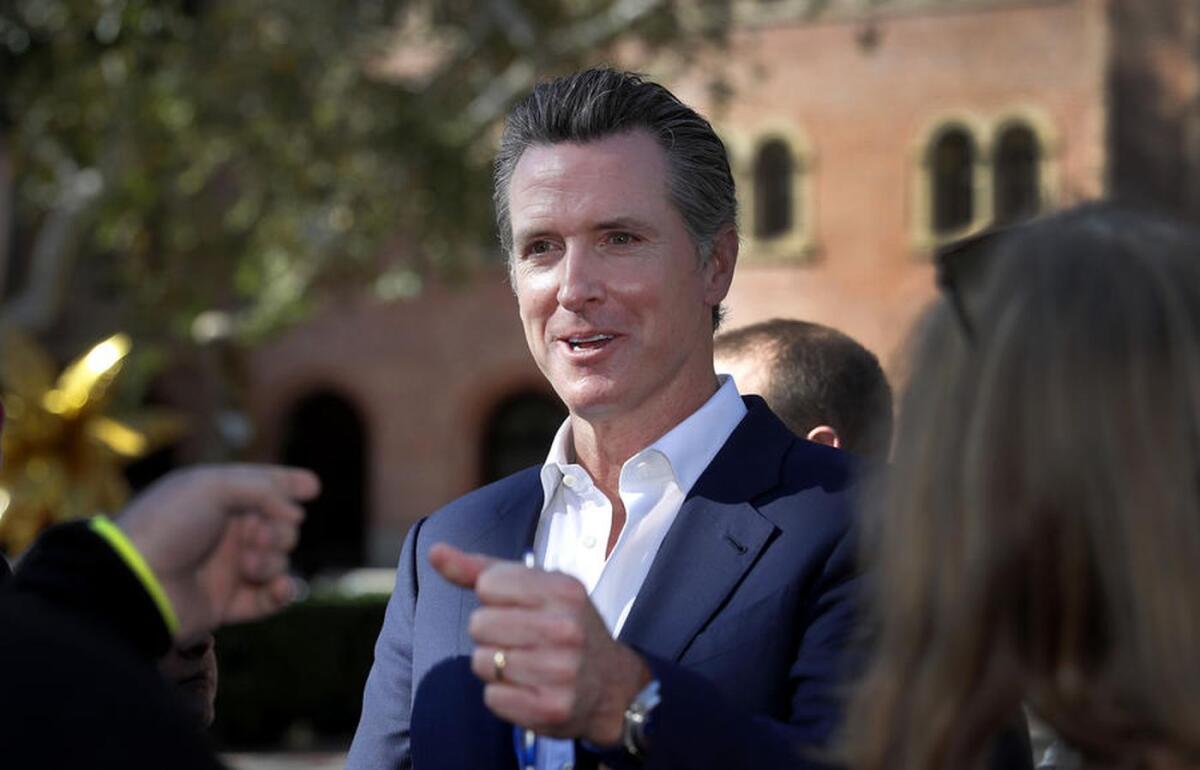
Seeking to frame his new administration as one with a firm focus on closing the gap between children from affluent and poor families, Gov.-elect Gavin Newsom will propose spending some $1.8 billion on an array of programs designed to boost California’s enrollment in early education and child-care programs.
Newsom’s plan, which he hinted at in a Fresno event last month, will be a key element in the state budget proposal he will submit to the Legislature shortly after taking office Monday, a source close to the governor-elect’s transition team said.
The spending would boost programs designed to ensure children enter kindergarten prepared to learn, closing what some researchers have called the “readiness gap” that exists based on a family’s income. It would also phase in an expansion of prekindergarten and offer money to help school districts that don’t have facilities for full-day kindergarten.
“The fact that he’s making significant investments with his opening budget is really exciting,” Ted Lempert, president of the Bay Area-based nonprofit Children Now, said Tuesday. “What’s exciting is the comprehensiveness of it, because it’s saying we’re going to focus on prenatal through age 5.”
A broad overview document reviewed by The Times on Tuesday shows that most of the outlay under the plan — $1.5 billion — would be a one-time expense in the budget year that begins July 1. Those dollars would be a single infusion of cash, an approach favored by Gov. Jerry Brown in recent years.
Most of the money would be spent on efforts to expand child-care services and kindergarten classes. By law, a governor must submit a full budget to the Legislature no later than Jan. 10. Lawmakers will spend the winter and spring reviewing the proposal and must send a final budget plan to Newsom by June 15.
Though legislative Democrats have pushed for additional early childhood funding in recent years — a key demand of the Legislative Women’s Caucus — those actions have typically come late in the budget-writing season in Sacramento.
“Quite frankly, to start out with a January proposal that includes that investment in California’s children reflects a new day,” state Sen. Holly J. Mitchell (D-Los Angeles) said.
The governor-elect will propose a $750-million boost to kindergarten funding, aimed at expanding facilities to allow full-day programs. A number of school districts offer only partial-day programs, leaving many low-income families to skip enrolling their children because kindergarten classes end in the middle of the workday. Because the money would not count toward meeting California’s three-decades-old education spending guarantee under Proposition 98, which sets a minimum annual funding level for K-12 schools and community colleges, it will not reduce planned spending on other education services.
Close behind in total cost is a budget proposal by Newsom to help train child-care workers and expand local facilities already subsidized by the state, as well as those serving parents who attend state colleges and universities. Together, those efforts could cost $747 million, according to the budget overview document.
An expansion of prekindergarten programs would be phased in over three years at a cost of $125 million in the first year. The multiyear rollout would, according to the budget overview, “ensure the system can plan for the increase in capacity.”
Lempert said the Newsom proposal is notable for trying to avoid the kinds of battles that in recent years pitted prekindergarten and expanded child care against each other for additional taxpayer dollars.
“The reality is we need to expand both simultaneously,” he said.
Another $200 million of the proposal would be earmarked for programs that provide home visits to expectant parents from limited-income families and programs that provide healthcare screenings for young children. Some of the money would come from the state’s Medi-Cal program, and other money from federal matching dollars. Funding for the home visits program was provided in the budget Brown signed last summer; the Newsom effort would build on that.
Emphasizing a policy area with broad appeal in his first state budget could reflect Newsom’s political sensibility about the challenges ahead. Democratic lawmakers and interest groups will be especially eager to see how Newsom addresses the demand for an overhaul of healthcare coverage in California — especially after a 2017 effort to create a single-payer, universal system fizzled. The path forward on healthcare is complex and costly, making early childhood education a more achievable goal in the governor-elect’s early tenure.
Newsom is likely to face considerable demands for other additional spending. In November, the Legislature’s independent analysts projected that continued strength in tax revenues could produce a cash reserve of some $29 billion over the next 18 months. Almost $15 billion of that could be in unrestricted reserves, the kind that can be spent on any number of government programs.
Kim Belshé, executive director of the child advocacy organization First 5 LA and a former state health and human services secretary, said the initial Newsom budget proposal suggests the next governor will focus on a comprehensive approach to improving outcomes for children from low-income families.
“School-ready kids deserve quality early learning, strong and well-supported families, and access to early screening services,” Belshé said. Newsom “understands the ‘whole child,’ multifaceted needs of our kids and is clearly ready to lead.”
Mitchell, the chair of the Senate budget committee, said she’s eager to see the details of the governor-elect’s proposal to determine whether it might signal the beginning of an even broader expansion of early education efforts. Similar efforts have been hindered by a lack of money and ongoing debate over which services to help children 5 and younger need state funding the most. Universal preschool, in particular, has been debated for more than a decade. California voters rejected a ballot measure to fund a full prekindergarten system in 2006.
“It’s clear there’s a new movement afoot trying to engage on investment for universal preschool,” Mitchell said. “How we invest, and how we prioritize that investment, is going to be a great conversation for the coming months.”
- Share via
California Politics Podcast: A final conversation with Gov. Jerry Brown
No Californian has served longer as governor, signed more laws, granted clemency to more felons or waged more high-profile campaigns than Gov. Jerry Brown.
Brown will leave behind a unique legacy when he packs his last belongings for the trip from the governor’s mansion in Sacramento to his Northern California ranch. His final two terms in office could be his most consequential.
The governor reviewed some of the more notable moments from the past eight years in a far-reaching interview with The Times on Dec. 22. This week’s podcast episode includes extended portions of that conversation.
- Share via
After turning back efforts to ban tackling in youth football, the sport’s enthusiasts try something new

California youth football supporters who defended their sport against a proposal this year that would have barred tackling have taken a new approach: going on the offensive.
Under a bill supported by a coalition of youth football groups, California, beginning in 2021, would limit children to two 60-minute practices of full contact, while barring tackling in the sport’s offseason.
The proposal introduced this month by Assemblyman Jim Cooper (D-Elk Grove) models the limitations on restrictions already in place for high school football in California, which caps full-contact practices to 90 minutes twice a week.
The restrictions come amid growing concern from medical professionals who say repetitive collisions from hitting and blocking can cause long-term brain damage.
“We want to improve the safety standards for youth tackle football across the state,” said Joe Rafter, president of Southern Marin Youth Football in the San Francisco Bay Area, who is working with Cooper’s office on the bill. “It’s the right thing to do.”
But Rafter said their efforts would also block any new attempts by lawmakers to bar youth tackle football. A bill to set a minimum age of 12 to play organized tackle football died in April, but the authors of the legislation, AB 2108, promised to try again in 2019.
Assembly members Kevin McCarty (D-Sacramento) and Lorena Gonzalez (D-San Diego) cited research showing youths who began playing tackle football before age 12 developed cognitive, behavioral and mood problems earlier than those who began full-contact sports later.
McCarty’s office said he plans to introduce another bill banning tackling in youth football.
“I played organized football as a child and I love the sport to this day,” McCarty said after the bill was pulled from the Arts, Entertainment, Sports, Tourism and Internet Media Committee in April when it became apparent it did not have the votes to pass. “But love for football doesn’t mean that we should ignore science.”
Cooper said he wants to ensure that kids can still play tackle football, but in a safer environment. Banning tackling outright goes too far, he said.
“Americans love football and kids love playing football,” Cooper said. “However, we must ensure our children are safe while participating in contact sports.”
- Share via
Gavin Newsom announces lineup for concert to benefit California wildfire victims
- Share via
A sagging economy could doom a 2020 ballot measure to raise commercial property taxes, Gov. Jerry Brown says
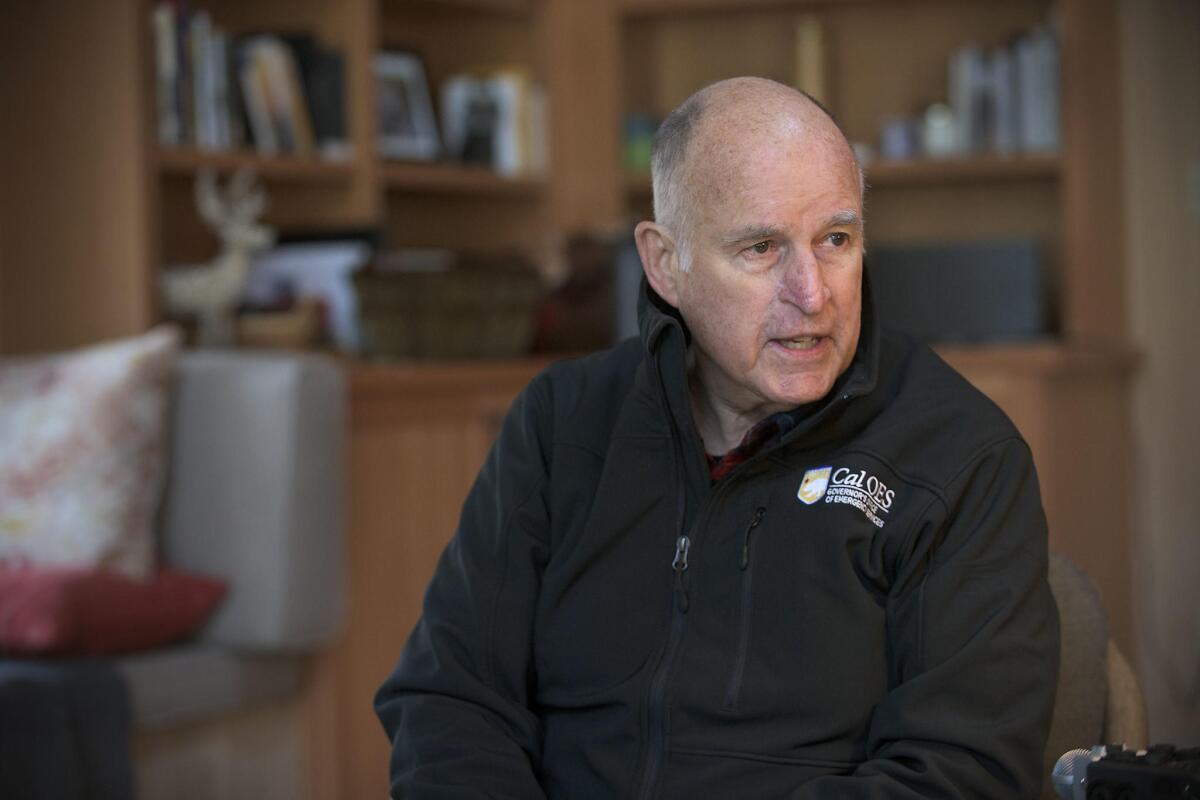
An effort to remove commercial property in California from the tax limits imposed by the landmark Proposition 13 could be felled by an economic slowdown, Gov. Jerry Brown said.
In a Saturday interview with The Times at his Northern California ranch, Brown said liberal activist groups that have successfully placed the proposal on the November 2020 statewide ballot shouldn’t read too much into early poll numbers showing support for the plan.
“That isn’t as easy as you think,” Brown said. “Because you’re going to be in a downturn of the business cycle. And you’re talking many kinds of business. And the cost of doing business in California is already high.”
The ballot measure would allow counties to more frequently assess the market value of commercial property in California than allowed under Proposition 13, a 1978 ballot initiative that amended the state constitution to place strict limits on assessing property values and taxation for both homeowners and businesses. An analysis of the new measure, which qualified in October for the 2020 ballot, estimates it could bring in some $10.5 billion a year in new tax revenue.
“The business community will fight it,” Brown said. “And the minimum wage, the family leave, the environmental rules … business[es] have left California, that’s going to be the big argument. And I think that’s something you really have to think a lot about.”
The governor, who leaves office early next month due to term limits, declined to either endorse or oppose the ballot measure. He said California’s economic health in two years’ time could be a key factor in how voters weigh the proposal.
“We’ll be in a recession by then,” Brown said. “So it’s anybody’s guess.”
- Share via
Inglewood to destroy more than 100 police shooting records that could otherwise become public under new California law
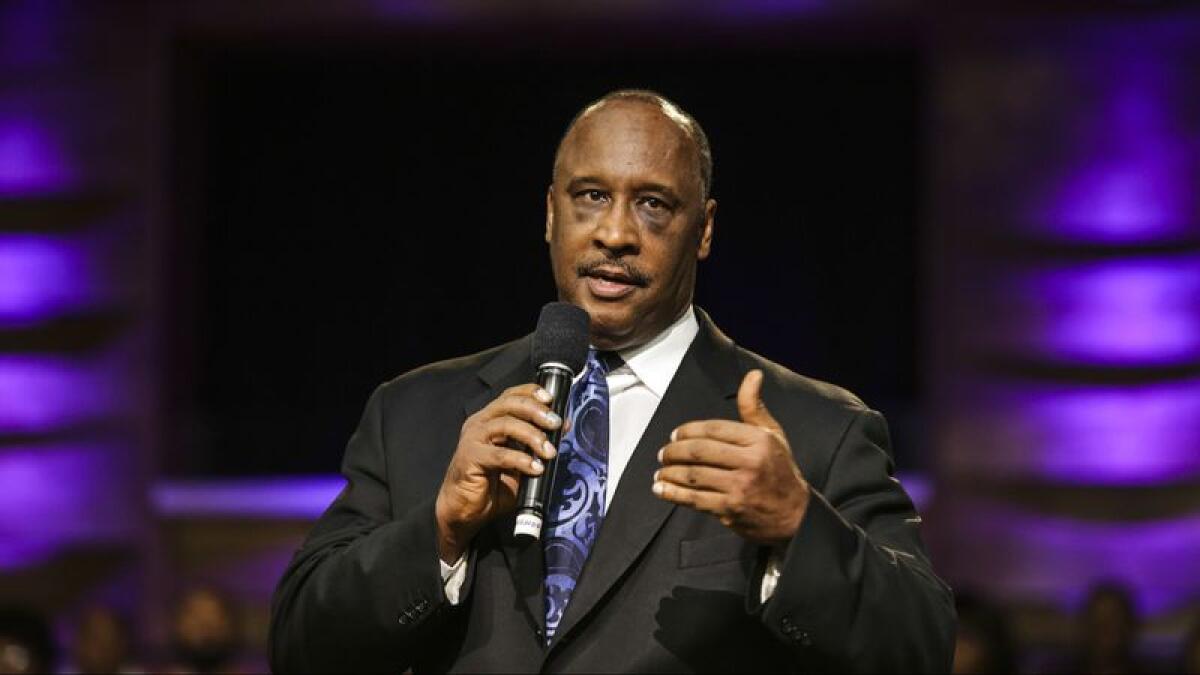
The city of Inglewood has authorized the shredding of more than 100 police shooting and other internal investigation records weeks before a new state law could allow the public to access them for the first time.
The decision, made at a City Council meeting earlier this month, has troubled civil liberties advocates who were behind the state legislation, Senate Bill 1421, which takes effect Jan. 1. The law opens to the public internal investigations of officer shootings and other major uses of force, along with confirmed cases of sexual assault and lying while on duty.
“The legislature passed SB 1421 because communities demanded an end to the secrecy cloaking police misconduct and use of force,” Marcus Benigno, a spokesman for the American Civil Liberties Union of Southern California, said in a statement. “Inglewood PD’s decision to purge records undermines police accountability and transparency against the will of Californians.”
California law says police departments must retain records of officer shootings and internal misconduct investigations for five years. The city of Inglewood, however, had kept records longer than that, including case files of police shootings dating to 1991. State Sen. Nancy Skinner (D-Berkeley), the author of SB 1421, intended for her bill to allow public access to all qualifying records held by a department, no matter the date of the incident.
Inglewood City Council approved the destruction of records that have been in the police department’s possession — more than 100 cases — longer than required by law. The city staff report and council resolution describing the action makes no mention of the new police transparency law. Instead it says the affected records are “obsolete, occupy valuable space, and are of no further use to the police department.” It added the traditional method of destroying such records is to shred them.
It is unclear whether the records have since been destroyed.
A spokesman for the Inglewood Police Department along with Inglewood’s city manager, attorney, clerk, four council members and Mayor James T. Butts, a former Santa Monica police chief, did not respond to requests for comment. Inglewood’s City Hall is closed the last two weeks of December.
The Inglewood Police Department has a reputation for secrecy and using excessive force. In 2008, the department’s officers fatally shot four men in as many months, three of whom turned out to be unarmed. The U.S. Department of Justice launched a civil rights probe and found significant flaws in the way the department oversaw use-of-force cases and investigated complaints against officers.
Civil rights advocates still question why Inglewood police opened fire on a couple found sleeping in a car in 2016, killing them both.
California police have a long history of shredding records to avoid scrutiny of their actions. In the 1970s, the LAPD famously destroyed more than four tons of personnel records after defense attorneys began requesting them as part of criminal cases against their clients. The move resulted in the dismissal of more than a hundred criminal complaints.
In response, the Legislature demanded that records be preserved but then took other measures, supported by police unions, to ensure the public had very little access to them, making California the most secretive state in the nation when it comes to police misconduct.
Skinner’s legislation begins to unwind those laws, which have been on the books since 1978.
No video or audio of the Dec. 11 council action is available on the city’s website and neither are meeting minutes or any record of the decision. A city spokeswoman, Courtney Torres, confirmed that the council had voted in favor of the police records purge, and said all the relevant reasons for the decision were included in the city staff report.
The Jan. 1 implementation for SB 1421 has prompted other police officials to act. A police union in San Bernardino is asking the state Supreme Court to determine that Skinner’s bill only applies to incidents that occur in 2019 or later. Los Angeles Police Department Chief Michel Moore sent a letter to Skinner earlier this month warning that complying with the law in regard to older records in the department’s possession could take hundreds of thousands of work hours.
- Share via
Federal officials question California DMV’s process for issuing Real IDs
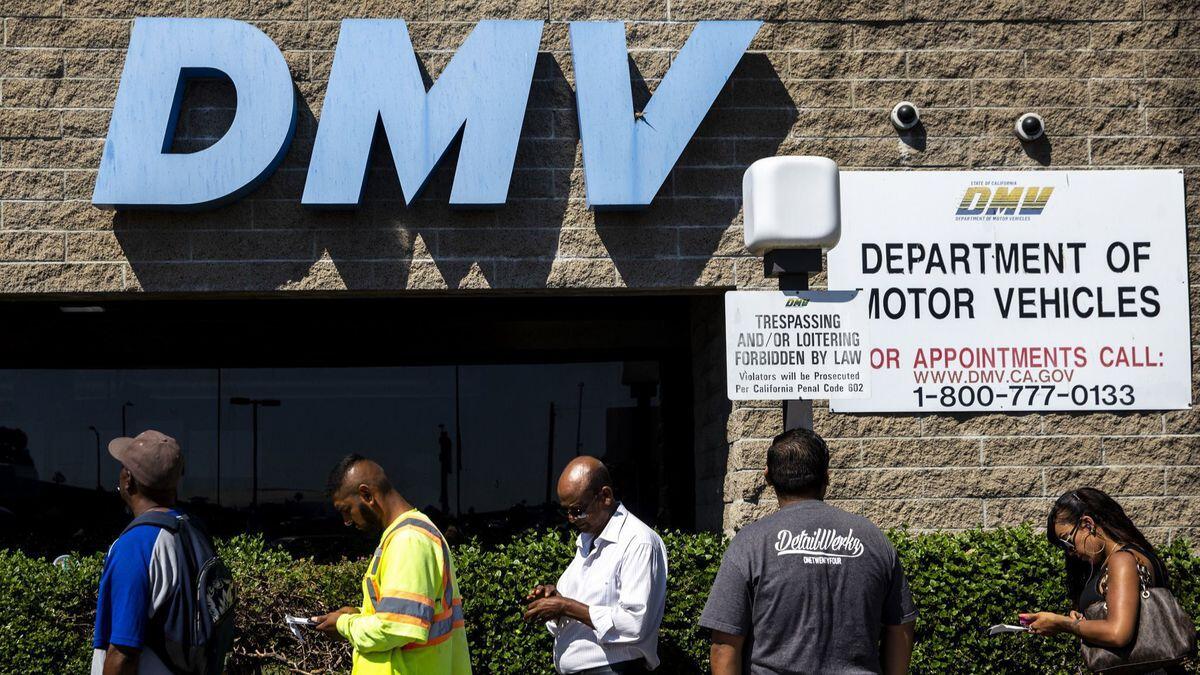
The U.S. Department of Homeland Security has notified the California Department of Motor Vehicles that its process for providing residents with federally recognized identification cards is not adequate.
DMV spokesman Armando Botello said Friday that 2.3 million residents who received Real IDs under the current process will have to submit additional documentation when their cards are renewed in five years but will be able to use them in the meantime.
The DMV is developing a way for residents to submit more documentation online or via email to comply with the stricter federal requirement, he said.
But some state legislators are upset about delays in notifying them of the problem and say Homeland Security could eventually require additional documentation provided by current holders.
“The DMV has known for a month that millions of Real IDs they’ve been dolling out are potentially invalid,” Assemblyman Jim Patterson (R-Fresno) said. “The DMV’s only hope is that the Department of Homeland Security takes pity on California and gives the DMV more time to fix this mess.”
Real IDs are a new kind of driver license and identification card that federal law will require legal residents to present when boarding domestic flights or visiting military bases and other federal facilities starting Oct. 1, 2020.
The DMV has only been requiring one form of documentation, including a current lease or utility bill, to verify the residence of a card applicant.
But the federal government said in a Nov. 21 letter to the agency that two such documents are needed.
On Friday, DMV Director Jean Shiomoto released a letter defending the current process but said her agency will start requiring a second document to prove residency in April.
“In order to minimize confusion among our customers, the CADMV will work to inform individuals who have been issued a Real ID under the current process that their card will be accepted for official federal purposes, even if their renewal occurs after the October 1, 2020, final enforcement date for Real ID,” Shiomoto wrote to the federal agency.
Legislative officials worry there is still a possibility that those issued Real IDs in the past might be required to present a second document to have their cards designated as compliant.
The more complex process for obtaining Real IDs has led to hours-long waits for customers at DMV field offices this year, although wait times have been reduced recently by an increase in staffing.
Shiomoto last month announced that she is retiring amid problems with the “motor voter” registration system and after the governor ordered an audit of her agency in response to the long wait times.
On Friday, Assembly Republican Leader Marie Waldron of Escondido blasted the DMV for waiting a month to tell legislators of the problem.
“This is unacceptable and flies in the face of security for our citizens, which is what Real ID was created for in the first place,” she said in a statement.
- Share via
Gov.-elect Gavin Newsom taps Keely Bosler to be his finance director
Gov.-elect Gavin Newsom on Friday appointed Keely Martin Bosler as director of the California Department of Finance, continuing the role she has served under Gov. Jerry Brown since August.
Bosler will become Newsom’s chief fiscal advisor, and will play a pivotal role in shaping Newsom’s spending plan for the state that will lay the foundation for his top policy priorities. Newsom must roll out his first budget plan within days of taking office on Jan. 7.
“California’s brighter future depends on a strong, stable fiscal foundation,” Newsom said in a statement released Friday afternoon. “Keely is an accomplished public servant of sound fiscal judgment. She understands that state budgets are more than numbers on a page – they are value statements affecting the fate and future of millions of families reaching for the California Dream. We are fortunate to have her on our team.”
Prior to being appointed finance director, Bosler served as Brown’s cabinet secretary for two years and, before that, as the chief deputy director for budget in the Finance Department for three years.
Earlier this year, Brown picked Bosler to lead an audit of the Department of Motor Vehicles, which had come under fire for long wait times at DMV field offices and numerous computer problems, including errors in the new “motor voter” program that registered Californians to vote.
“As we have discussed, long wait times at the Department of Motor Vehicles do not reflect the high standards of service that Californians expect from their state government,” Bosler wrote in a letter in September to DMV Director Jean Shiomoto.
The audit is still ongoing, but Shiomoto has since announced she will retire at the end of the year.
- Share via
California’s legislative analyst, after decades of nonpartisan research for lawmakers, calls it a career
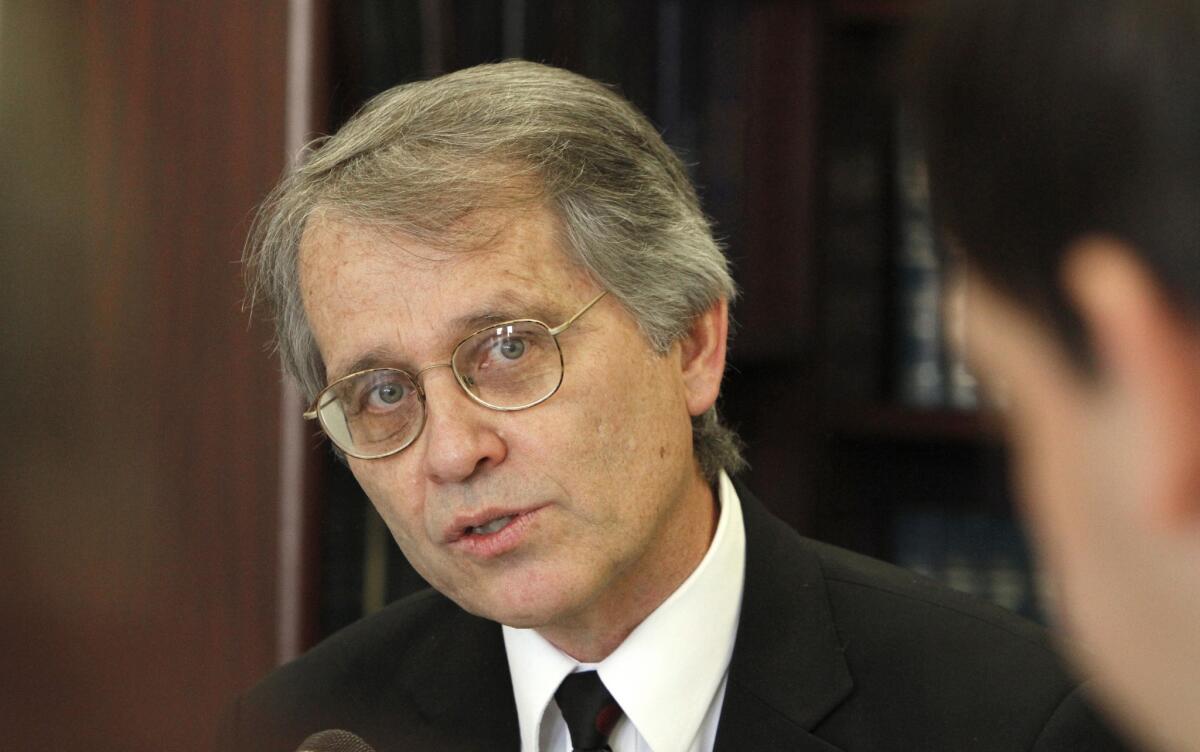
Only five people have led the independent research office of the California Legislature since its creation in 1941. And each of them has had a pretty simple mantra to live by in reviewing public policy proposals and government programs: Call it like you see it.
“The job of any analyst, to me, is you maintain that nonpartisanship,” Legislative Analyst Mac Taylor said.
Taylor, 65, will retire from the post at the end of December after a four-decade career with the research team that began, as he likes to tell it, just after the passage of the landmark property tax rollback, Proposition 13, in 1978. He became the leader of the office, with the title of legislative analyst, in October 2008.
Two months later, state government found itself in arguably the worst fiscal crisis in its history — a projected shortfall that ultimately grew to $42 billion by the following winter.
“There were forces beyond our control,” Taylor said of that time. “But don’t underestimate the policy changes that were made afterward.”
Those changes, most notably a boost in taxes paid by high-income earners and a robust state budget cash reserve fund, have helped lead to successive years of fully funded government services. The state is projected to have some $24 billion in reserves by the end of the current fiscal year.
Taylor announced his intention earlier to step down this year. Leaders from both houses of the Legislature select the analyst, who leads a staff of almost five dozen researchers. The office provides in-depth reports on pending legislation, as well as on broader policy topics like education and healthcare, and produces an independent analysis for every proposed ballot measure.
A succession of lawmakers and governors alike have praised or panned the work of the Legislative Analyst’s Office based on their own political worldview. Taylor said his staff is mindful that they work for legislators, but try to ignore the rhetoric that follows the release of a major report.
“People are going to do what they’re going to do with our information,” he said. “They don’t always like it, but they appreciate that we give them our best advice.”
Taylor oversaw a transformation in the way the Legislative Analyst’s Office distributes its information, embracing the release of research reports through social media instead of relying on traditional printed copies and journalist roundtable events. But he said the work of the researchers has remained largely unchanged through the decades.
“Having an independent take on things, I think, is good for the Legislature,” he said.
No replacement for Taylor has been announced, which means a short transition for his eventual successor before Gov.-elect Gavin Newsom sends his first budget proposal to lawmakers in early January. Taylor, who lives in the Sacramento suburbs, said he will honor the tradition of his predecessors in stepping away from public policy debates in order to give the new analyst space to lead the team as he or she sees fit. He said he hopes to travel in the coming years and spend time with his children who have moved to the East Coast.
“Forty years in state government,” Taylor said in why he was stepping aside now. “Isn’t that enough?”
- Share via
Gov. Jerry Brown sues to save California sentencing laws
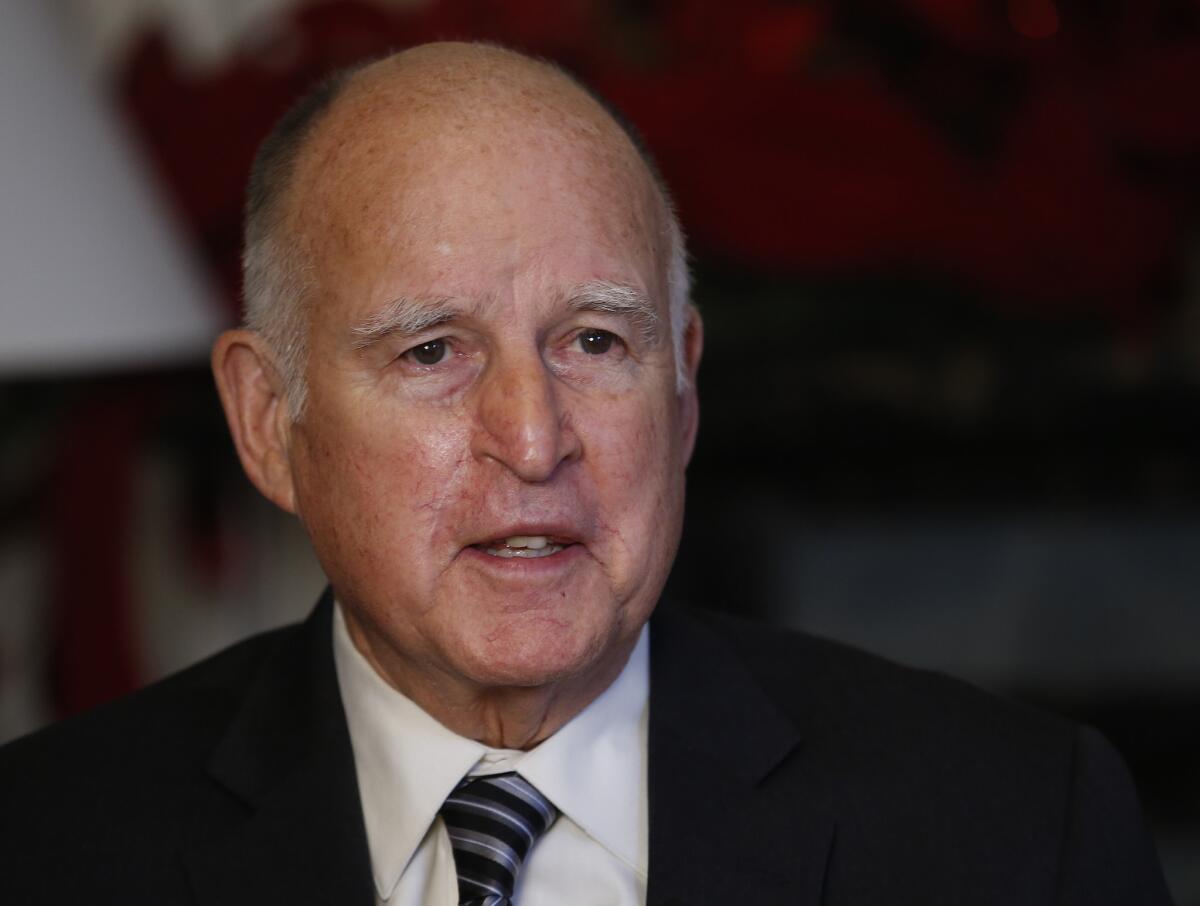
Outgoing Gov. Jerry Brown sued Thursday to protect one of his signature actions in office, a voter-approved measure that allows most prison inmates to seek earlier release and participate in rehabilitation programs.
His administration filed a lawsuit challenging a pending 2020 initiative that seeks to toughen criminal penalties as part of an effort to roll back reforms adopted by voters within the last decade.
Brown’s lawsuit in Sacramento County Superior Court contends the measure lacked enough valid signatures to overturn a previously approved constitutional amendment.
County officials and California Secretary of State Alex Padilla certified the signatures in July but said they were submitted too late to qualify for last month’s election. The lawsuit names Padilla and the ballot measure’s official proponent, Nina Salarno Besselman, president of the advocacy group Crime Victims United.
Padilla said the measure exceeded the required roughly 366,000 valid signatures, equal to 5% of votes cast for governor in 2014. Brown’s lawsuit says he used the wrong threshold. It says changing the state Constitution requires 8%, or more than 585,400 signatures.
That makes the pending initiative more than 150,000 signatures short, the lawsuit says.
“He’s wrong,” said Jeff Flint, a spokesman for the campaign backing the measure. He predicted a judge will be reluctant to reject a measure that already has qualified for the ballot.
“The secretary of state told us how many signatures are required, and that’s how many we collected,” Flint said.
Padilla’s office did not immediately respond to requests for comment.
The measure would reverse reforms adopted by voters through Proposition 47 in 2014 and Proposition 57 in 2016.
Proposition 57 allows most inmates to seek earlier paroles, and Proposition 47 reduced some drug and property crimes from felonies to misdemeanors. The combination has helped keep California’s inmate population below a population cap set by federal judges.
Corrections department spokeswoman Vicky Waters said the measure gives corrections and parole officials broad discretion “to protect our communities and fashion a rational system of rehabilitation and punishment. This new initiative unlawfully seeks to supplant the department’s constitutional authority to implement these critical reforms to our criminal justice system.”
The pending initiative would shorten the list of crimes that qualify for earlier parole and change some theft crimes from misdemeanors back to felonies. It would also increase the number of crimes for which DNA is collected, a list that was limited when some crimes went from felonies to misdemeanors.
Those supporting the tougher penalties say easing criminal penalties has increased the number of dangerous criminals on the streets, but those backing the changes say they have helped reduce mass incarceration and rehabilitate convicted criminals.
- Share via
California Supreme Court orders records unsealed in pardon of ex-state Sen. Roderick Wright
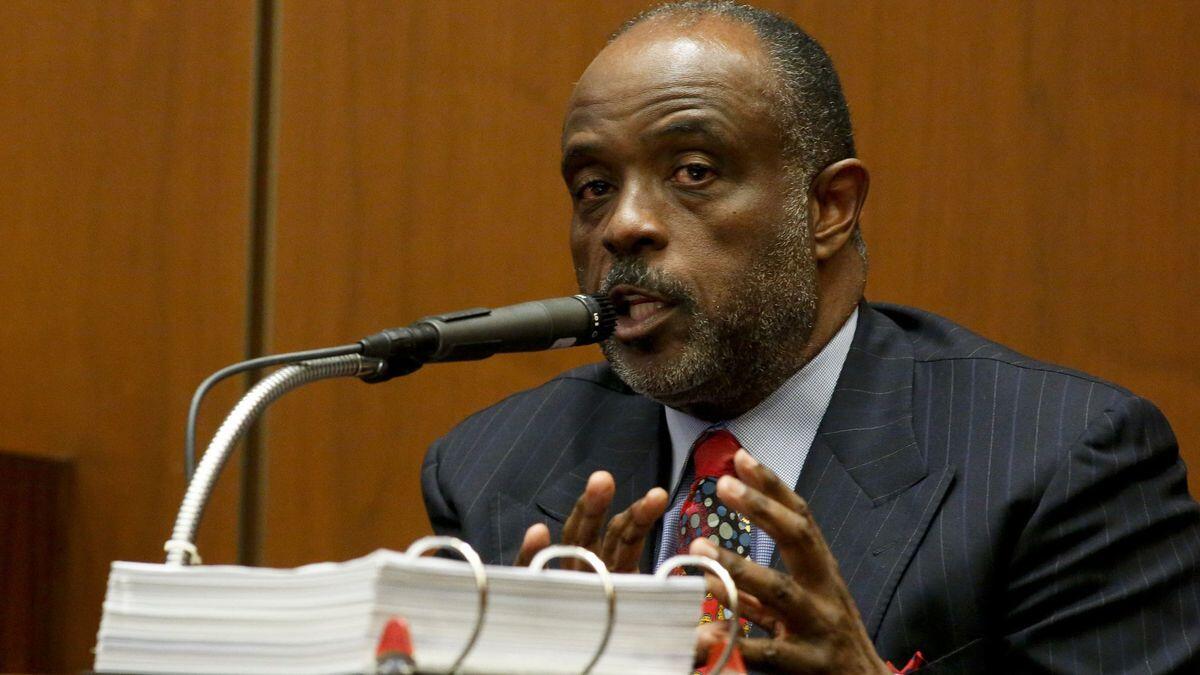
The California Supreme Court has granted a request to unseal court records involving Gov. Jerry Brown’s decision last month to pardon former state Sen. Roderick Wright for felony convictions involving lying about living in his legislative district, officials said Thursday.
The court order was in response to a request by the nonpartisan First Amendment Coalition, which argued that the public has a right to know what information went into the governor’s decision to grant clemency to Wright.
“This is an important victory for public access to court files involving the exercise of executive clemency,” said coalition spokesman Glen A. Smith. “We are gratified the court has recognized that these decisions should be subject to the same public access rules that apply to other judicial records under California law.”
The court gave Brown’s office until Jan. 2 to redact confidential material before giving the court documents that can be released to the public. The court files submitted by the governor’s office include letters of support for a pardon and an internal review of Wright’s case.
The court denied a motion to unseal the records of all clemency cases but left open consideration of requests on other individual cases.
Brown’s office is “currently evaluating the court’s decision,” said spokesman Brian Ferguson. The governor argued against unsealing records in a recent court filing that said confidentiality is consistent with historical practice and is supported by state law.
In pardoning Wright on Nov. 22, the governor wrote: “He has shown that since his release from custody, he has lived an honest and upright life, exhibited good moral character, and conducted himself as a law abiding citizen.”
- Share via
California political watchdog agency fines BART, urges prosecution over using public funds for campaign
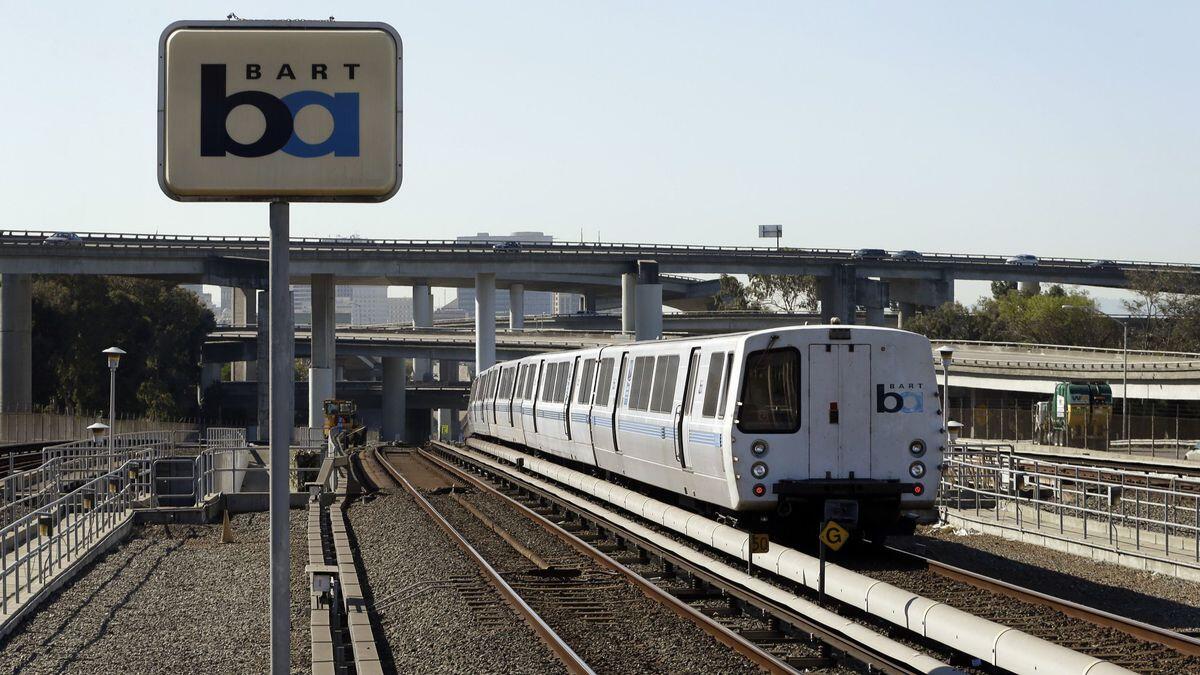
California’s state political watchdog agency on Thursday imposed a $7,500 fine against the Bay Area Rapid Transit District and called for a possible criminal or civil prosecution over allegations the district used public resources to campaign for a 2016 bond measure.
The state Fair Political Practices Commission levied an administrative fine against BART for its failure to disclose spending on YouTube videos, social media posts and text messages to promote Measure RR, which authorized $3.5 billion in general obligation bonds.
Though the panel lacks authority to seek criminal charges over the misuse of public funds, it also urged county district attorneys in the BART service area and the state attorney general to pursue possible criminal or civil charges over the spending of taxpayer dollars for campaign purposes, Commission Chairwoman Alice Germond said.
“It is the concept of misusing public funds that I think we all here are very disturbed about, and we want to send a warning and not create a precedent that is a minor, little slap on the wrist,” Germond said, adding that the referral to criminal prosecutors “would further send a message that this is wrong.”
Commissioner Brian Hatch also called for the state Legislature to consider granting the FPPC power to go after public agencies that spend taxpayer money on campaigns.
Sen. Steve Glazer (D-Orinda) called on the agency to increase the fine to the maximum level of $33,375. The proposed $7,500 fine “represents a slap on the wrist for a very serious violation of the law and the public’s trust,” Glazer said in a letter to the panel.
In supporting the fine recommended by the staff, Germond said BART has agreed to pay the penalty.
“Somebody did something wrong and they have admitted it,” she said.
A staff report said there were factors in favor of a fine below the maximum.
“Although the Commission considers BART’s violations to be serious, the absence of any evidence of an intention to conceal, deceive, or mislead; the voluntary filing of the delinquent campaign statement; and the absence of a prior record are mitigating,” the report said.
- Share via
Activist Kimberly Ellis announces bid for chair of the California Democratic Party amid leadership turmoil

Bay Area progressive activist Kimberly Ellis is making another run at leading the state’s Democratic Party, she announced Thursday.
Ellis burst onto the state political scene in 2017 when she narrowly lost the chairmanship to then-Los Angeles Democratic Party Chairman Eric Bauman.
Last month, Bauman was forced to resign after he was accused of misconduct, throwing the party into turmoil over its leadership. In an investigation by The Times, 10 party staffers and political activists alleged that Bauman made inappropriate sexual comments in professional settings and engaged in unwanted touching.
“Right now, who we are as a Party has come starkly into question,” Ellis wrote in an email to supporters. “We - elected leaders, the labor community, delegates and activists, have to find an answer, and find it quickly.”
“After deep consideration and long conversations with delegates, elected officials, labor leaders, social justice advocates and Party activists who urged me to consider taking up the mantle, I’ve decided to answer the call and run for Chair of the California Democratic Party.”
Citing what she called a “collapse” in state party leadership, Ellis said she’s hoping to help “reform the tone, tenor and culture of the California Democratic Party and rebuild the trust that has been broken.”
Ellis is the first Democrat to announce a campaign for the chair’s race, which is expected to be settled at a May state party convention in San Francisco.
Her bid comes as interim chair Alexandra Gallardo-Rooker is facing criticism from some in the party during her first three weeks in the post. Last week, she fired seven top staffers and closed the party’s Los Angeles office.
The moves riled some state party delegates, who said they were troubled the decisions were made during an ongoing investigation into Bauman’s conduct. Several activists began circulating open letters this week, at least one of which called forthe interim chair’s removal ahead of the May vote. No official petitions to launch that process had been filed with state party officials as of Thursday morning, according to Roger Salazar, a spokesman for the party.
Rooker has said she will not run for the position in May.
- Share via
California police union seeks state Supreme Court review of new law disclosing internal investigation records
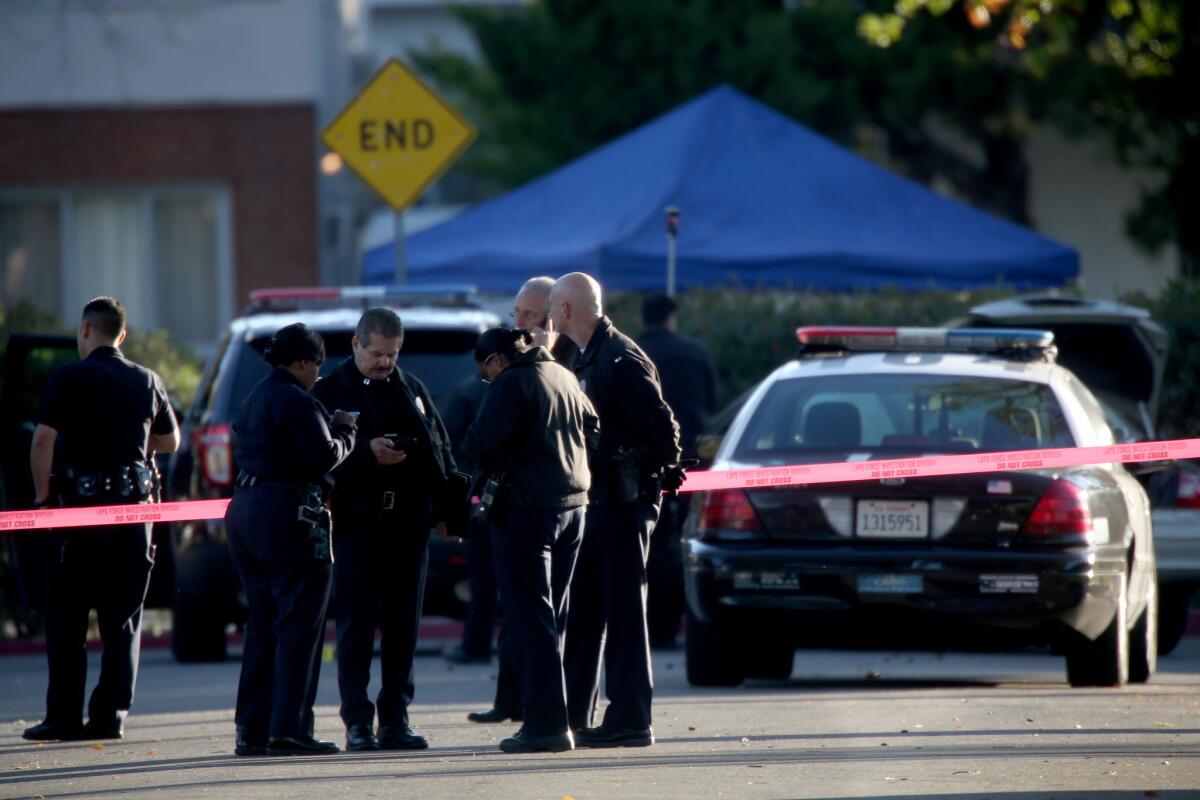
A police union is asking the California Supreme Court to block the release of internal officer investigations before a new state law takes effect next year.
The San Bernardino County Sheriff’s Employees’ Benefit Assn. filed a petition Tuesday asking justices to rule that only investigations of incidents that occur after Jan. 1 would be available under the law — and not those the department has on file from years prior.
The litigation comes after this year’s passage of Senate Bill 1421, which opens to the public for the first time internal investigations of officer shootings and other major uses of force, along with confirmed cases of sexual assault and lying while on duty. The law goes into effect Jan. 1, and the San Bernardino County Sheriff’s Department has told the union it intends to make available in response to public records requests all the information it has.
The union “is very concerned about any plans to retroactively apply Senate Bill 1421,” Grant Ward, the union’s president, said in a statement. “We believe retroactive application violates our members’ rights and we hope the California Supreme Court will consider the serious issues raised by our legal challenge.”
The bill’s author, Sen. Nancy Skinner (D-Berkeley), does not agree with the union’s interpretation. She has said her legislation should apply to all the records in a police department’s possession because the law simply declared that affected records were no longer confidential.
“If the record exists, it’s disclosable,” Skinner said.
A decision on what records will be available under the law is key to how far-reaching it will be. If the court restricts access to incidents that occurred prior to 2019, those cases will not be subject to public scrutiny.
The police union in San Bernardino County is not the only one raising concerns about the law. Earlier this month, Los Angeles Police Department Chief Michel Moore sent a letter to Skinner expressing concern that his agency would be overwhelmed if the law required the department to disclose older incidents.
Even if the law only applied to the previous five years, Moore wrote, it could take nearly 300,000 hours of work to comply with its provisions.
“The LAPD operates with a guiding principle of Reverence for the Law; as such, we will diligently comply with SB 1421,” Moore wrote. “We maintain, however, that a retroactive implementation of SB 1421 will be exceptionally burdensome and would require significant reallocation of front-line investigative personnel.”
Skinner said if complying with the law becomes untenable for law enforcement agencies that maintain records for a long time, she would consider modifications. But she said agencies did not raise this concern during discussion over the bill.
SB 1421 “went through multiple committee hearings, multiple floor debates, extensive opportunity for all parties to weigh in on concerns with its structure,” she said. “That was not an issue that was raised by law enforcement at the time.”
- Share via
Gov. Brown warns of ‘backlash’ for Republicans in 2020 if Obamacare repeal is upheld
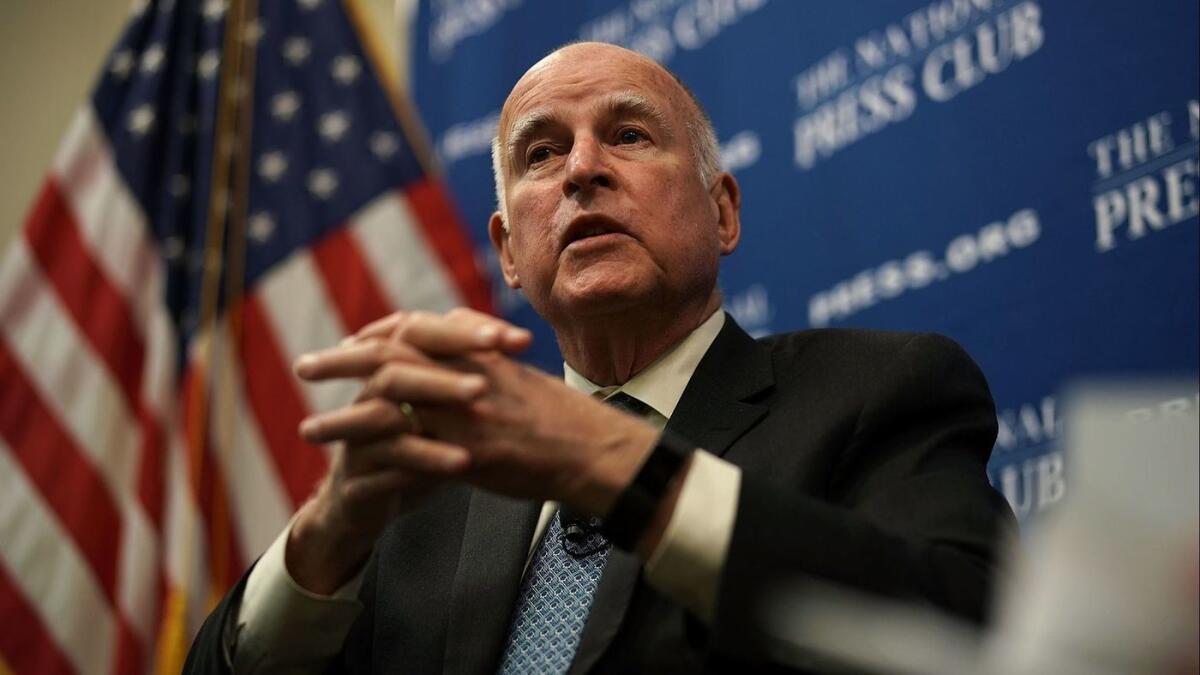
Gov. Jerry Brown warned Republicans on Tuesday that repeal of the Affordable Care Act would devastate the party’s political chances in the 2020 election.
Brown, speaking at a Sacramento Press Club event moderated by Los Angeles Times columnist George Skelton and Brown family historian Miriam Pawel, said a federal judge’s ruling last week to strike down the 2010 law — if upheld by the U.S. Supreme Court — “will build such a backlash that the Democrats will not only take over the Senate, they’ll win the presidency and will win with the kind of momentum, particularly on the issue of healthcare, that [the law] will be replaced probably with something even better.”
The governor, who leaves office in less than three weeks, said he did not believe the ruling by a Texas judge would ultimately prevail.
“I think the decision will probably be overturned,” Brown said.
Few states have embraced the law championed by former President Obama more than California, both through its healthcare exchange, Covered California, and by expanding access to government-funded services under Medi-Cal. Some 12 million Californians now receive healthcare through Medi-Cal, and Brown said a final ruling affecting the federal dollars that subsidize that care would be a serious blow.
“California would not be able to afford it” without the subsidy, the governor said.
- Share via
Bars in Los Angeles, San Francisco could stay open until 4 a.m. under new bill
For the third year in a row, a California lawmaker is trying to keep bars open until 4 a.m.
State Sen. Scott Wiener (D-San Francisco) is reintroducing legislation that would allow Los Angeles, San Francisco and seven other cities to extend the sales of alcohol in bars, clubs and restaurants by an additional two hours.
“Nightlife brings people together, fosters creativity and innovation, supports small businesses, and creates middle-class jobs,” Wiener said in a statement. “It’s time to embrace our nighttime economy and give our cities the tools they need to foster the best nightlife possible.”
Last year, Gov. Jerry Brown vetoed a similar bill by Wiener, writing: “I believe we have enough mischief from midnight to 2 without adding two more hours of mayhem.”
Should this year’s measure, Senate Bill 58, advance through the Legislature, Gov.-elect Gavin Newsom would decide whether to sign it into law.
Los Angeles Mayor Eric Garcetti has endorsed SB 58, saying the city should have more flexibility than it does now.
“Every community has its own needs, and cities should be able to make informed decisions about what nightlife hours make sense for residents, visitors, and neighborhoods,” Garcetti said in a statement.
The bill would create a five-year pilot program where Los Angeles, San Francisco, Oakland, Sacramento, West Hollywood, Long Beach, Coachella, Cathedral City and Palm Springs could decide to allow restaurants and bars within their cities to serve alcohol until 4 a.m. with the approval of the state Department of Alcoholic Beverage Control.
- Share via
Bars in Los Angeles and San Francisco could stay open until 4 a.m. under new bill
For the third year in a row, a California lawmaker is trying to keep bars open until 4 a.m.
State Sen. Scott Wiener (D-San Francisco) is reintroducing legislation that would allow Los Angeles, San Francisco and seven other cities to extend the sales of alcohol in bars, clubs and restaurants by an additional two hours.
“Nightlife brings people together, fosters creativity and innovation, supports small businesses and creates middle-class jobs,” Wiener said in a statement. “It’s time to embrace our nighttime economy and give our cities the tools they need to foster the best nightlife possible.”
Last year, Gov. Jerry Brown vetoed a similar bill by Wiener, writing: “I believe we have enough mischief from midnight to 2 without adding two more hours of mayhem.”
Should this year’s measure, Senate Bill 58, advance through the Legislature, Gov.-elect Gavin Newsom would decide whether to sign it into law.
Los Angeles Mayor Eric Garcetti has endorsed SB 58, saying the city should have more flexibility than it does now.
“Every community has its own needs, and cities should be able to make informed decisions about what nightlife hours make sense for residents, visitors and neighborhoods,” Garcetti said in a statement.
The bill would create a five-year pilot program where Los Angeles, San Francisco, Oakland, Sacramento, West Hollywood, Long Beach, Coachella, Cathedral City and Palm Springs could decide to allow restaurants and bars within their cities to serve alcohol until 4 a.m. with the approval of the state Department of Alcoholic Beverage Control.
- Share via
GOP lawmaker pitches plan to kill California’s new DMV voter registration system
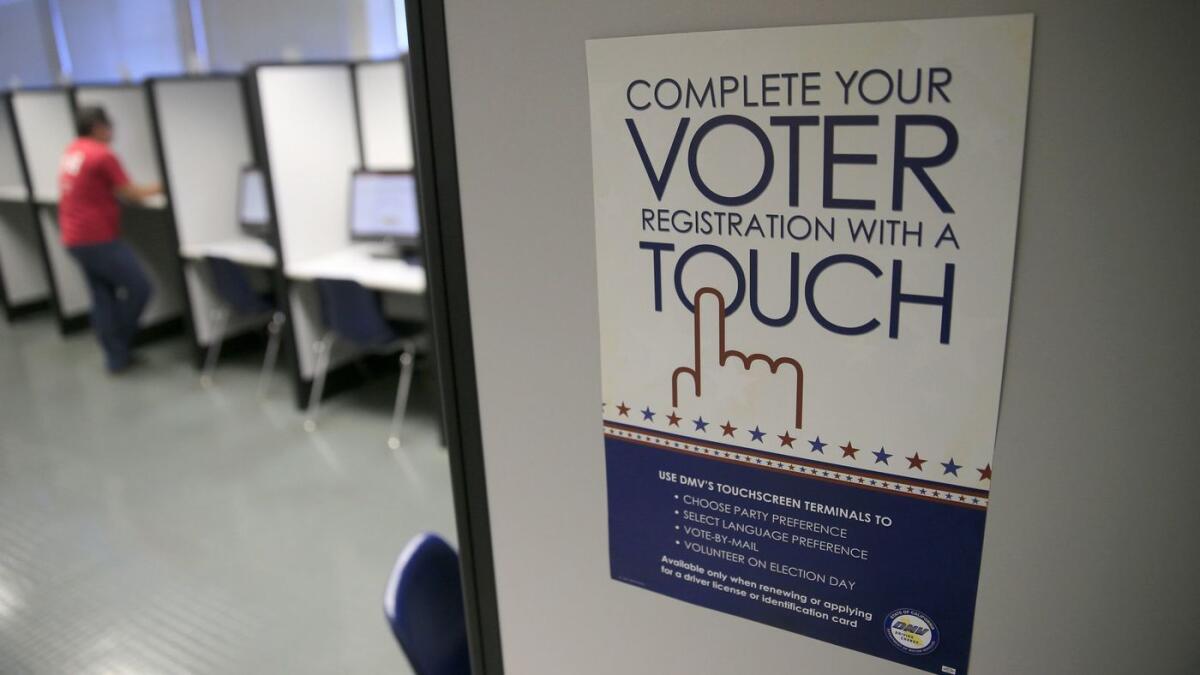
Less than eight months after California’s new voter registration system went online at the Department of Motor Vehicle offices, a leading Republican lawmaker said the beleaguered project should be canceled.
“Enough is enough,” state Senate Minority Leader Patricia Bates (R-Laguna Niguel) said in a statement on Monday. “I’ve been deeply troubled reading the media reports highlighting the failed motor voter program.”
Bates introduced Senate Bill 57, which would return voter registration at DMV offices to a voluntary, “opt-in” process. In April, state officials formally launched the system designed to automatically register those eligible to vote unless they specifically declined.
But the new “motor voter” program has produced a series of errors — including duplicate registration forms, incorrect political party affiliation and the registration of as many as 1,500 people with legal U.S. residency but no citizenship. DMV officials have insisted the errors were limited in scope and have been corrected, though Secretary of State Alex Padilla said last week that he lost “confidence and trust” in DMV Director Jean Shiomoto.
Shiomoto, who has run the department since 2013, has announced she will retire from state government at the end of the month.
SB 57 would cancel the program established by a 2015 law that increased the volume of voter registrations at DMV offices and through online appointments. If successful, it would return California to a voluntary system in place since passage of a federal law in 1993.
Bates said in a written statement Monday that her bill was prompted not only by news coverage of the voter registration mistakes but also by what she saw at a DMV office last month.
“The information presented to DMV customers is unclear,” she said. “I’m concerned as all Californians should be.”
- Share via
California’s DMV director announces retirement amid problems with ‘motor voter’ program
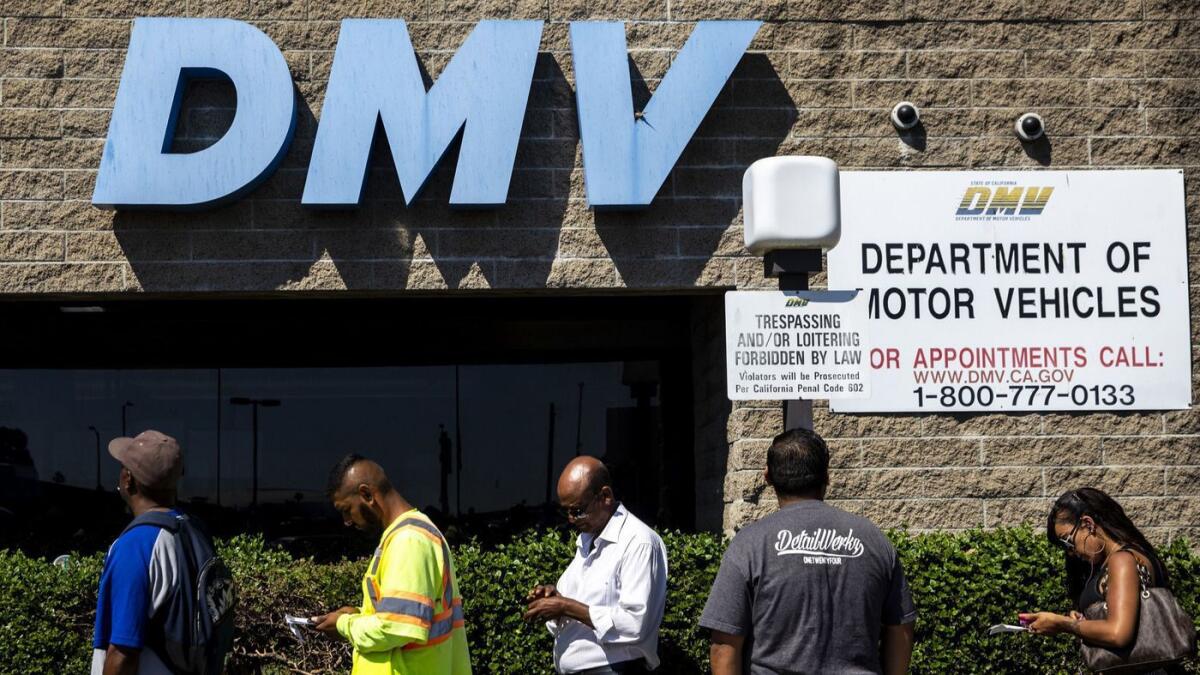
The director of the California Department of Motor Vehicles will retire at year’s end with a number of questions unanswered about the implementation of a major voter registration system and long wait times experienced by customers for much of the past summer.
Jean Shiomoto will not continue in her current role as Gov.-elect Gavin Newsom takes office, and “announced to staff several weeks ago her intent to retire at the end of the year after 38 years in state service,” spokesman Armando Botello said in an email to The Times on Friday.
Newsom’s transition team did not immediately respond to a request for comment on who might lead the department in 2019.
Shiomoto was appointed DMV director by Gov. Jerry Brown in the fall of 2013, having served in prior leadership roles with the department. DMV officials have been sharply criticized by lawmakers in recent months for delays in serving customers at its field offices across the state.
Last week, DMV officials revealed errors in registering California voters for the November election — mistakes that followed a series of problems in the rollout of the state’s new “motor voter” registration system. Secretary of State Alex Padilla last week said he had lost confidence in Shiomoto’s leadership as a result of the voting registration problems.
- Share via
New law could break the stalemate over housing on the site of a near-vacant Cupertino mall
For more than a decade, developers have tried to build new housing on the site of an all-but-empty mall in Cupertino, a city in the heart of Silicon Valley and home to Apple headquarters. A well-organized group of neighbors, upset about traffic, building heights and the potential loss of the community’s suburban lifestyle, turned away every plan.
Now, for the first time, the stalemate might be broken — thanks to a decision made in the state Capitol.
In an effort to address California’s housing affordability problem, legislators passed a law last year that requires cities and counties to approve housing projects if they comply with local zoning rules and other standards, forcing some resistant communities to agree to new homebuilding. In September, the city of Cupertino, citing the state law, approved developer Sand Hill Property Co.’s proposal to build an office park and more than 2,400 homes where the Vallco Shopping Mall sits.
- Share via
Local government was a last bastion for struggling California Republicans. Not anymore
There’s no shortage of watery metaphors to describe the disaster that befell California Republicans this midterm election.
A blue wave. A Democratic tsunami. But the most apt may be a flood, with the casualties steadily rising as the vote count climbed in the days and weeks following Nov. 6. Eventually half the GOP congressional delegation was washed away, along with the entire slate of statewide Republican candidates.
In Sacramento, Democrats claimed 29 of 40 state Senate seats and seized three-quarters of the 80-member Assembly — the largest number since 1883, when Chester A. Arthur was serving in the White House.
- Share via
For the Republicans left in California’s Legislature, fewer lawmakers will have to do more work
From January to late summer every year, the California Legislature is a perpetual motion machine. And in the new year, the people most likely to struggle in keeping up will be Republicans, vastly outnumbered but still responsible for representing millions of the state’s residents.
There are 22 standing committees in the state Senate, plus at least a dozen more subcommittees or special committees. And after November’s election, only 11 Republican senators will be left to divvy up the work.
To the victors go the spoils. To the vanquished go the extra assignments.
- Share via
Gavin Newsom sends out inaugural save the dates — and hefty fundraising requests
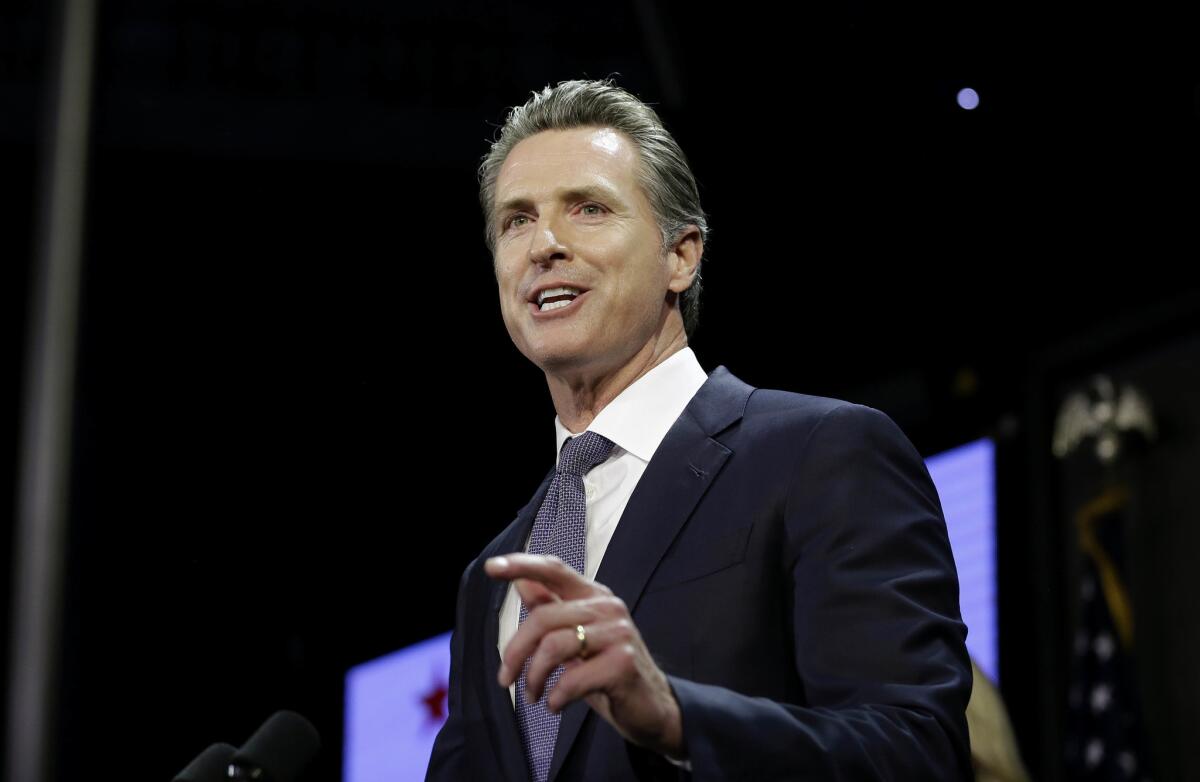
Mark your calendars: Gov.-elect Gavin Newsom has a full slate of events planned around his inauguration, according to save-the-date announcements sent to California politicos this week.
The festivities include a “leadership circle” luncheon and “family celebration” at the California State Railroad Museum in Sacramento on Jan. 6 in addition to a previously announced concert called California Rises that Sunday evening to benefit those affected by recent wildfires.
The swearing-in ceremony itself will be the next day, Jan. 7, at 11 a.m.
Those who want to fete the incoming governor will have ample opportunities to do so, but it won’t come cheap. The announcement lists a number of fundraising tiers — ranging from $25,000 to $200,000 — that package together tickets to the inauguration and assorted parties.
The price tags are even higher for those who want a “sponsorship” role for the Sunday night benefit concert, featuring as-yet unannounced “special guests.” Event organizers advertised packages that top out at $1 million, which include prominent logo placement on stage screens, tickets to VIP receptions and floor seats for the show.
Newsom’s inaugural fundraising committee is set up as a nonprofit 501(c)(4) group, which can accept unlimited donations and is not subject to disclosure requirements about its donors. Nathan Click, a spokesman for Newsom, said all fundraising for the inaugural events and the benefit concert will be reported to the state campaign finance agency as behested payments and will be disclosed within 30 days of receipt of the funds.
- Share via
California housing crisis podcast: The nation’s most discussed housing bill returns
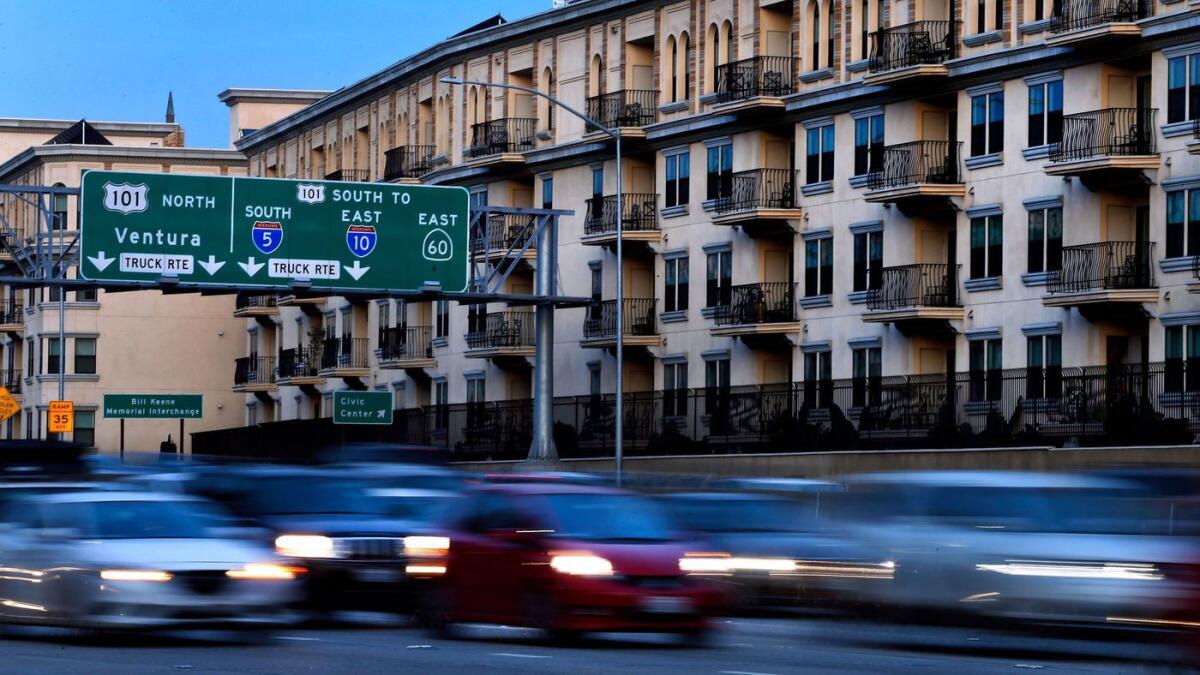
Last year, legislation that would have allowed for increased apartment construction near transit across California became a national flashpoint for a debate over the future of cities in an era of high housing costs and pressures to address climate change. The bill suffered a quick death in the Legislature.
Now, Sen. Scott Wiener (D-San Francisco) has brought a version of the legislation back as Senate Bill 50, which would allow four- to five-story buildings near rail lines and loosen local zoning rules near other mass transit and in wealthy neighborhoods.
On this episode of “Gimme Shelter: The California Housing Crisis Podcast,” we talk with Wiener about what he learned from last year’s failures, how he has tried to mollify concerns from low-income tenant groups and the expectations for SB 50.
We also go through other new housing legislation, including measures that would increase state spending on low-income development.
“Gimme Shelter,” a biweekly podcast that looks at why it’s so expensive to live in California and what the state can do about it, features Liam Dillon, who covers housing affordability issues for the Los Angeles Times’ Sacramento bureau, and Matt Levin, data and housing reporter for CALmatters.
You can subscribe to “Gimme Shelter” on iTunes, Stitcher, Soundcloud, Google Play and Overcast.
- Share via
California’s DMV failed to finish registering 329 new voters before November election
Officials at the California Department of Motor Vehicles said Friday that the agency failed to send information for 329 new voters to state elections officers in time for the November election, the latest revelation in a string of mishaps regarding voter registration.
Secretary of State Alex Padilla responded with a blistering letter, calling on Gov. Jerry Brown or Gov.-elect Gavin Newsom to replace Jean Shiomoto, the DMV director.
“The Director of DMV has lost my confidence and trust,” Padilla wrote.
In all, the agency revealed that 589 mailed voter registration records that should have been processed under election deadlines weren’t sent to California’s secretary of state until late November, including forms from 260 drivers who had intended to update their address on existing voter registration records.
The DMV had been instructed to not send registration forms that came in after Oct. 22, but the voters in question had forms that were postmarked before the deadline. In some cases, when the postmark wasn’t legible, the agency said, documents inside indicated the voter had intended to finish their registration in time for the Nov. 6 election.
“The DMV recognizes the pause in transmittals was an error and affected the timing of the registration of the 589 individuals referenced above relative to the November election,” Shiomoto wrote in a letter to Padilla on Friday. “The pause was due to a misunderstanding on the part of the department, for which we take responsibility.”
Those who were trying to update their address for voter registration would not have been blocked from casting ballots. But officials said it’s unclear whether any of the 329 new voters were able to participate in the election. Shiomoto said in her letter that DMV will work with elections officials.
The errors were not related to previous DMV mistakes about registering voters, problems associated with the rollout of the state’s new “motor voter” law. In those cases, multiple registration forms were sent to local elections offices for some voters, some people were assigned the wrong political party preference and others who are noncitizens were incorrectly placed on the list of registered voters. DMV officials have yet to respond to questions posed by The Times over the last several weeks about who knew of those mistakes and when.
- Share via
Newsom appoints a labor advocate and a former staffer as his chief deputy Cabinet secretaries
A labor advocate and a San Francisco political operative have accepted positions in Gov.-elect Gavin Newsom’s new administration.
Angie Wei, a Capitol insider with deep ties to organized labor in California, will serve as a chief deputy Cabinet secretary with a focus on policy development.
As a legislative director and chief of staff at the California Labor Federation, Wei has represented more than 1,200 unions and 2.1 million workers in Capitol fights over a host of policy issues, including drug-pricing transparency and paid family leave.
The governor-elect also tapped Jason Elliott, a policy advisor to Newsom during his time as mayor of San Francisco and a chief of staff to San Francisco Mayor Ed Lee, as another chief deputy Cabinet secretary overseeing executive branch operations.
Elliott and Wei will serve under Ana Matosantos, Newsom’s previously announced Cabinet secretary.
- Share via
California had highest midterm election turnout since 1982
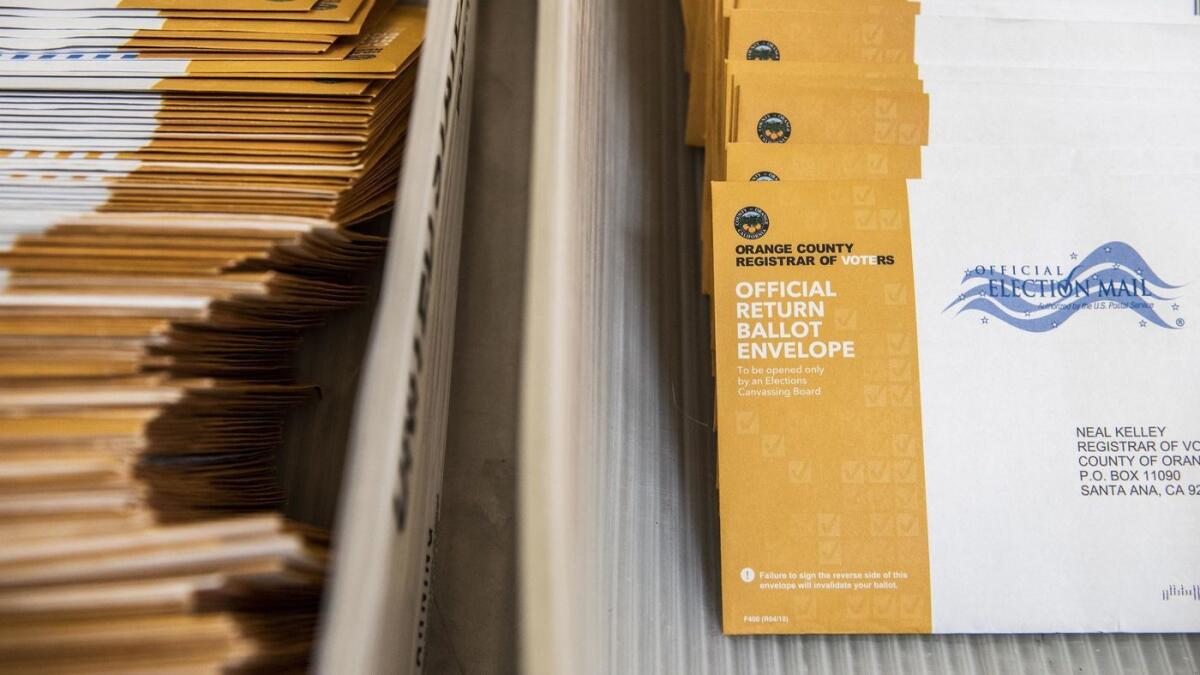
California voters turned out for the November election at a higher rate than any similar election since 1982, according to final statewide results certified Friday.
More than 12.7 million voters cast ballots in the Nov. 6 election, representing 64.5% of the state’s registered voters. That represents the highest percentage of voter turnout in a gubernatorial election since Nov. 2, 1982, when 69.7% of voters participated.
It was a dramatic change from 2014, which saw the lowest turnout — 42.2% of registered voters — of any gubernatorial election since 1942.
“What an election it was,” Secretary of State Alex Padilla said in a video posted online by his office.
In all, 41 counties reported turnout above the statewide average. Fifty-seven percent of registered voters in Los Angeles County cast ballots, a marked increase from the 31% of voters who showed up in the fall election four years ago.
Orange County, which saw fierce competition for four of the six congressional seats all or partially inside its borders, had almost 71% of its voters cast ballots. That’s the highest turnout for the county since at least 1990, according to statewide statistics.
Elections in presidential years routinely see strong voter turnout. In 2016, 75% of California’s registered voters cast ballots. But gubernatorial elections — which come at the midpoint of a presidential term in office — have generally been less popular with voters. Last month’s election, though, featured a number of campaigns that drew heavily on the record of President Trump and a host of national issues including healthcare, immigration and the environment.
An analysis by The Times shows that 43% of the votes — 5.2 million in all — were counted in the weeks after election night. California has a number of laws that have led to a longer vote counting process. The state, for example, allows any ballot postmarked by election day to be counted as long as it arrives at a county election office by the following Friday.
In the race for governor, Gov.-elect Gavin Newsom defeated Republican businessman John Cox by almost 3 million votes. Cox, who came in second in a June primary that saw 27 candidates, garnered a smaller percentage of November votes than any GOP candidate since 1998 — and even came up slightly short of the low vote total won that year by former state Atty. Gen. Dan Lungren. The official results show Cox won just 38.1% of the vote, compared with Newsom’s 61.9% of ballots cast.
Historically, Republican candidates for governor have hovered no lower than about 40% of the votes cast in a general election, and Cox’s total share of the ballots continued to fall as the tallies were updated through late November.
This year also marked a milestone in the way elections are conducted in communities across California. Five counties enacted a new voting system that swapped neighborhood polling places for ballots mailed to every voter and a limited number of all-purpose “vote centers” for registration or voting assistance prior to election day. In each of those counties, voter turnout was higher than the statewide average. It was also the first year for “conditional voter registration,” the state’s version of same-day registration.
“Clearly [it was] a big success, and I look forward to working with many more counties” in implementing the new vote centers in 2020, Padilla said in Friday’s online video.
As of last month, some 19.7 million Californians were registered to vote, the largest number of voters in state history. Elections officials expect strong turnout in 2020 and are already preparing for the statewide primary in late winter of that year — moved up by California lawmakers in hopes of giving the state a more prominent role in the presidential race.
- Share via
Gov.-elect Gavin Newsom fills top communications and external affairs posts
Gov.-elect Gavin Newsom on Thursday picked a veteran Capitol staff member to lead his communications shop when he takes office.
Daniel Zingale, who previously served as Cabinet secretary to Gov. Gray Davis, senior advisor to former Gov. Arnold Schwarzenegger and chief of staff to Maria Shriver, will serve as Newsom’s senior advisor on strategy and communications.
In addition to Zingale, Newsom filled several other positions in the latest round of hires for his new administration.
Nathan Click, the communications director for Newsom’s gubernatorial campaign, will stay on as chief spokesperson and director of public affairs.
Priscilla Cheng, former chief of staff at the Los Angeles County Federation of Labor and senior political advisor to the Newsom campaign, will be Newsom’s director of external affairs.
Maricela Rodríguez, now with the California Endowment, will become director of civic engagement and strategic partnerships.
Newsom takes the oath of office on Jan. 7.
- Share via
California Assemblyman Joaquin Arambula says he was arrested after spanking his daughter
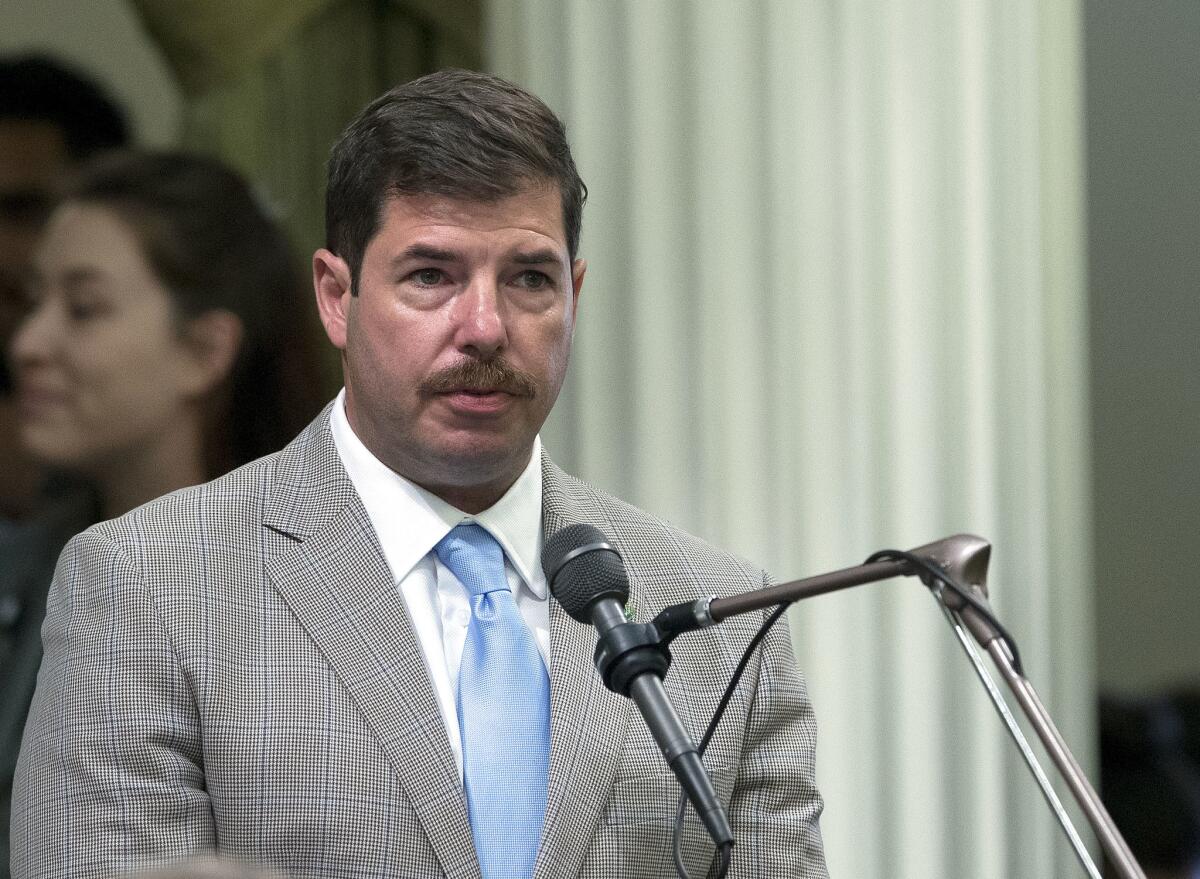
California Assemblyman Joaquin Arambula (D-Fresno), who was arrested Monday on suspicion of misdemeanor willful cruelty to a child, said he was taken into custody by police after he spanked his 7-year-old daughter.
“Like most parents know, kids at times can act out. We had an incident on Sunday night of that. I did discipline my daughter and I spanked her on her bottom,” Arambula said Wednesday, adding that he spanked the child with his hand.
Fresno Police Chief Jerry Dyer said Tuesday that Fresno’s Dailey Elementary Charter School contacted child protective services Monday after a student walked into the office with an injury from the night before. Officers responded to the school and interviewed the child. Dyer declined to offer any identifying details about the child or to describe the nature of the injury.
“My daughter was pretty upset, to be fair, and angry,” Arambula said Wednesday. “The next day she woke up still angry and went to school angry.”
Arambula said he spanks his children “once a year at most” and called it a “tool of last resort.” He said he did not see any injuries on the child Sunday evening and does not know what happened at the school that led officials to call child protective services.
Spanking a child is generally not illegal under California law, unless the act is considered excessive or unjustified.
“I thought the discipline that we did was appropriate,” Arambula said. “And we have to feel as parents as if there are times we have to help to correct, and sadly we’re at where we are now.”
Arambula’s three daughters, ages 7, 6 and 3, were placed in the custody of his parents Monday. The assemblyman said child protective services and the Department of Social Services interviewed him, his wife and his daughters separately and will allow the children to return home Wednesday evening.
He thanked the teachers at his daughter’s school and police officers “for doing their job.”
When asked how he thought the arrest may affect his political career, Arambula said he felt confident that his constituents knew his character.
“My priorities have been focused on getting my family back together,” Arambula said. “I believe the community that elected me knows me. They have seen me and my family and my daughters, and they trust and believe that I am a great father. I will continue to put my trust in them.”
No formal charges have been filed against Arambula.
- Share via
Retired appeals court justice William Newsom, father of California Gov.-elect Gavin Newsom, dies at 84
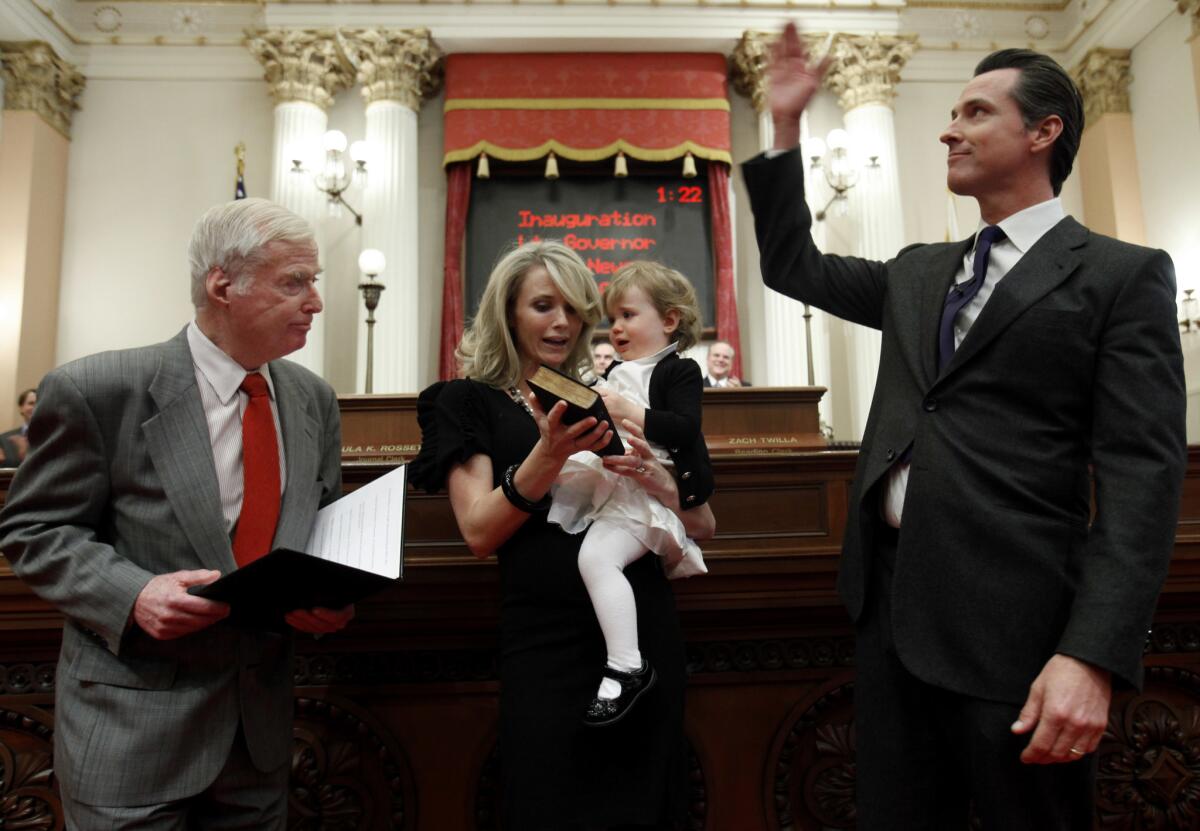
William Newsom III, a retired appellate court justice and father of Gov.-elect Gavin Newsom, died Wednesday at age 84, the governor-elect’s office announced.
“Justice Newsom was a proud, lifelong Californian, a public servant of profound accomplishment and a powerful voice for individual rights and environmental protection,” Nathan Click, a spokesman for the governor-elect, said in a statement.
The elder Newsom was a lifelong resident of San Francisco and was well-connected in the city’s political circles. He was appointed to the Superior Court by Gov. Jerry Brown in 1975, and later was appointed to the Court of Appeal.
William Newsom was a longtime friend of Gordon Getty, son of oil magnate J. Paul Getty, and managed the Getty family trust on behalf of Gordon Getty.
Brown said in a statement Wednesday that the Capitol flags would be flown at half-staff in honor of William Newsom.
“Anne and I extend our deepest condolences to the entire Newsom family. Bill was a longtime friend, a champion of the environment and someone whom I was proud to appoint to the superior court and court of appeal,” Brown said.
- Share via
California lawmakers to consider ban on guns for those convicted of serious alcohol-related crimes
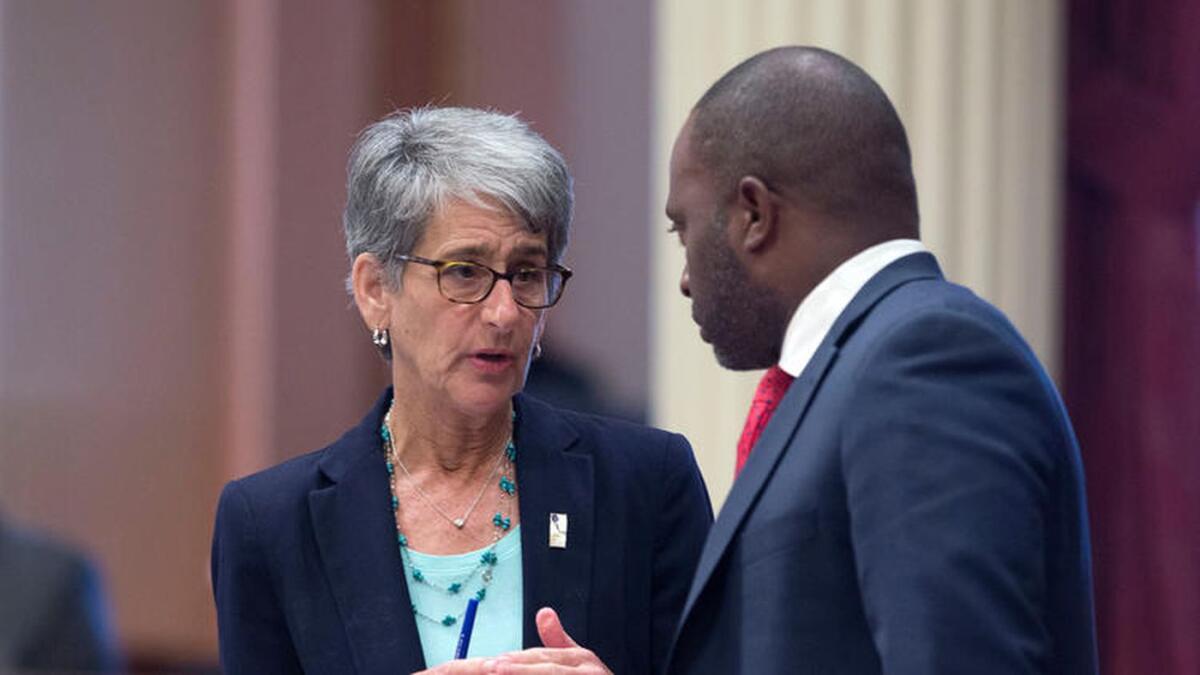
Californians convicted of serious alcohol-related crimes would lose their firearms for 10 years under legislation proposed Wednesday by state Sen. Hannah-Beth Jackson (D-Santa Barbara).
Jackson’s bill is the latest of a string of gun-control measures proposed after last month’s mass shooting at a Thousand Oaks bar in which 12 people were killed.
Jackson said her bill is based on the findings of a 2017 UC Davis study that found prior convictions for crimes involving alcohol were associated with up to a fivefold increase in the likelihood of arrest for serious offenses including those involving guns.
“The research demonstrates that people with certain alcohol-related convictions are at increased risk of committing a violent or firearm-related crime,” Jackson said.
State law already bars people convicted of certain violent crimes from possessing firearms for 10 years or more.
Jackson’s Senate Bill 55 would expand the list of crimes resulting in firearm bans to include serious alcohol-related offenses, including vehicular manslaughter while intoxicated. People would also be prohibited from possessing guns if they have multiple convictions for driving under the influence.
- Share via
California’s chief justice says bail overhaul will continue with or without the new law
California Chief Justice Tani Cantil-Sakauye on Tuesday defended a landmark new state law abolishing money bail, saying it was crafted to ensure courts “do not judge a person based on the size of their wallet or what they have access to in someone else’s wallet.”
In an annual meeting with reporters in San Francisco, the chief justice said the state’s top court officials would continue to improve how judges determine whether criminal defendants are fit for release ahead of trial, even if the new law is suspended amid an effort from the bail industry to block it through a voter referendum.
“We are seeking to make it as a fair and transparent as possible,” she said of the pretrial detention process. “We as a branch supported [Senate Bill] 10 because we believed it was a fairer way to assess a person charged with a crime.”
- Share via
Democrat’s win stands in Orange County state Senate race after supporters of Republican incumbent conduct partial recount
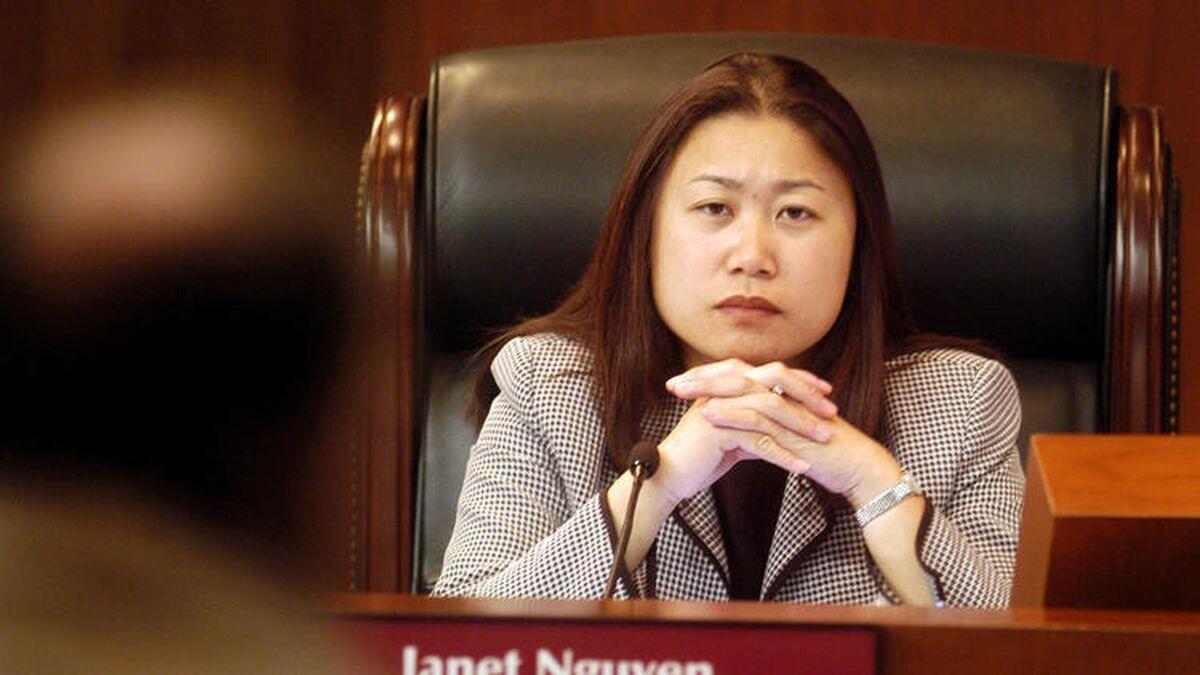
Democrat Tom Umberg’s election victory will stand in the 34th state Senate District after supporters of losing Republican incumbent Janet Nguyen completed their examination of provisional ballot envelopes, according to Neal Kelley, the Orange County registrar of voters.
Kelley said Tuesday that Nguyen’s supporters did not pursue a recount of any votes after they spent two days examining the envelopes from 13 precincts where Umberg won.
“The vote result will not change,” Kelley said, adding the results, as certified on Nov. 30, stand as official and Nguyen’s camp cannot request further recounts.
Last week, Nguyen’s supporters requested a partial recount. The more limited review they performed cost them $9,400, Kelley said.
Umberg, a former state assemblyman from Santa Ana, won the election by 3,088 votes over Nguyen of Garden Grove.
- Share via
Fresno Assemblyman Joaquin Arambula is arrested on child cruelty charge
Fresno police arrested California Assemblyman Joaquin Arambula (D-Fresno) on Monday on a misdemeanor charge of willful cruelty to a child.
The arrest was made after police were contacted by Child Protective Services, which reported that a student at Fresno’s Dailey Elementary Charter School walked into the campus’ administrative office with an injury that occurred the night before, according to Fresno Police Chief Jerry Dyer.
“The victim provided the officers with the circumstances around how the injury occurred and who was responsible for that injury,” Dyer said. “The person responsible for that injury was determined to be Joaquin Arambula.”
Dyer declined to provide identifying information about the child, including age, gender or relationship to Arambula, and details about the injury.
Arambula, 41, lives in Fresno with his wife, Elizabeth, and three daughters, according to his Assembly website.
Felicia Cousart Matlosz, a spokeswoman for Arambula, did not provide details of the arrest, but said in a statement on Tuesday that “Joaquin is a committed father who wants what is best for his children.”
“He is fully supportive of the process, which will show he is a loving and nurturing father,” she said.
Police arrived at the school shortly after 2 p.m. on Monday and spoke with the child. Officers called Arambula and his wife, Dyer said, adding that Arambula followed the advice of his attorney and declined to speak with officers about the incident.
Arambula was arrested at the school later that day and was taken to police headquarters, processed and released with a citation, Dyer said.
“The child is no longer in a position to have contact with Joaquin and is not in danger at this time,” Dyer said.
Dyer said police were working closely with the district attorney’s office with the intent of prosecuting the case.
“Joaquin is a very reputable person in our community and well-liked,” Dyer said. “It is unfortunate that this incident occurred and we have been put in a position where we had to make an arrest. Any time there is a child involved as the victim, we take those cases very serious.”
A spokesman for Assembly Speaker Anthony Rendon (D-Lakewood) declined to comment.
Arambula, a medical doctor, won a special election in 2016 to fill a seat left vacant by former Assemblyman Henry Perea in the 31st Assembly District. His father, Juan Arambula, also served in the Assembly and on the Fresno County Board of Supervisors.
The younger Arambula has focused much of his attention in the Legislature on healthcare and introduced a bill last week to extend Medi-Cal coverage to all California residents without legal immigration status.
- Share via
Judge denies California Senate’s request to dismiss retaliation lawsuit
A Superior Court judge has denied the California Senate’s request to dismiss a retaliation and defamation lawsuit filed by an employee of former Sen. Tony Mendoza (D-Artesia).
In a ruling issued Friday, the court rejected the state Senate’s arguments that a signed severance agreement bars the staff member, Adriana Ruelas, from filing a lawsuit and that the institution is immune to defamation claims under government tort law.
Ruelas filed the lawsuit in April alleging the Senate fired her in September 2017 after she blew the whistle on Mendoza for allegedly harassing a young woman assigned to work in his office as part of a fellowship program. The ruling allows Ruelas to move forward with her case against the upper house.
“This ruing is extraordinarily significant because for years the Legislature and the Senate, in particular, have taken the position that they are above the law and the normal employment rules do no apply to them,” said Micha Liberty, Ruelas’ lawyer. “This court has confirmed what many have been suggesting for years, which is legislative workers do have rights and cannot be misled or misguided in an effort by the Senate to intimidate whistleblowers and victims from coming forward.”
The Senate declined to comment on the litigation.
Mendoza resigned in February after an internal Senate investigation substantiated claims that he made unwanted advances on several staff members during his tenure in the Legislature. The Senate investigation did not confirm Ruelas’ retaliation claim.
In the lawsuit, Ruelas alleged that Mendoza publicly defamed her and said she was fired for performance, despite no record of any issues with her work.
Ruelas also alleges that staff members for the California Senate Rules Committee led her to believe that Mendoza would be barred from speaking about the situation if she signed the severance agreement giving away her right to pursue litigation. Liberty has argued that the terms of the severance agreement are invalid because Ruelas signed it under false pretenses.
Sacramento Superior Court Judge Steven P. Shaw rejected the Senate’s request to throw out Ruelas’ claims of retaliation and failure to prevent discrimination. In an order issued Friday, Shaw says Ruelas “has adequately alleged facts to support rescission of the severance agreement.”
Liberty said she expected to begin issuing deposition orders this week to Mendoza, Secretary of the Senate Danny Alvarez and other top Senate officials at the time of Ruelas’ termination.
- Share via
California’s outdated election scoreboard fuels baseless suspicion as vote count ends
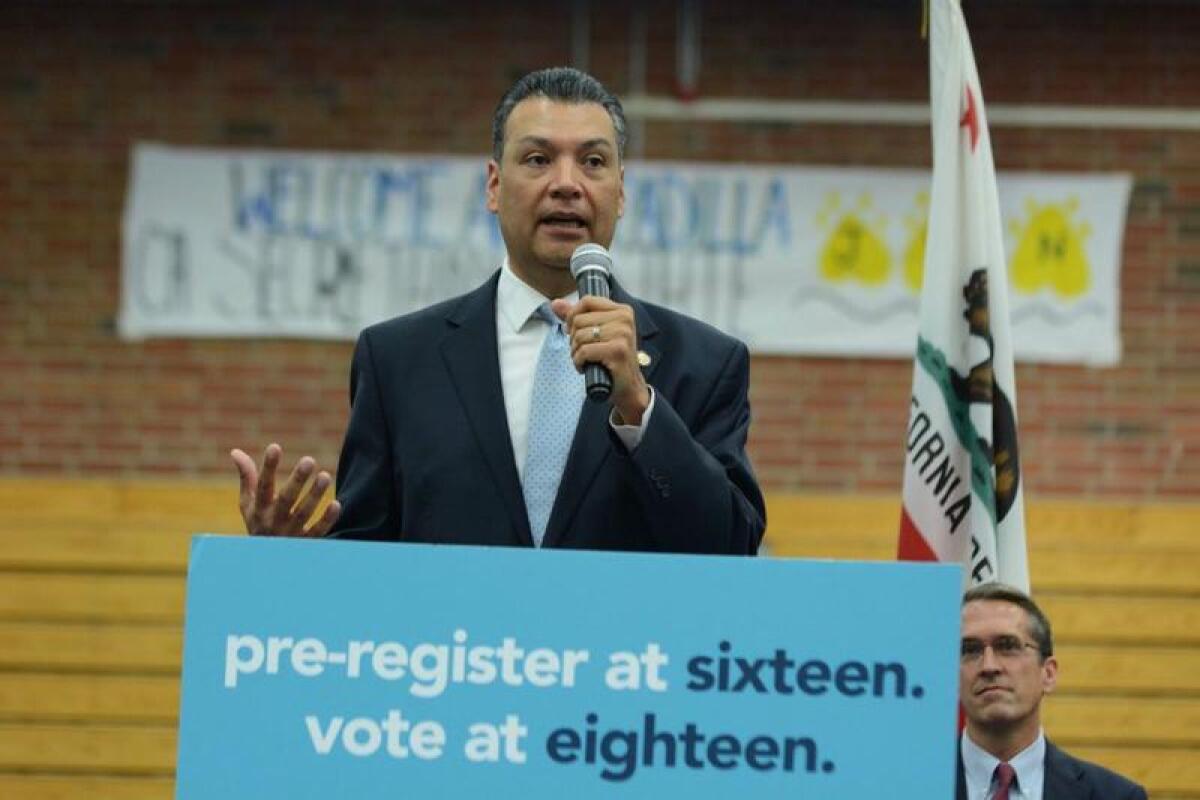
The morning after the Nov. 6 congressional midterm election in California, state, county and media websites reported that 100% of precincts had turned in their results.
It was highly misleading: The final tally, released Friday, showed that a staggering 5.2 million of the 12.1 million ballots cast — 43% — remained uncounted that morning. Most of the outstanding votes were from mail ballots.
The website charts listing results from “100 percent” of the precincts feed public mistrust in the counting despite California’s stringent protections of ballot integrity, said Mindy Romero, the director of USC’s California Civic Engagement Project, a nonpartisan research center in Sacramento.
Precinct results are just for ballots cast in person on election day — a shrinking share of California’s vote.
“It doesn’t really match the reality,” Romero said.
Alex Padilla, a Democrat just reelected as secretary of state, acknowledged that the description of the early results might lead the public to wonder why the vote count continues for weeks, with a gaggle of second-place candidates then pulling into the lead.
“Can the terminology be modernized a little bit there? Yeah, I’m open to that,” he said.
- Share via
Former California GOP officials call on state Republicans to renounce Trump’s rhetoric and ‘nationalism metastasizing in the party’

Five former political directors of the California Republican Party have called on state GOP leadership to renounce nationalist speech used by President Trump as well as candidates who embrace “messages of hatred, division and rhetoric that divides us by race.”
A letter sent Friday to the party’s board of directors blamed Trump for the GOP’s stinging losses on election day in California. It said the California GOP must return to its conservative roots to have any hope of reviving the Republican Party in the state.
“This election proved that choosing Nationalism over Conservatism is a losing proposition. President Trump’s nationalist rhetoric has alienated far more than the diverse electorate that turned out to oppose him on election night — Republicans abandoned Republicans in historic numbers as well,” the letter said. “It is our hope that you will publicly renounce the nationalism metastasizing in the party, advance the cause of conservatism and return the greatness to our Grand Old Party.”
The letter was signed by Mike Madrid, Debbie McCall, Jimmy Camp, Jarryd Gonzales and Matt Robbins, all of whom served stints as party political director since the late 1990s.
A spokesman for the California Republican Party on Saturday declined to comment on the letter.
- Share via
November’s election results will make it harder and more costly to put propositions on the California ballot
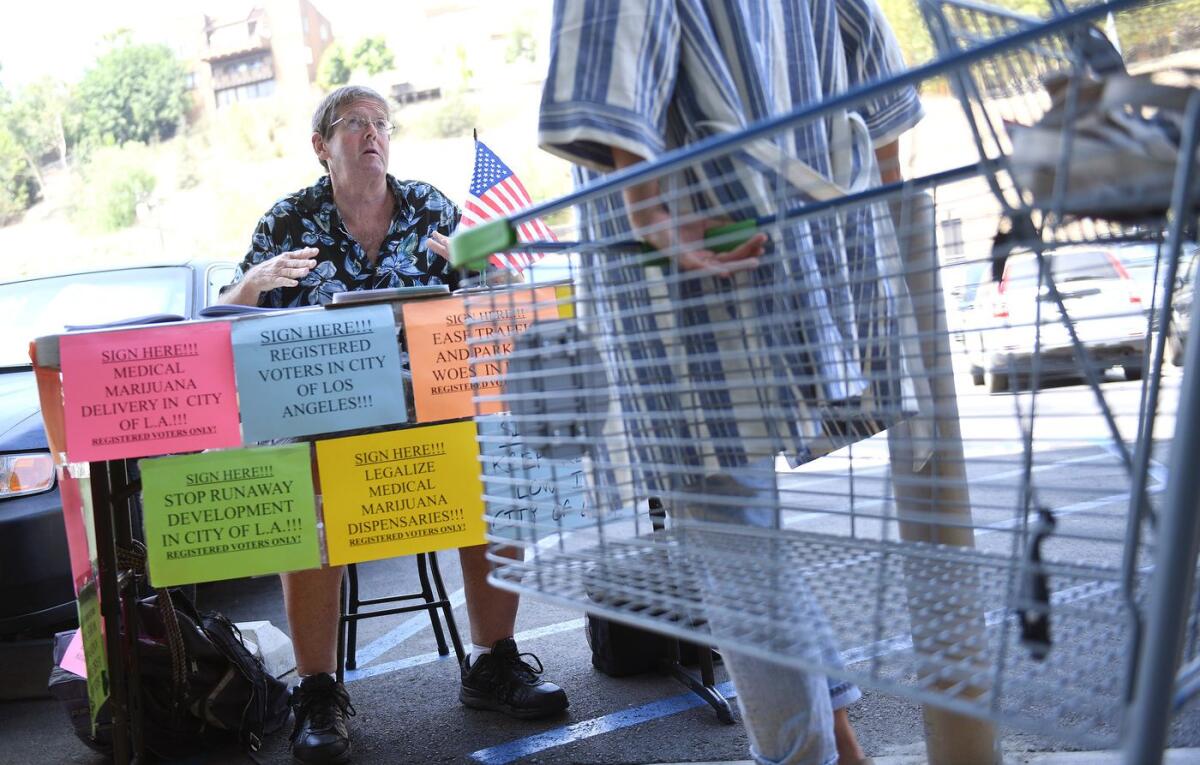
Groups seeking a change in the law or California’s Constitution will find it significantly harder — and more costly — to qualify ballot measures beginning next year, following high voter turnout for the Nov. 6 statewide election.
State law links the number of voter signatures required on an initiative or referendum to the total number of votes cast in the most recent election of a governor. The threshold for qualifying a measure was at its lowest point in decades for elections in 2016 and 2018, after record low turnout in 2014 for the reelection of Gov. Jerry Brown.
Last month’s election, however, saw more than 12.4 million votes cast in the race between Gov.-elect Gavin Newsom and Republican businessman John Cox. By law, proponents of an initiative must gather signatures equal to either 5% or 8% of the total votes cast in the gubernatorial contest — depending on whether the initiative seeks to create a statute or a constitutional amendment. A ballot referendum, which asks voters to overturn a law passed by the Legislature, requires signatures equal to 5% of the governor’s race votes.
Unofficial election tallies show initiative campaigns will need to collect 620,439 valid signatures for statutory measures appearing on the November 2020 ballot — compared to just 365,880 signatures the past two election cycles. Constitutional amendments will go from needing 585,407 valid signatures to requiring at least 992,702 signatures.
Political professionals who specialize in ballot measure campaigns may not have known exactly where the numbers would fall, but were certain that the bar would be raised and costs would go up after this election cycle. One closely watched campaign — an effort to revise the property tax rules under the 1978’s landmark Proposition 13 — intentionally sped up its ballot measure circulation campaign, collecting signatures this year under the lower threshold and thus finding an easier and cheaper path to the November 2020 ballot.
Last month’s election totals will also raise the bar for legislative review of proposed ballot measures. A 2014 state law gives the proponents of an initiative a chance for formal hearings on the proposal once they’ve gathered at least 25% of the signatures needed for final certification. Those hearings, however, do not have to be convened prior to the initiative earning a spot on the next scheduled statewide general election ballot.
- Share via
Gov.-elect Gavin Newsom drops hints about budget, vows not to ignore the Central Valley
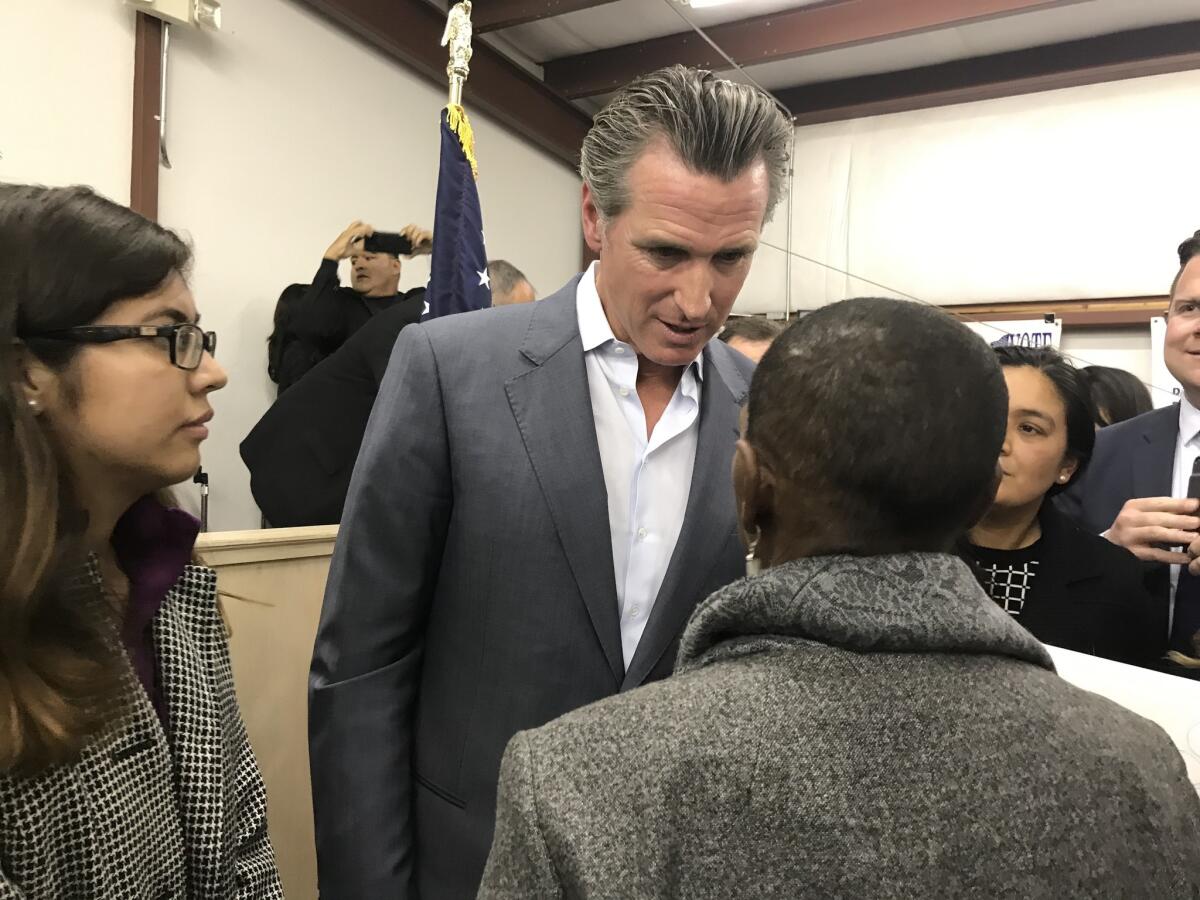
Gov.-elect Gavin Newsom spent Friday in Fresno reassuring business, agricultural and labor leaders of his commitment to the Central Valley, and dropped a few hints that his first budget will set aside more money for young children and to address contaminated drinking water in the region.
Newsom, who will take the oath of office on Jan. 7, also told a packed union hall at the Teamsters Local 431 that under his administration, California will become an assertive and aggressive voice in the nationwide debate over immigration.
Last week, Newsom visited a immigrant detention facility near the U.S.-Mexico border and accused federal officials of treating immigrants seeking asylum “like trash.”
He noted that former Republican governors, including Rick Perry of Texas and Jan Brewer of Arizona, used their political platforms to bend the national conversation on immigration toward more conservative policies. Newsom promised to be similarly vocal on immigration, but in a way that instead reflects California’s pro-immigrant values.
“I think this state has been missing in action a little bit,” Newsom told the crowd. Conservative governors “were vocal and they shaped the conversation. California was pretty silent in those conversations. We need to assert ourselves.’’
Newsom spent most of his time Friday focused on issues crucial to the Central Valley. He made no promises about the fate of the state’s high-speed rail system, but promised to conduct a detailed assessment of the management and cost of the project. But he praised the Central Valley-to-Silicon Valley leg of the rail line, saying it could prove to be a major economic benefit to both areas.
Shantay Davies-Balch, director of maternal health for the March of Dimes in the Central Valley, pressed Newsom on what he planned to do to address the heightened infant and maternal mortality rates in the region, which she said were comparable to a “third-world country.”
“I’m deep in this space and deeply committed and you will see that demonstrably reflected in my first budget that I will submit in January,” Newsom responded.
Newsom said expanding early childhood education and development, including prenatal care, will be one of the top priorities in his administration. He reminded the crowd that, during his successful gubernatorial campaign, he spent $9 million on television ads explaining why he considered it such a crucial issue.
Peter Nunez, president of the Teamsters Local 431 in Fresno, said it’s common to see state politicians in the Central Valley during campaigns, but rare for them to drop by after they win.
“We have a lot to talk about,” he said.
- Share via
California advances plan to allow home deliveries of cannabis in cities that ban pot shops
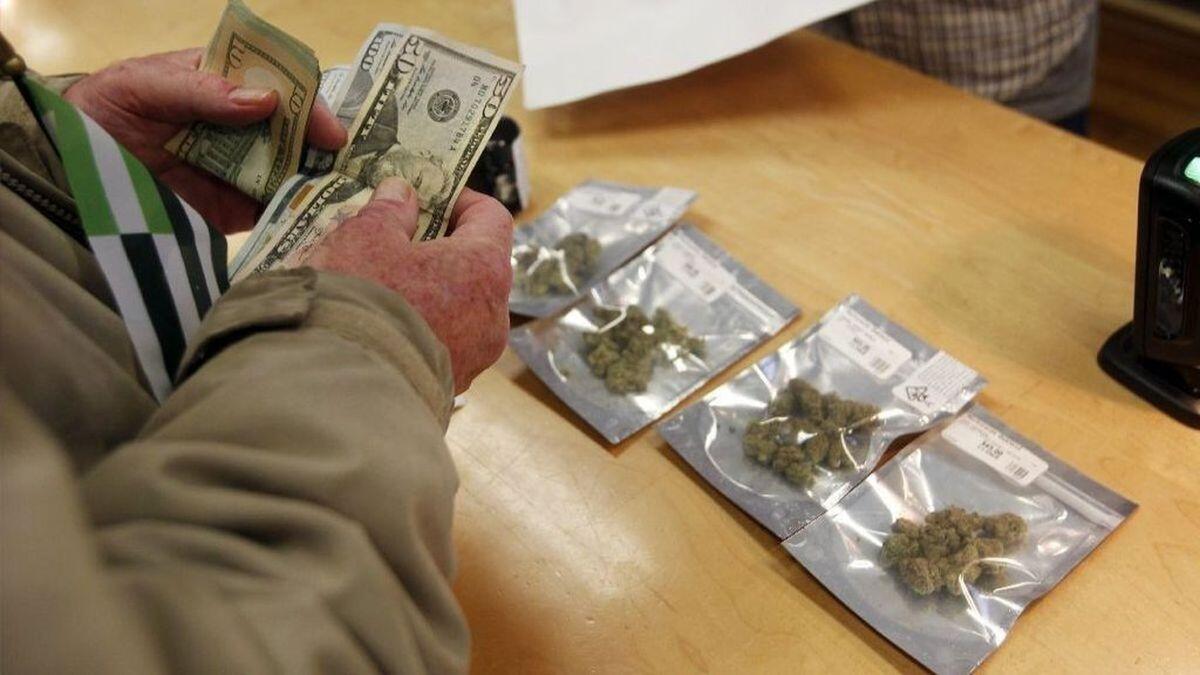
State officials on Friday moved ahead with a plan to allow marijuana deliveries to homes throughout California, including in cities that have outlawed pot shops.
The state Bureau of Cannabis Control said it sent the proposed rules to the state’s Office of Administrative Law, which has 30 days to conduct a routine review of their legality before the regulations become final in January.
The proposed rule has been vigorously opposed by the California Police Chiefs Assn. and the League of California Cities.
“The delivery provisions contained in these regulations seek to subvert the intent of the voters who approved Proposition 64,” league Executive Director Carolyn Coleman said in a recent statement to the group’s members. “By removing local governments’ reasonable regulatory authority on cannabis deliveries, the BCC is imposing a ‘one size fits all’ form of cannabis regulation.”
In a statement in response to the criticism, the bureau said that cities can still adopt regulations on how deliveries are made, but that existing state law “provides that a local jurisdiction shall not prevent delivery of cannabis goods on public roads.”
Police chiefs have voiced concern that marijuana delivery people could become the target of robberies. The new rules prohibit delivery vehicles from carrying more than $5,000 worth of cannabis products and bans the vehicles from having any markings that indicate cannabis is being carried.
“This new restriction is intended to reduce the risk of the delivery vehicle becoming a target of theft or other crime,” the bureau said in a statement.
- Share via
Recount requested in Orange County state Senate district after Democrat ousts Republican
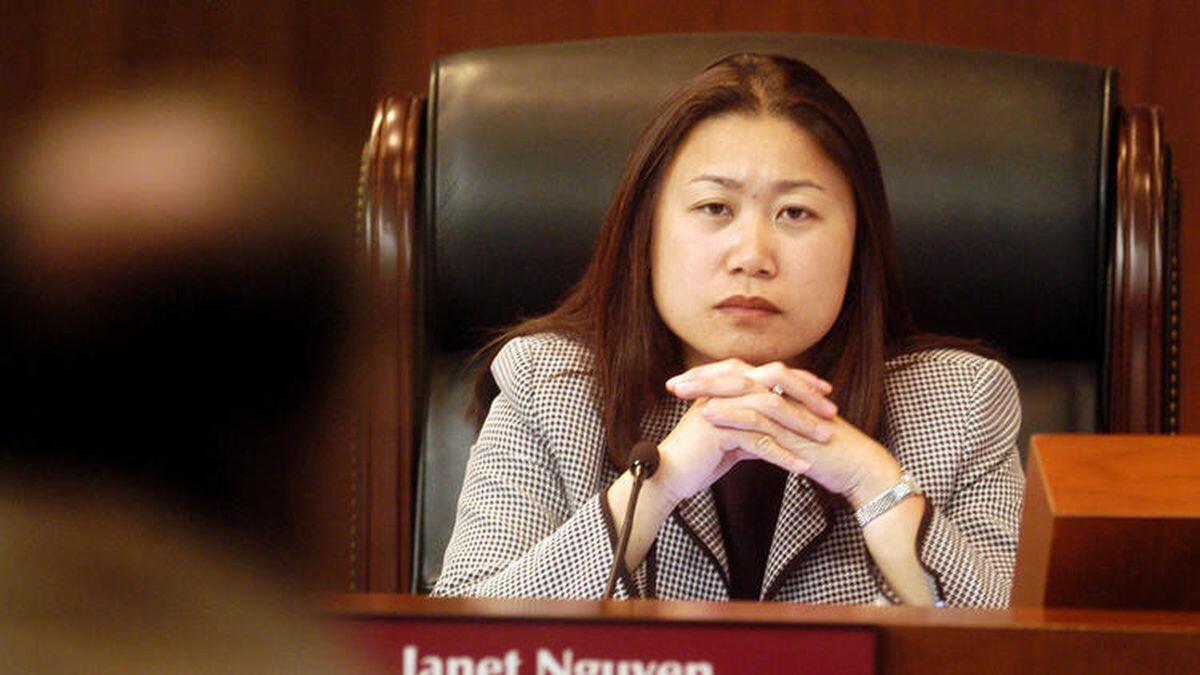
Days after Democrat Tom Umberg took the oath of office as the winner of the state’s 34th Senate District seat, Orange County elections officials said Friday that Republican incumbent Janet Nguyen’s camp has asked for a partial recount of the tally in their portion of the district.
Districtwide, Umberg has 3,088 votes more than Nguyen, a Garden Grove resident, but Nguyen received two more votes than the challenger in Orange County — 118,125 for Nguyen to 118,123 for Umberg.
The district also includes part of Long Beach in Los Angeles County, which put Umberg, a former state assemblyman from Santa Ana, over the top in the Nov. 6 election.
A Westminster voter acting on behalf of Nguyen asked for a recount of 13 precincts in Santa Ana, where Umberg won roughly 80% of the vote, according to Neal Kelley, the Orange County registrar of voters.
“She is targeting precincts where she did not do well,” Kelley said.
Those requesting the recount have been asked to provide a $9,000 deposit by Sunday to cover the possible cost of a limited, machine recount of approximately 17,000 ballots, which Kelley said would take a few days to complete. If a request is made to eventually recount all votes in Orange County, the cost could be about $400,000, Kelley said.
He did not know who was paying for the recount. Representatives said neither the California Republican Party nor the Senate Republican Caucus was paying for it. Nguyen could not be reached for comment Friday.
Umberg’s victory gives Democrats a 29-vote supermajority in the 40-member Senate.
Umberg said in an interview after taking the oath of office Monday that the Democrats’ supermajority carries with it added pressure for members to achieve results in the legislative session that resumes in January.
“When you have a 29-member majority here in the Senate that brings along a great deal of responsibility, there are no excuses for not dealing with some of California’s great challenges, whether its dealing with natural disasters, whether its dealing with infrastructure, whether its dealing with public safety. It’s our responsibility now,” Umberg said.
- Share via
Gavin Newsom to mark inauguration with fundraiser for wildfire victims, ceremony outside Capitol
Gavin Newsom will be sworn in as California’s next governor in an outdoor ceremony on the steps of the Capitol next month.
New details on the Jan. 7 inauguration were released Thursday and suggest a wider range of festivities than the last, no-frills gubernatorial induction.
The day before the inauguration, Newsom and his wife, Jennifer Siebel Newsom, will hold a children’s event at the California State Railroad Museum.
Later that evening, Newsom plans to host a fundraising concert at the Golden 1 Center in Sacramento and donate the proceeds to the California Fire Foundation, a nonprofit dedicated to the families of fallen firefighters and communities affected by the 2017 and 2018 wildfires.
The inauguration ceremony is scheduled for 11 a.m. Jan. 7 on the West Steps of the Capitol. Former Gov. Arnold Schwarzenegger held the last outdoor inauguration outside the Capitol in 2003.
“It will be the honor of a lifetime to take the oath of office as California governor,” said Gov.-elect Newsom. “But it seems appropriate to use this moment to unite as a state — stronger and more resilient than ever — to do whatever we can to ensure all of our fellow Californians, especially those impacted by tragic wildfire, have the opportunity to build a brighter future and pursue their dreams.”
In a much more subdued affair in 2015, Gov. Jerry Brown marked his inauguration by giving a speech in the Assembly chamber and celebrated afterward at a union-sponsored event where he ate a hot dog on the lawn. Brown attended a private reception at the Capitol and a series of parties after his swearing-in ceremony at the Sacramento Memorial Auditorium in 2011.
The inauguration will mark the start of the Newsom era in California political history. The 51-year-old governor-elect is expected to follow his predecessors and use the induction ceremony as an opportunity to lay out his progressive agenda.
- Share via
Civil rights attorney to join Gov.-elect Gavin Newsom’s administration
Gov.-elect Gavin Newsom has hired a civil rights attorney to head legal affairs as he continues to shape the starting roster of his new administration.
Catherine E. Lhamon currently serves as the chair of the U.S. Commission on Civil Rights, a position former President Obama appointed her to in 2016.
As Newsom’s in-house lawyer, a legal affairs secretary traditionally advises the governor on legislation and judicial appointments, crafts guidance for the executive branch and oversees pardons and paroles, among other duties.
Lhamon, a 47-year-old Democrat and native Californian, worked for the American Civil Liberties Union of Southern California for a decade.
Newsom also confirmed Thursday that he chose Anthony Williams, a longtime Capitol staff member, to be his legislative secretary and top liaison with lawmakers.
“I pledged that my administration would reflect not only the best and brightest but the diverse talents of our state and a passion for public service and giving voice to the voiceless – and that’s exactly what Catherine and Anthony represent,” Newsom said in a statement.
The announcement provides a clearer picture of the decision-makers who will lead the Newsom administration.
Newsom previously tapped Ann O’Leary, a longtime policy advisor to former Secretary of State Hillary Clinton, as his chief of staff, and Ana Matosantos, a Sacramento policy and budget consultant, as Cabinet secretary.
- Share via
Gov.-elect Gavin Newsom to hire veteran Capitol staffer as legislative secretary
California Gov.-elect Gavin Newsom is expected to hire a seasoned legislative staffer as his top liaison with the Legislature.
Anthony Williams will serve as Newsom’s legislative secretary, according to sources close to the transition. The move brings Williams, a director of government relations for Boeing Co., back on the state payroll.
Williams was previously policy director and special counsel to former California Senate Pro Tem Darrell Steinberg before going to work for Boeing. He also served as principal consultant to former Senate Pro Tem John Burton.
Legislative secretaries are responsible for working with lawmakers to impose the governor’s will on legislation. Many expected Newsom to hire a veteran Capitol insider like Williams for the job.
Jennifer Wada, Williams’ former partner at a lobbying firm they started in 2007, called him a “perfect fit” to carry out Newsom’s agenda.
“His policy smarts combined with his political savvy will be of great value to the administration, especially at this critical time in California and the nation’s history,” Wada said.
Williams studied political science at UC Davis, received a master’s degree in public policy from Harvard University’s John F. Kennedy School of Government and later attended law school at the University of the Pacific’s McGeorge School of Law.
He holds an ownership stake in the Diplomat Steakhouse, a restaurant that opened next to the Capitol in April.
Williams did not immediately respond to a request for comment.
A spokesman for Newsom declined to comment.
- Share via
How Northern California’s destructive wildfires could exacerbate the state’s housing crisis
Northern California’s recent wildfires have burned homes at a greater pace than developers are building them, deepening a housing shortage that already has left millions struggling to find affordable places to live.
Five large wildfires over the past 14 months, with November’s Camp fire the most devastating, have destroyed nearly 21,000 homes across six counties. That total is equivalent to more than 85% of all the new housing built in those counties over the past decade, according to Construction Industry Research Board building permit statistics.
“We had a housing crisis prior to the fires,” said Bob Raymer, a senior engineer with the California Building Industry Assn. “This only exacerbated the crisis. I can’t even put a measure on it. Just wow.”
- Share via
New proposal would allow California to issue bonds for wildfire prevention efforts
A new bill would allow the state to issue bonds and borrow money from investors to finance projects that reduce wildfire risks in California.
State Sen. Benjamin Allen (D-Santa Monica) introduced the Wildfire, Drought and Flood Protection Bond Act of 2020 as another tool the state can use to offset a pattern of increasingly destructive and deadly blazes.
“This year’s deadly wildfires, on the heels of last year’s catastrophic events and a devastating multi-year drought, clearly demonstrate that the impacts of climate change are here now and we need to be prepared,” Allen said in a statement. “This legislation sets a course to reduce the impacts of rising global temperatures and invest in necessary measures to protect communities.”
Senate Bill 45 gives the state’s director of finance, treasurer and controller the ability to authorize the sale of general obligation bonds to pay for a wide range of projects to retrofit buildings, improve the 911 emergency alert system and restore and protect habitats affected by climate change and wildfires, among other tasks outlined in the bill.
If approved by two-thirds of the California Legislature, the proposal would require voter approval and appear on the 2020 ballot.
Under the bond structure, the state borrows money from investors and pays it back with interest. The total dollar amount of the bond has not yet been determined and is subject to negotiation between the Senate, Assembly and incoming governor’s office.
Voters approved a $4-billion parks bond on the June ballot and another $7.5 billion split across three bond measures to fund housing projects, homelessness prevention and children’s hospitals in November.
- Share via
Sales taxes on diapers and tampons would be eliminated under revived proposals from California lawmakers
After years of trying, two California lawmakers are once again attempting to eliminate sales taxes on diapers and tampons.
Democratic Assemblywomen Lorena Gonzalez Fletcher of San Diego and Cristina Garcia of Bell Gardens have reintroduced bills to exempt purchasers from paying sales tax on the products.
“Every baby needs diapers,” Gonzalez Fletcher said in a statement about Assembly Bill 66. “The fact that we tax diapers is unfair and it’s a burdensome tax that hurts working class and middle class families.”
In 2016, Gov. Jerry Brown vetoed similar efforts from both lawmakers, citing their costs to state and local governments, which were estimated at the time to total around $55 million annually. The pair tried again by pitching tax increases on candy or alcohol to pay for the diaper and tampon sales tax exemptions, but those proposals also failed.
The new measures call for straight repeals of sales taxes on both products without increasing revenue. Garcia said in a statement she’s already spoken with Gov.-elect Gavin Newsom about her proposal, Assembly Bill 31.
“I’m hopeful that Gov.-elect Newsom’s sense of equality will prevail over his predecessor’s,” Garcia said.
- Share via
Legislators will consider abolishing California’s scandal-plagued tax agency
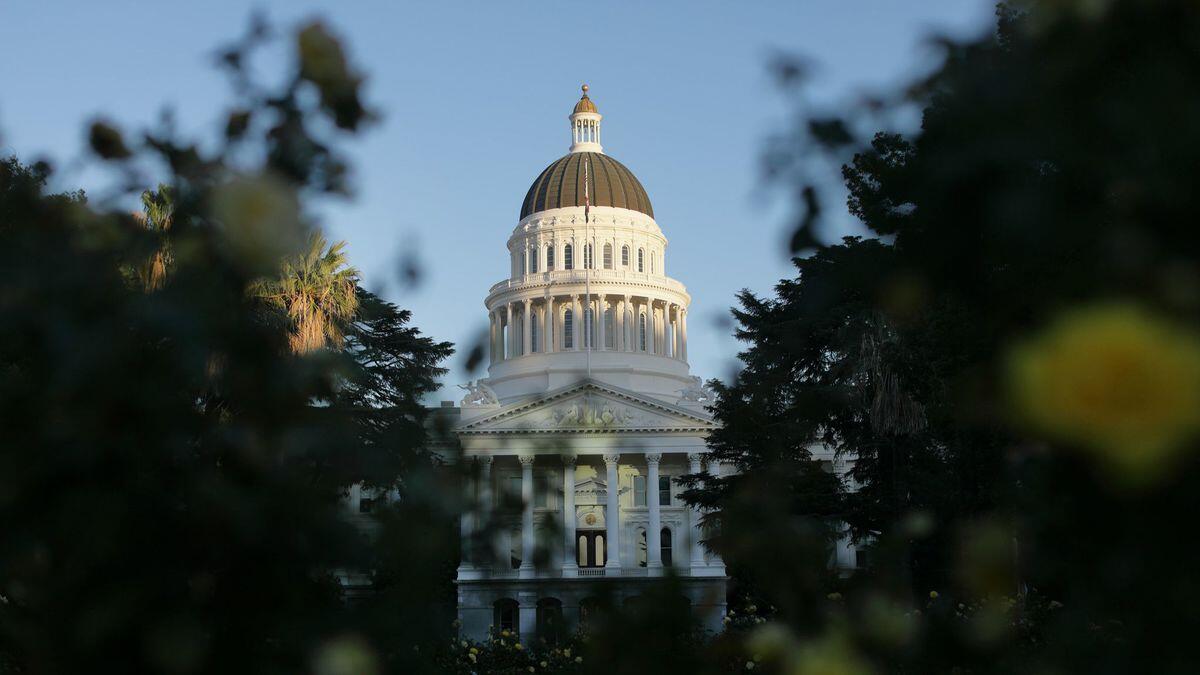
California’s elected tax collection board was troubled by allegations of botched handling of funds, excessive spending on furniture and nepotism before it was stripped of many of its duties last year by Gov. Jerry Brown and the Legislature.
Now, one lawmaker wants to abolish the state Board of Equalization, and shift its remaining duties to an agency of civil service employees.
Assemblyman Adrin Nazarian (D-North Hollywood) introduced legislation on Monday that would ask California voters in 2020 to amend the state Constitution to eliminate the elected board, which was created in 1879.
“The Board of Equalization is a redundant, scandal-plagued office that can be eliminated to save taxpayer’s money and re-direct resources to strengthen the middle class,” Nazarian said Tuesday.
The board is made up of four members elected by districts and who are each paid $151,260 annually, with the state controller serving as a fifth member.
As the only elected tax board in the country, the panel was, until last year, responsible for collecting $60 billion in taxes annually for the state.
But state investigators criticized the board for putting $350 million in sales taxes in the wrong accounts and improperly interfering with decisions to open field offices and transfer staff, some of whom were assigned to duties that promoted the elected officials.
An investigation by the state Personnel Board found the agency suffered from widespread nepotism, with 835 employees, or 17.5% of the office’s workforce, related by blood, adoption or marriage, with several instances of employees living together.
Former Board Chairman Jerome Horton faced criticism in 2016 after the Sacramento Bee reported $118,000 was spent on designer furniture for his office.
Amid various controversies, the governor signed a bill in June 2017 that reduced the state board from 4,800 workers to just 400 employees, transferring most employees to a new California Department of Tax and Fee Administration that collects sales and excise taxes.
The change removed the board’s role of hearing taxpayer appeals and provided it with the narrower job of setting rates for gas taxes and pipeline levies; making sure counties fairly assess property taxes and helping taxpayers with problems.
This year, the board has a budget of $29 million and a staff of 195 people.
- Share via
California lawmakers pitch substantial new spending on low-income housing
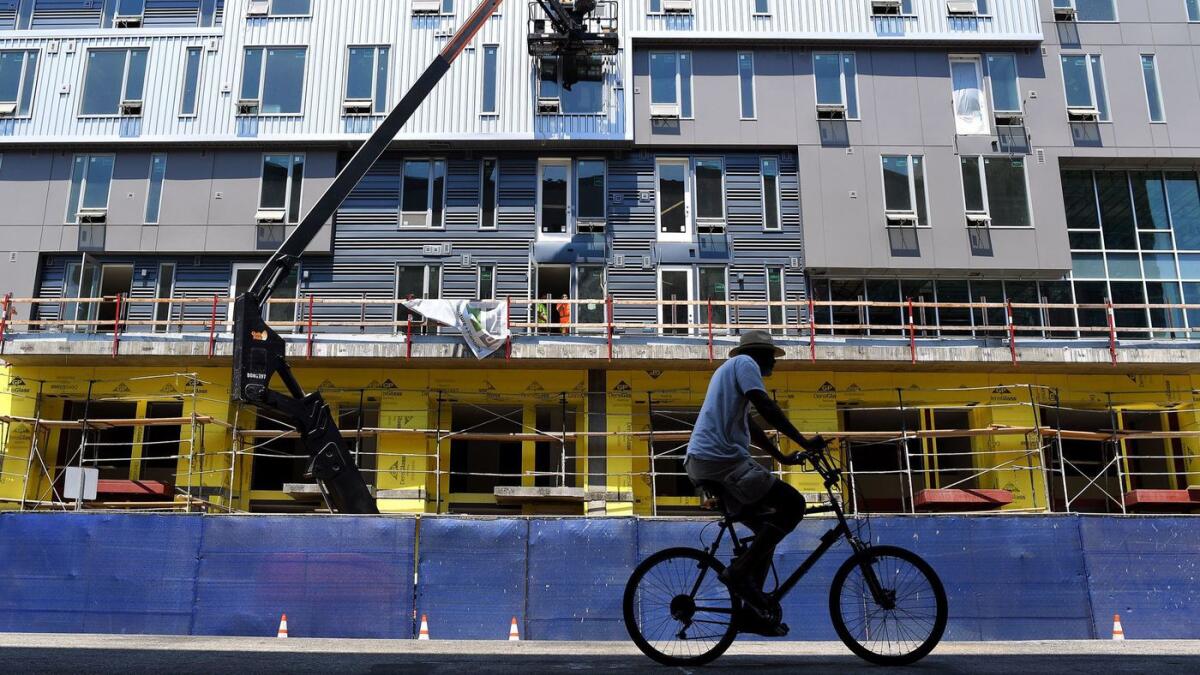
Low-income housing developments in California could receive a continued infusion of public subsidies under proposals unveiled this week by state lawmakers.
Multiple new bills call for new funding for low-income housing through a revival of an urban redevelopment program and by increasing tax credits to fund new projects. Legislators have failed to pass versions of the same measures in years past, but have new hopes because Gov.-elect Gavin Newsom campaigned on spending more money on housing. They also point out the state budget’s bottom line remains strong.
“Our housing crisis is dire and persistent, and our state must be just as aggressive and persistent in order to solve it,” Assemblyman David Chiu (D-San Francisco) said in a statement. “With a new governor and an extraordinary budget surplus, now is the time to make significant, ongoing investments in affordable housing.”
Chiu’s Assembly Bill 10 would increase the state’s allocation of low-income housing tax credits by $500 million — a fivefold increase over the current limit and the figure that Newsom proposed during his gubernatorial campaign. The system allows housing developers to apply to the state for credits that investors buy to lower their own tax payments. Gov. Jerry Brown vetoed an attempt to boost the tax credit in 2015, citing costs to the state budget.
Assembly Bill 11, also from Chiu, would reinstitute a system that allowed cities and counties to sequester property tax dollars generated from growth in designated neighborhoods to use for economic development and affordable housing. Brown spearheaded the elimination of the prior program, known as redevelopment, amid the depths of the state budget crisis in 2011. Chiu’s new bill would require 30% of the money to be set aside for low-income housing projects.
Similar legislation from state Sen. James Beall Jr. (D-San Jose) would set aside up to $200 million a year in property tax dollars for low-income housing.
“Today, we have an opportunity to establish a renewed partnership between the state and cities, with strict accountability measures, to ensure more affordable housing gets built,” Beall said in a statement announcing Senate Bill 5.
Newsom also campaigned on resurrecting a housing financing program similar to redevelopment.
The proposals come after the Legislature and California voters recently approved significant new housing funding. In 2017, lawmakers created a $75 fee on mortgage refinancing and other real estate transactions to generate about $250 million a year to finance housing developments. Last month, voters approved $6 billion in bond funding to help build low-income and homeless housing.
- Share via
Proposed ballot measure would cut California’s inherited property tax breaks
California law gives children who inherit their parents’ homes a tax break that keeps their property taxes low — even if the heirs don’t live there.
The provision, as detailed in an August Los Angeles Times investigation, has allowed celebrities, out-of-state professionals and other wealthy heirs to collect large sums in rental income from their parents’ homes while paying small property tax bills. But under a new plan from a Bay Area lawmaker, that benefit would come to an end.
Sen. Jerry Hill (D-San Mateo) is introducing a ballot measure to require children who receive the state’s property inheritance tax break to live in their parents’ homes. Doing so would rein in what Hill called “abuses” of a policy established more than three decades ago designed to help children retain ownership of family property.
- Share via
California legislator revives bill to boost apartment complexes near transit
A California state senator has revived a major effort to boost homebuilding near transit, a proposal he says is necessary to address the state’s housing affordability and climate change challenges that have only deepened since his initial bill failed earlier this year.
Under the new proposal from Sen. Scott Wiener (D-San Francisco), developers would be allowed to build four- to five-story apartment complexes in neighborhoods surrounding Los Angeles Metro stations, Bay Area Rapid Transit and other rail stops around the state. The legislation would also ease some local restrictions on building homes near frequently used bus stops.
Wiener’s bill follows a similar attempt in the last legislative session that sparked fierce debate over how far the state should impinge on local authority to shape community development amid a housing shortage that’s been estimated in the millions. The previous attempt died in a legislative committee after outcry from local governments, labor groups and advocates for low-income residents.
- Share via
Proposal to require abortion pills at college health centers returns to California Legislature
A California state legislator is reviving an effort to require public universities to provide abortion pills on college campuses after Gov. Jerry Brown vetoed a similar measure earlier this year.
Sen. Connie Leyva (D-Chino) said she believes the proposal has a better shot at becoming law next year under Gov.-elect Gavin Newsom, who publicly supported the idea on the campaign trail.
“I would have reintroduced it even if we still had Gov. Brown [in office] because I think the issue is that important,” Leyva said. “Women should always have access to abortion. That’s their constitutional protected right and it’s woman’s choice.”
Leyva’s Senate Bill 24 requires campus health centers to provide students with abortion pills, a method of terminating a pregnancy up to 10 weeks after conception, beginning in 2023. The Democratic lawmaker has argued since 2017 that some campuses are long distances from Planned Parenthood clinics or other healthcare facilities that provide abortion medication.
Brown vetoed a similar iteration of the proposal last year, calling it unnecessary.
“According to a study sponsored by supporters of this legislation, the average distance to abortion providers in campus communities varies from five to seven miles, not an unreasonable distance,” the governor wrote in his veto message.
Leyva said Monday that Brown got it wrong.
“There are so many campuses where the pill is not close by and even within a mile or two or three, women don’t always have transportation,” she said.
“He’s a guy,” Levya added. “He doesn’t know what it’s like to be pregnant and make that decision.”
- Share via
With bail overhaul in limbo, California lawmaker wants to prevent ‘machine bias’ in deciding which defendants are released
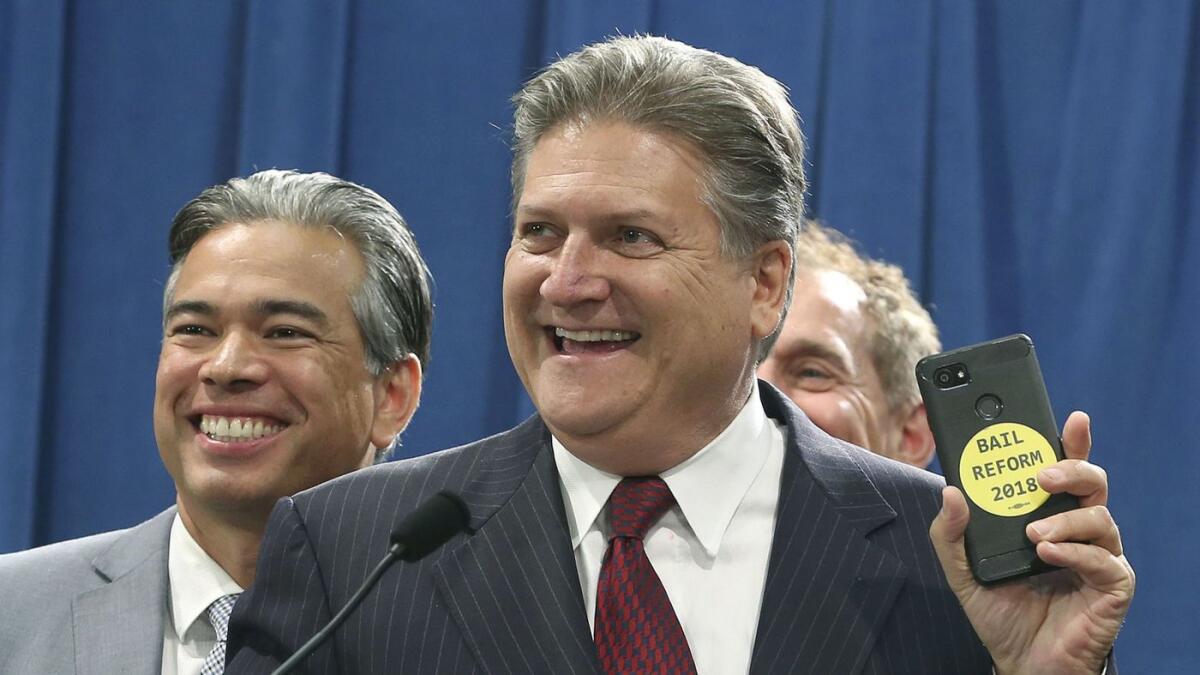
With California’s move to end the cash bail system in limbo, Sen. Bob Hertzberg (D-Van Nuys) says he is looking for other ways to ensure courts are fair in determining whether criminal defendants are fit for release before trial.
On the first day of the 2019 legislative session, Hertzberg introduced a bill that would require the state to collect data and evaluate any so-called “risk assessment tools” already employed by as many as 49 counties across the state. The tools, or tech analyses, are used to evaluate people who have been arrested to determine whether, and under what conditions, they should be released.
But judges and court officials can insert data into the systems that can lead the software to draw improper, biased conclusions if not properly monitored, advocates say. Hertzberg’s new proposal, Senate Bill 36, would require counties to report how they use the systems in an attempt to prevent that from happening.
It comes after the historic bail overhaul legislation he co-wrote with Assemblyman Rob Bonta (D-Oakland) could be put on hold, as the bail industry has submitted more than enough signatures required for a statewide referendum on the law in 2020.
The new law signed by Gov. Jerry Brown in August would require all counties to establish their own pretrial services agencies and use risk assessment tools. But criminal justice and civil rights groups argued the legislation provided little oversight to guard against “machine bias.” It was to go into effect in 2019.
- Share via
California lawmakers denounce Trump administration proposal to restrict green cards
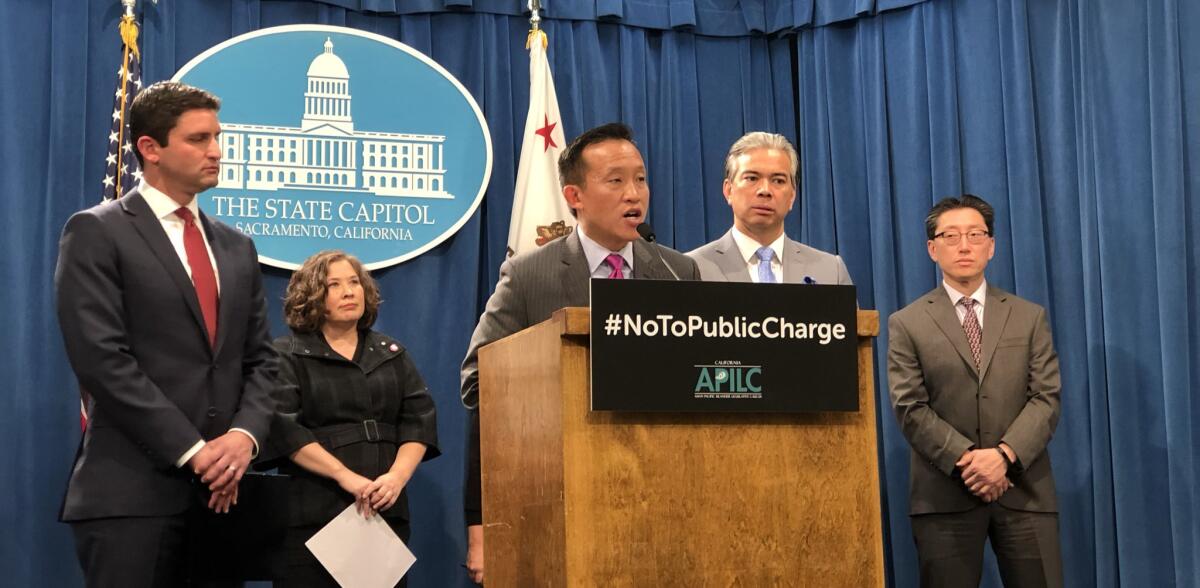
California lawmakers on Monday denounced a federal proposal that would restrict green cards for those likely to receive public assistance, calling it a “xenophobic,” “classist” and “racist” plan to target the state’s most vulnerable immigrant families.
Immigrants who rely on public benefits for food, housing and medical care could be denied green cards under the new rules put forth this fall by the Trump administration in an attempt to limit family-based “chain migration.” The proposal was part of wider efforts by the Trump administration to further restrict legal immigration.
“Trump’s latest anti-immigrant move shows again how heartless and un-American this administration has been; a move that forces immigrant families to make impossible choices,” said Assemblyman David Chiu (D-San Francisco), chairman of the Asian Pacific Islander Legislative Caucus.
It’s unclear how many people the proposal could affect in California, a state that is home to roughly 2.3 million people in the country illegally. But news of the so-called “public charge rule” has already led immigrants to leave Medi-Cal; the state’s food stamp program, CalFresh; and the Women, Infants and Children nutrition assistance program, advocates said.
Roughly 1.4 million Asian Pacific Islander immigrants alone are among the families that use Medicaid or the Children’s Health Insurance Program, according to state officials.
Members of the Asian Pacific Islander, Latino and Jewish legislative caucuses on Monday planned to introduce a resolution to condemn the federal rule and are urging residents to oppose it during the public comment period through Dec. 10.
- Share via
State senator wants to eliminate California Constitution obstacle to low-income housing
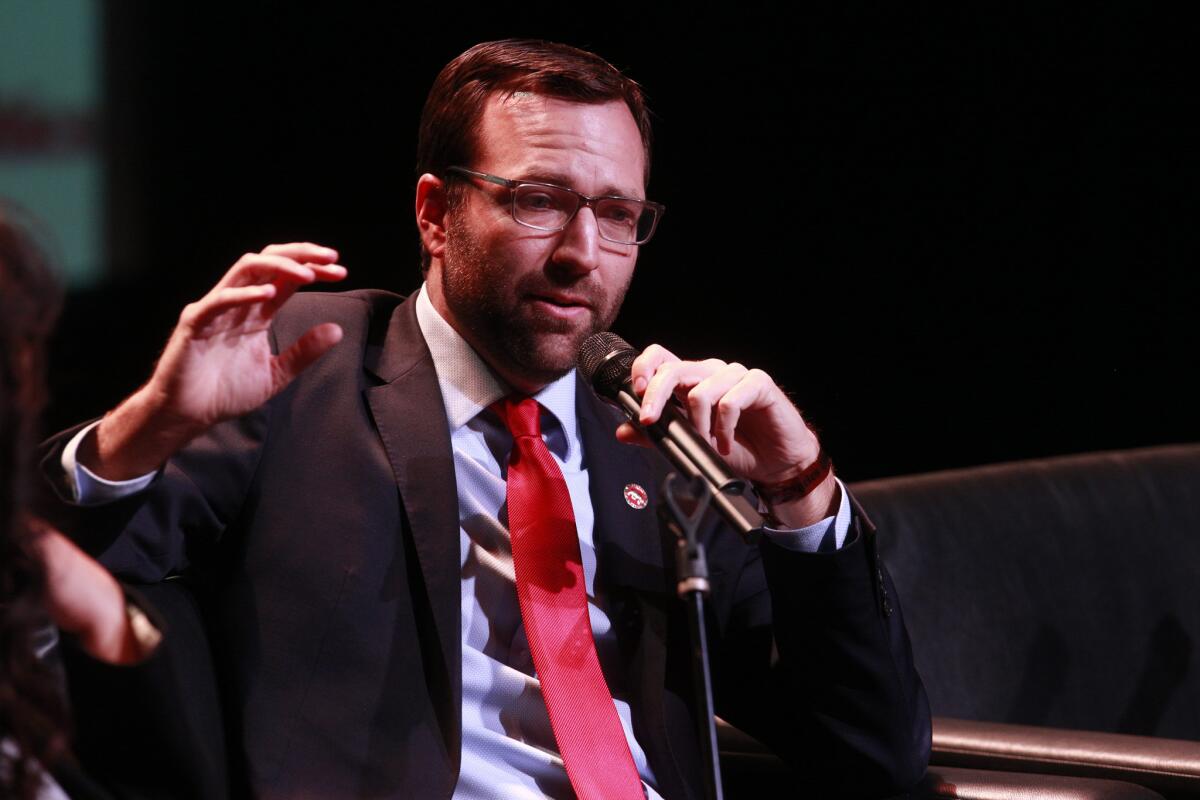
A Los Angeles-area lawmaker is proposing a 2020 ballot measure that would remove from the California Constitution a provision that makes it harder to build low-income housing.
Sen. Ben Allen (D-Santa Monica) wants to eliminate Article 34 of the state Constitution, which requires a citywide public vote before new low-income housing projects that receive public funding are built. The provision was added to the Constitution through a ballot initiative in 1950, and Allen said it was a relic in need of repeal.
“The fact that this particular type of housing was subject to this additional requirement really does look pretty nefarious,” Allen said. “I think it’s reflective of old-school values that we’ve moved past.”
Over the years, legal interpretations of Article 34 and court rulings have allowed some cities and counties to work around its provisions, including seeking voter approval for a specific number of low-income housing units without immediately identifying their location. For instance, the city of Los Angeles passed its most recent Article 34-compliant ballot measure in 2008 to ease the public financing of 52,000 low-income homes.
Despite these workarounds, complying with Article 34 can add between $10,000 and $80,000 to the cost of building a low-income home, according to the California Department of Housing and Community Development.
The city of Los Angeles is one of the principal supporters of Allen’s ballot measure. Mayor Eric Garcetti said the repeal of Article 34 would help eliminate housing discrimination from the state Constitution.
“L.A. fought for — and won — billions of new affordable housing dollars in the last three years, but Article 34 inflicts unnecessary and costly burdens on cities, delaying the construction of housing in the communities we need it most,” he said in a statement.
Allen’s bill requires the approval of two-thirds of both houses of the Legislature for it to be placed on the March or November 2020 ballot.
For the record, 5:46 p.m.: An earlier version of this post said the governor must sign a constitutional amendment for it to appear on the ballot. He does not.
- Share via
California’s new Legislature will look a lot like the old one — and that’s just what voters ordered
A political transformation of the California Legislature takes an important leap forward this week, one that feels a little like a blast from the past: The era of long-tenured lawmakers is back.
When 120 legislators take the oath of office on Monday for a new two-year session, there will be fewer incoming members among their ranks than after any election since 1988. The change is most obvious in the Assembly, where only eight new lawmakers will be sworn in — compared with 26 newcomers in 2016. And it’s just what voters ordered when they loosened legislative term limits six years ago.
The original term limits were enacted in 1990 as backers of Proposition 140 accused “career politicians” in their statewide ballot argument of having “cozy relationships with special interests.” What voters created that November was, at the time, one of the nation’s strictest policies on legislative service. A lawmaker could serve no more than six years in the Assembly or eight in the Senate — 14 years of total time in elected office if choosing to switch from one chamber to the other.
- Share via
Capitol veteran Erika Contreras to become top executive in California Senate
The new state Legislative session will see a change in the upper house’s top executive position, with Capitol veteran Erika Contreras nominated Friday to become secretary of the state Senate.
Contreras has been the chief of staff for Sen. Ricardo Lara (D-Bell Gardens) since 2010 and fills a post being vacated at the end of December by Daniel Alvarez, who is retiring after more than 32 years in state government.
“Erika is deeply familiar with the inner workings of the Senate and has a profound appreciation for our traditions,” said Senate President Pro Tem Toni Atkins (D-San Diego), who introduced a resolution expected to be approved next week by the Senate. “I’m confident she has the skills and temperament to guide this chamber into the future.”
The secretary of the Senate is the chief parliamentarian and keeper of legislative records, overseeing the drafting of bills and their presentation to the governor. The post is also the top executive officer of the Senate, in charge of a staff of 150 people and the day-to-day administration of the house.
Contreras, who graduated from UC Santa Barbara, was born in Aguascalientes, Mexico, and raised in the San Fernando Valley, according to Atkins’ office. Her family was granted legal residency following the Immigration Reform and Control Act of 1986, and she later earned her citizenship.
- Share via
California housing crisis podcast: what mayors can do about homelessness
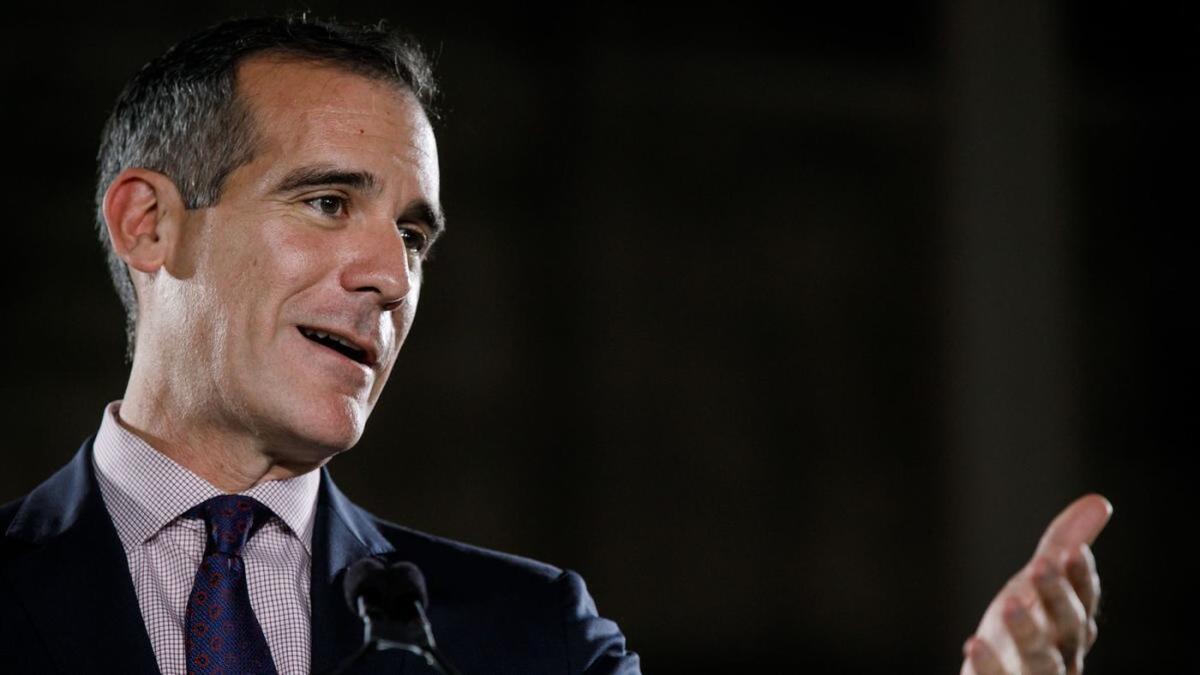
In the past few years, homeless populations across California have risen dramatically and nowhere more so than in the state’s largest cities.
On this episode of “Gimme Shelter: The California Housing Crisis Podcast,” we play excerpts from a forum held earlier this month with big city mayors talking about how they’re addressing the issue and what else needs to be done. On the panel, which was moderated by CALMatters’ Laurel Rosenhall, was Los Angeles Mayor Eric Garcetti, San Diego Mayor Kevin Faulconer, Oakland Mayor Libby Schaaf and Sacramento Mayor Darrell Steinberg.
We also talk to former Houston Mayor Annise Parker about her widely praised efforts to reduce homelessness in her city during her tenure and how Houston’s different laws for home building — the city has no zoning rules — affects housing affordability there.
“Gimme Shelter,” a biweekly podcast that looks at why it’s so expensive to live in California and what the state can do about it, features Liam Dillon, who covers housing affordability issues for the Los Angeles Times’ Sacramento bureau, and Matt Levin, data and housing reporter for CALmatters.
You can subscribe to “Gimme Shelter” on iTunes, Stitcher, Soundcloud, Google Play and Overcast.
- Share via
California paves way for possible petition drive for initiative that would cancel bullet train
The group behind the failed gas-tax repeal effort was given state approval Thursday to begin collecting signatures for a new initiative to cancel the high-speed rail project and revamp state transportation funding.
The initiative was proposed by former San Diego City Council member and radio host Carl DeMaio before the November election as an answer to opponents of Proposition 6, which would have repealed an increase in the state gas tax but was rejected by voters.
The new initiative would shift about $10 billion in state revenues from state and local non-transportation programs to local transportation funds, resulting in potential deep cuts to general fund revenue used for other state services, according to an analysis released Thursday by state Legislative Analyst Mac Taylor.
The initiative would also end funding for the bullet train project, cutting off tens of billions of dollars needed to complete the high-speed rail system, Taylor said.
DeMaio said his coalition was still discussing options, including a petition drive to qualify the proposal for the 2020 ballot.
The title and summary for the initiative were issued Thursday by the state attorney general’s office, drawing a complaint from DeMaio that the title is “misleading.”
The title that would be on petitions if they are circulated would be “Removes responsibility and funding for state highway construction and maintenance from state. Transfers such responsibility and funding to individual, local governments. Ends state high speed rail project.”
“The primary purpose of our initiative is to lockbox 100% of the gas tax to road repairs, but that has been explicitly removed from the title,” DeMaio said.
DeMaio previously said the title for Proposition 6 was misleading
- Share via
California lawmakers propose ban on sale of flavored tobacco products, including those used in e-cigarettes

Six California legislators proposed Thursday to ban the sale of flavored tobacco products — including those used in electronic cigarettes — in retail stores and vending machines in the state, citing concern over a steep increase in nicotine use among youths.
The lawmakers said they would introduce such a measure when the Legislature convenes next week, and that it would also impose age verification requirements for online sales of tobacco products.
“We must stop the appalling epidemic of e-cigarette use by youths,” said Sen. Jerry Hill (D-San Mateo), who is co-authoring the bill with others including Democratic Sens. Anthony Portantino of La Cañada Flintridge and Connie Leyva of Chino.
“Enticed by fruit, candy and other appealing flavors, high school and middle school students throughout the U.S. are vaping in record numbers,” Hill added.
The measure would also ban retail sales of menthol cigarettes.
The proposal comes a few days after the e-cigarette company Juul announced it would phase out some of its flavors and put in place tougher age restrictions. Juul was under pressure from the U.S. Food and Drug Administration, which had directed it to provide evidence that its products were not being marketed to underage consumers.
The California lawmakers voiced alarm about a large increase in e-cigarette use by minors as detailed in a report this month by the FDA and the U.S. Centers for Disease Control and Prevention.
The report said some 3.6 million middle and high school students are using e-cigarettes, a 78% increase from the year before among high school students and a 48% jump by middle school students.
The proposal drew concerns Thursday from Gregory Conley, president of the American Vaping Assn., a nonprofit group that advocates for what it calls sensible regulation.
“While decreasing youth usage of all nicotine products is a sound goal, such measures should not come at the expense of the health and lives of adult smokers,” Conley said. “Multiple studies have shown that flavors in smoke-free nicotine products are critical to helping smokers quit.”
The proposed legislation is supported by groups including the American Heart Assn., the American Lung Assn. in California and the American Cancer Society Action Network.
“Menthol, candy and fruit flavored tobacco products are a key part of the tobacco industry’s strategy to bait youth into becoming tomorrow’s addicts,” said Tim Gibbs, a leader of the action network.
- Share via
Gov.-elect Gavin Newsom calls for California Democratic Party chairman to resign over sexual misconduct allegations
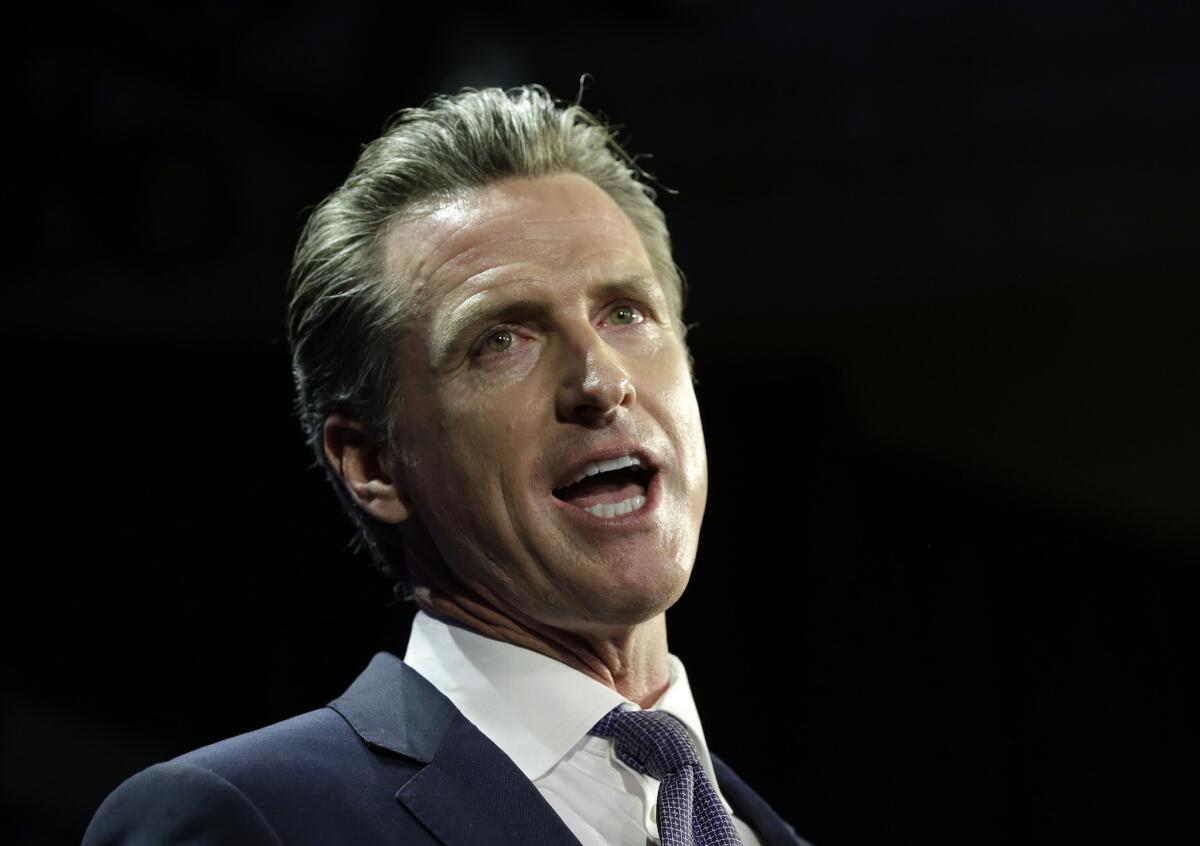
Gov.-elect Gavin Newsom is calling for the chairman of the California Democratic Party to resign in light of “very serious” sexual harassment allegations against him.
Newsom requested that Eric Bauman step down one day after The Times reported that 10 party staff members and political activists said the chairman made crude sexual comments and engaged in unwanted touching or physical intimidation. In response to the story, Bauman said he planned to seek treatment for health issues and alcohol use.
“Sexual harassment shouldn’t be tolerated — no person or party, no matter how powerful, is above accountability,” Nathan Click, a spokesman for Newsom, said on Thursday. “The governor-elect believes the investigation should move forward and the victims should be heard. But given the numerous detailed, severe and corroborated allegations reported by The Times, he believes the best course of action for the party is for the chair to resign.”
State Senate President Pro Tem Toni Atkins (D-San Diego) also called for Bauman to step down.
“In light of the volume and severity of the allegations, it is in the best interest of the Democratic Party for Eric Bauman to resign,” Atkins said in a statement. “The most important thing right now is that the victims receive the support and counseling that they need.”
A spokesman for Assembly Speaker Anthony Rendon (D-Lakewood) said he would call for Bauman to resign if an investigation by the state party confirms the allegations.
“While the speaker is very concerned about the allegations against Mr. Bauman, he believes that due process is an important part of any investigation,” said John Casey, a spokesman for Rendon.
Daraka Larimore-Hall, a vice chairman of the state party, initially called for Bauman to resign last week after speaking with those who had allegations against the party leader. Bauman took a leave of absence Monday as the party investigates the claims. Alexandra “Alex” Gallardo Rooker, one of the state party’s co-chairs, temporarily took over Bauman’s duties.
- Share via
As California Republicans confront a congressional wipeout, GOP leader Kevin McCarthy faces a reckoning
When the House voted to repeal the Affordable Care Act, Kevin McCarthy trooped with other Republican lawmakers to a splashy Rose Garden celebration, smiling alongside President Trump as they celebrated the moment.
As majority leader, McCarthy had helped round up the votes to narrowly pass the hard-fought legislation, convincing 13 other California Republicans to go along, even though several faced tough reelection fights.
Fewer than half will be returning in January.
- Share via
Assemblywoman Cristina Garcia faces ‘remedial action’ for violating sexual harassment policy, officials say
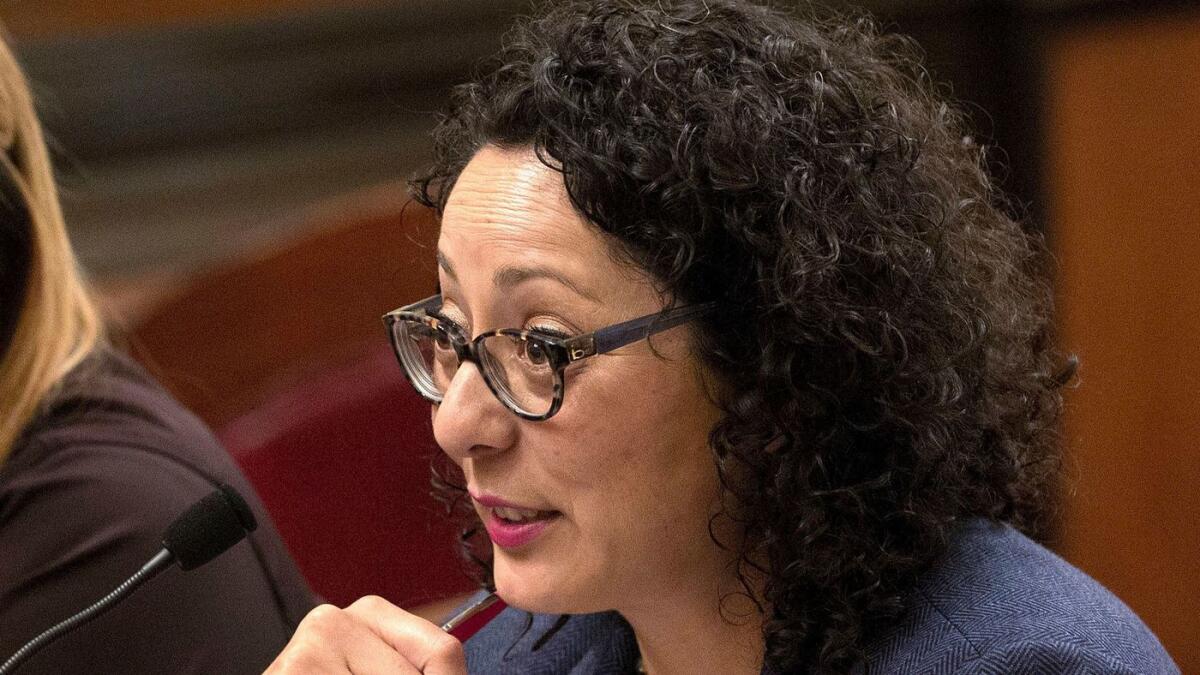
Assemblywoman Cristina Garcia (D-Bell Gardens) was “overly familiar” with a state employee during a 2014 legislative softball game, in violation of the Assembly’s sexual harassment policy, according to an investigative report made public Wednesday.
Other allegations made by Assembly aide Daniel Fierro, including accusations that Garcia touched his genitals and that she retaliated against him after he sought a consultant contract with a school district, were not substantiated by the investigation.
Investigators found “the preponderance of the evidence supported a finding that Assemblymember Cristina Garcia, while in a state of inebriation, encountered Mr. Fierro in the dugout of the 2014 legislative softball game, grabbed his arm for support, put her hand on his back, and was overly familiar with him in a way that she would not have been had she been sober,” said a letter from John T. Kennedy, a private attorney whose law firm represented the Assembly during the investigation.
The investigation was conducted by private attorney Amy Oppenheimer.
“However, a preponderance of the evidence did not support findings that Assemblymember Cristina Garcia touched Mr. Fierro on his buttock or genitals, or that this was a sexual encounter,” Kennedy added.
As a result of the findings, he added, “appropriate remedial action designed to prevent future similar conduct by Assemblymember Cristina Garcia will be imposed.”
Earlier this month, the state rejected a $1-million legal claim for damages by Fierro that alleged Garcia retaliated against him for accusing her of harassment. A legal claim is required to be submitted before a lawsuit can be filed against the state.
“It’s appalling that the Assembly would take it upon itself to substantiate the substance of the complaint and then decide for itself what is sexual in nature and what is not,” Fierro said Wednesday. “This is a blow to victims’ rights.”
The latest findings are a follow-up to an initial investigation that concluded Garcia had “commonly and pervasively” used vulgar language. The original investigation also found Garcia asked staff to run personal errands and that she had “disparaged other elected officials.”
The new report was issued after additional witnesses were interviewed.
Garcia, who before Fierro’s allegations was a leader of the #MeToo movement in Sacramento against sexual harassment, issued a statement Wednesday that said she is “pleased” that the investigation has concluded, though she disagrees with the previous findings that led to her being removed from legislative committees.
“I again apologize if language I used in the past made anyone feel uncomfortable,” Garcia said. “I look forward to continuing to serve my constituents as an advocate for good government, environmental justice, and on women’s issues.”
Garcia was reelected Nov. 6 to her fourth, two-year term, receiving 70% of the vote after a challenge from Republican Mike Simpfenderfer.
She is one of several state officials to be caught up in allegations of sexual misconduct in the last year, with resignations submitted by Democratic Assemblymen Raul Bocanegra and Matt Dababneh and state Sen. Tony Mendoza.
With the Legislature set to begin the new session Monday, it remains unclear whether Garcia will be able to resume her membership in Assembly committees from which she was temporarily removed by Assembly Speaker Anthony Rendon earlier this year.
“It has not yet been determined what action will be taken in regard to her committee assignments,” Kevin Liao, a spokesman for Rendon, said on Friday.
Members who are removed from committees are relegated to voting on bills when they come to the floor.
As for the “remedial action” ordered this week in a letter from Rendon, Liao noted that when an initial investigation was concluded in May, the Speaker required Garcia to complete sensitivity training conducted by an outside expert, participate in sessions with an employee assistance program counselor and receive individual training on the Assembly’s existing sexual harassment and violence prevention policy.
“The letter this week says additional remedial action may be taken; those exact actions have not been determined,” Liao added.
Nov. 29, 2:59 p.m.: This article was updated with information about a claim for damages by Oscar Fierro.
This article was originally published Nov. 28 at 9:17 p.m. It was updated on Nov. 30 at 4 pm to provide more information on Garcia’s future following her re-election.
-------
FOR THE RECORD
Nov. 29, 2:39 p.m.: A previous version of this article said that the investigation was conducted by John T. Kennedy’s law firm. That firm represented the Assembly in the case, but the investigation was conducted by private attorney Amy Oppenheimer.
-------
- Share via
New California gun tax proposed following Borderline Bar and Grill rampage
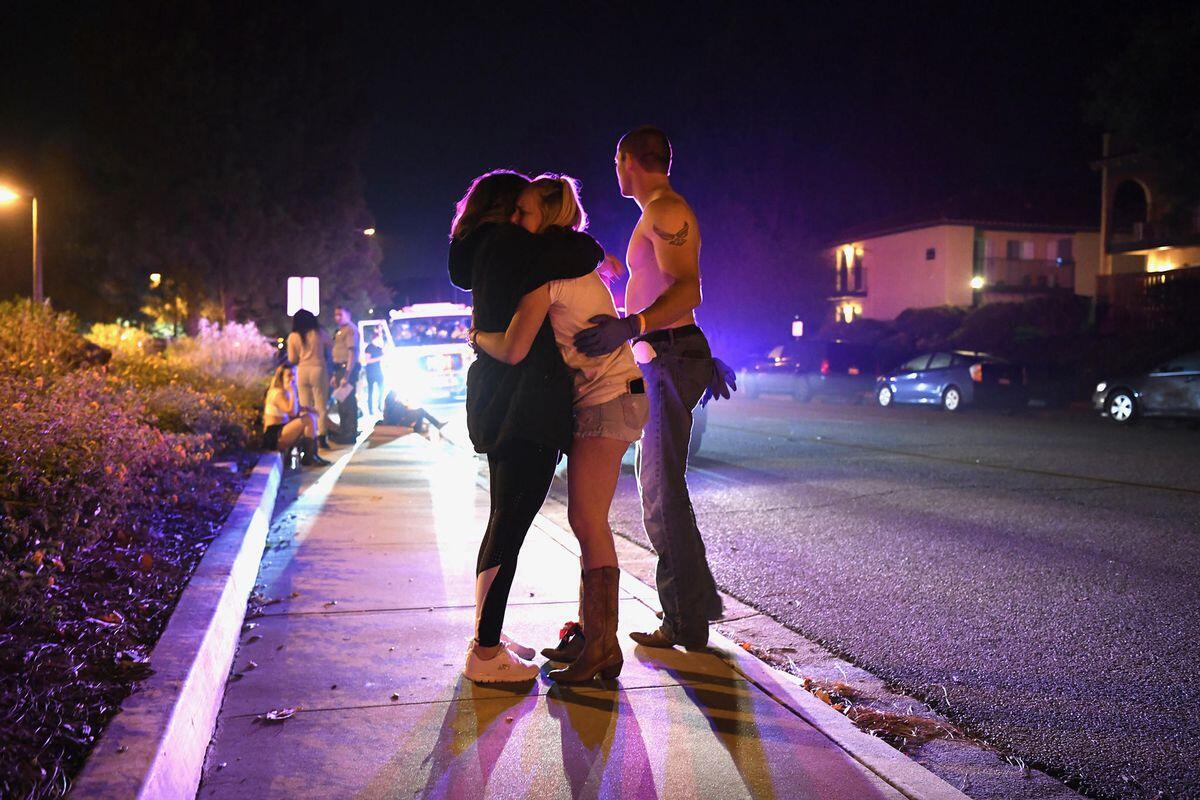
Three weeks after a mass shooting killed 12 people at a Thousand Oaks bar, a state lawmaker on Wednesday proposed a new gun tax to fund violence prevention programs in California.
Assemblyman Marc Levine (D-San Rafael) said he would introduce a bill to tax the sale of semiautomatic firearms, such as the .45-caliber Glock handgun used Nov. 7 in the deadly shooting at the Borderline Bar and Grill.
Levine cited the Thousand Oaks shooting this month and another last month that killed 11 people at a Pittsburgh synagogue as recent examples of gun violence that require more action, but said he had been trying to reduce shootings for years.
“The goal is fewer gun deaths,” Levine said. “The gun tax will support the kind of interventions that make gun violence less likely in the first place, which is exactly what we need to do.”
The proposal was criticized by Craig J. DeLuz, a spokesman for the Firearms Policy Coalition, which often opposes gun control laws.
“Taxing firearms is akin to a poll tax,” DeLuz said. “It’s fundamentally wrong to tax civil rights just because they are disfavored.”
Levine has not decided how large a tax to seek, but if California charges $25 in tax on each purchase as other jurisdictions have done, it could raise more than $5 million annually for the California Violence Intervention and Prevention Program.
About 900,000 firearms were purchased in California annually in recent years and the vast majority would be subject to the tax. Levine would exclude hunting rifles.
Last year, the program awarded about $8 million in grants to communities hit by gun violence for prevention programs.
California already has some of the toughest gun control laws in the country, including a Levine measure approved in 2016 that expanded a ban on assault rifles to include semiautomatic guns that have “bullet buttons” that allow quick removal and replacement of ammunition magazines.
- Share via
PG&E offers state little explanation about why it didn’t shut off power before Paradise wildfire
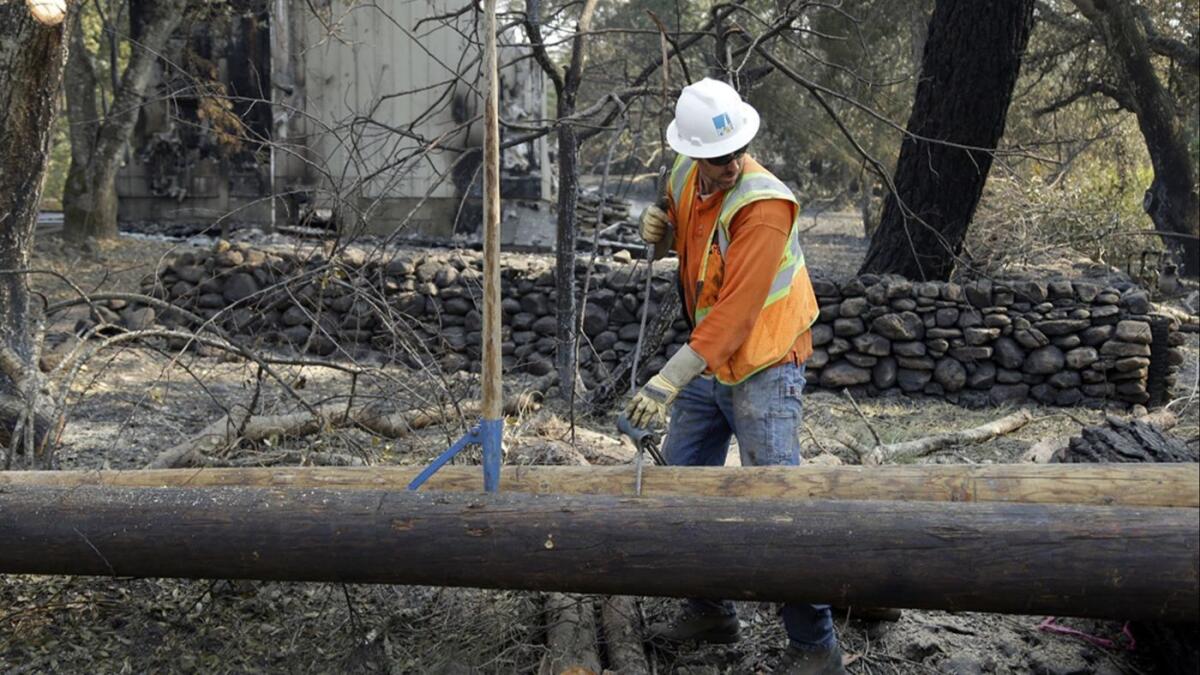
In a report filed with state regulators Tuesday, Pacific Gas & Electric Co. offered little explanation about why it failed to shut off power in Butte County before the deadliest wildfire in California history.
The utility giant, under pressure to stop its power lines from sparking wildfires, adopted a plan this fall to turn off power during high-risk weather conditions. Days before the Camp fire killed at least 88 people, PG&E warned customers that it might cut electricity in Paradise and other fire-prone areas of the Sierra foothills on Nov. 8. But the company ultimately canceled plans for the shut-off.
“The forecasted conditions didn’t meet the criteria to initiate a public safety power shutoff,” said James Noonan, a spokesman for PG&E.
The California Public Utilities Commission requires utilities to file reports 10 days after customers are warned about or experience planned shut-offs. But a resolution adopted by the agency suggests a utility is only required to provide an explanation if it cuts power.
The commission did not respond to questions about the policy Tuesday.
The cause of the fire remains under investigation and it’s unclear whether a planned outage would have prevented the devastation. PG&E reported problems with a high-voltage transmission line and a less-powerful circuit shortly before and after the fire started.
PG&E’s 14-page report says it began sending shut-off warnings on Nov. 6 to 70,000 customers located in nine counties, including Butte, “where the forecasted weather and wildfire potential indicated a high likelihood of impacts to the company’s equipment and facilities.”
The company said it adjusted the warning to about 63,000 customers in eight counties on Nov. 7 because weather conditions “were nearing but not reaching forecasted levels that would warrant temporarily turning off power for customer safety.”
PG&E did not offer any further explanation in the report for its lack of action overnight on Nov. 7 or early Nov. 8. A weather station near Paradise clocked wind gusts of 52 mph hours before the fire was reported at 6:29 a.m.
Hours after the fire began, winds decreased and conditions no longer met the company’s criteria for a shut-off by 1 p.m. on Nov. 8, PG&E said in the report.
“Based on the forecasted information, PG&E no longer anticipated a possible need to de-energize,” the report states. “PG&E immediately informed all stakeholders of the change in conditions and that no lines would be proactively de-energized.”
The commission is expected to review the report and determine whether an investigation is warranted.
In other questions about PG&E’s actions, a federal judge on Tuesday asked the company to explain its role in the Camp fire and whether the utility may have violated the terms of its criminal probation from the San Bruno, Calif., pipeline blast.
Nearly two years ago, a U.S. District Court judge sentenced PG&E to probation and ordered the company to pay a $3-million fine after an underground pipeline burst in the San Francisco Bay Area city and killed eight residents. As part of the probation, PG&E was barred from committing any local, state or federal crimes.
A judge issued a new order Tuesday giving PG&E and an independent monitor until the end of the year to explain its involvement in the Camp fire and other California wildfires since early 2017.
- Share via
Gov. Jerry Brown asks California Supreme Court to keep pardon records sealed
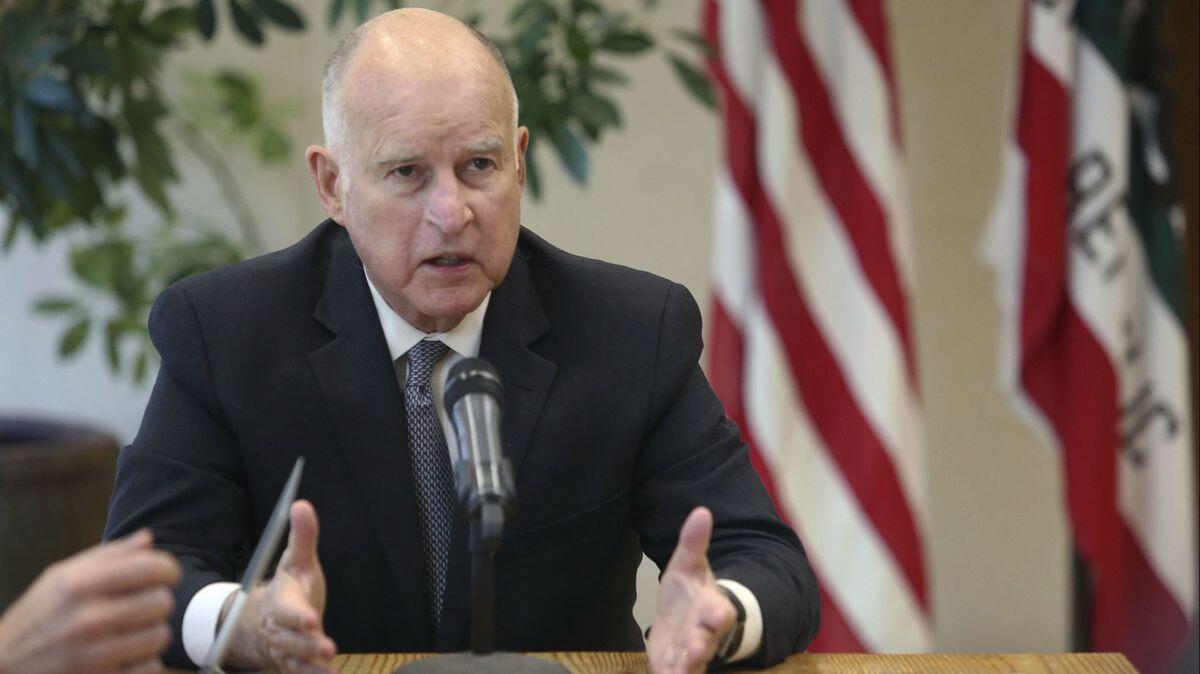
Gov. Jerry Brown has asked the California Supreme Court to keep records sealed that involve his pardon of former state Sen. Roderick Wright, arguing confidentiality is consistent with historic practice and is supported by state law.
A court filing was submitted late Monday by Peter A. Krause, the governor’s legal secretary, after the nonpartisan First Amendment Coalition last week petitioned the court to unseal records filed by the governor’s office, including a review of the pardon application and letters that supported clemency for Wright.
“Courts have repeatedly recognized an executive privilege that protects the governor’s decision-making process from public scrutiny,” the filing says.
Krause said confidentiality is particularly important for clemency application records “which contain highly sensitive, and potentially embarrassing materials” about the applicant as well as candid views of victims and prosecutors.
Making records public would have a “chilling effect” on the willingness of witnesses to participate, Krause said in the filing.
The coalition’s executive director, David Snyder, asked the court last week to unseal the Wright records and those for all pardon cases considered by the governor.
“We believe the state and federal constitution prohibit this practice — and there is an intense public interest in seeing these records, in particular as they pertain to an elected official convicted of serious felonies,” Snyder said.
On Wednesday, Brown pardoned Wright, who resigned in 2014 after being convicted of felony charges including perjury and voter fraud for lying about living in his legislative district.
In his pardon of Wright, Brown wrote: “He has shown that since his release from custody, he has lived an honest and upright life, exhibited good moral character, and conducted himself as a law abiding citizen.”
Brown’s office released a letter to the court giving the rationale for a pardon, but declined to make available investigative reports on Wright’s application or letters of support from the public.
The court responded to the coalition’s formal request with a letter to Krause asking him to identify which records the governor wanted to keep sealed and “all authorities relied upon for any claim of confidentiality, with an explanation of how these authorities justify withholding public access.”
The letter to Krause was signed by Jorge E. Navarrete, the court clerk.
- Share via
California falling short on climate change goals because driving is increasing, report finds

California is failing to meet its goals to reduce vehicle travel, imperiling efforts to achieve ambitious greenhouse gas reduction targets, according to a state report released Monday.
The report by the California Air Resources Board, the state’s climate change regulator, found that carbon emissions per capita from vehicle travel in California were increasing. That’s despite a decade-old law that required regions across the state to plan for housing growth so that people could live closer to where they work or public transit and reduce their time on the state’s roadways.
“California — at the state, regional and local levels — has not yet gone far enough in making the systemic and structural changes to how we build and invest in communities that are needed to meet state climate goals,” the report said.
The state’s inability to curb the amount of driving puts it at risk of failing to meet overall climate change goals. The state hit its 2020 goal for reducing emissions below 1990 levels four years in advance largely because of major improvements to the electricity grid. But climate regulators warned that the state’s goal to cut emissions 40% below 1990 levels by 2030 won’t be met without a major turnaround in the transportation sector.
Dramatically increasing the amount of electric vehicles on the road will not solve the problem, the report said. Even if new car sales of zero-emission vehicles increase nearly tenfold from today, the state would still need to reduce vehicle miles traveled per capita by 25% to meet the 2030 goal.
“California will not achieve the necessary greenhouse gas emissions reductions to meet mandates for 2030 and beyond without significant changes to how communities and transportation systems are planned, funded and built,” the report said.
Such changes will not be simple. This year, state lawmakers rejected a bill that would have allowed for the construction of more apartment complexes and other higher-density housing near transit stops across the state. The bill sparked a fierce debate over the state taking a bigger role in development decisions that have largely been controlled by cities and counties.
Climate regulators recommended in the report that the state create a new inter-agency body made up of state, regional and local elected officials to determine how to plan communities in ways that would help meet emission reduction targets.
- Share via
California Democratic Party chairman takes leave of absence following sexual misconduct allegations
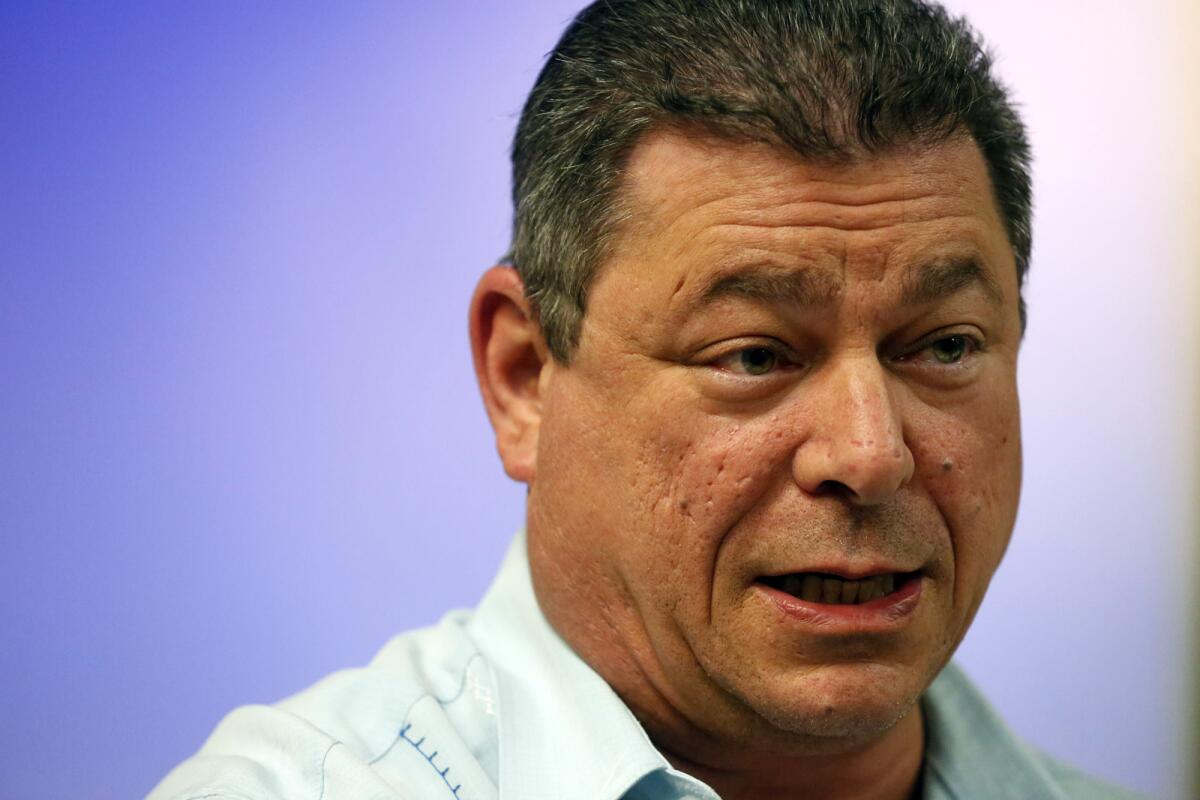
The California Democratic Party announced on Monday that its chairman, Eric Bauman, would take a leave of absence while he is investigated for unspecified allegations of sexual misconduct.
The leave begins immediately and will continue until the conclusion of an inquiry by an outside counsel, party spokesman Mike Roth said in a statement released Monday evening.
“Chair Bauman believes this decision is the best way to ensure the independence and integrity of the process,” Roth said of the party’s leader, who is from Los Angeles. “The party is confident that the procedures in place will allow for all parties to come forward freely and provide for a thorough and complete review.”
Last week, Daraka Larimore-Hall, a vice chairman of the state party, sent a letter to California Democratic Party leadership calling for Bauman’s removal. Larimore-Hall said he did so after speaking to two alleged victims and that their stories “illustrate a clear and escalating pattern of Chairman Bauman’s horrific and dehumanizing behavior.”
Alexandra “Alex” Gallardo Rooker, one of the state party’s co-chairs, will assume Bauman’s duties in his absence, Roth said.
- Share via
‘Epidemic’ of car break-ins prompts California bill to assist prosecutions
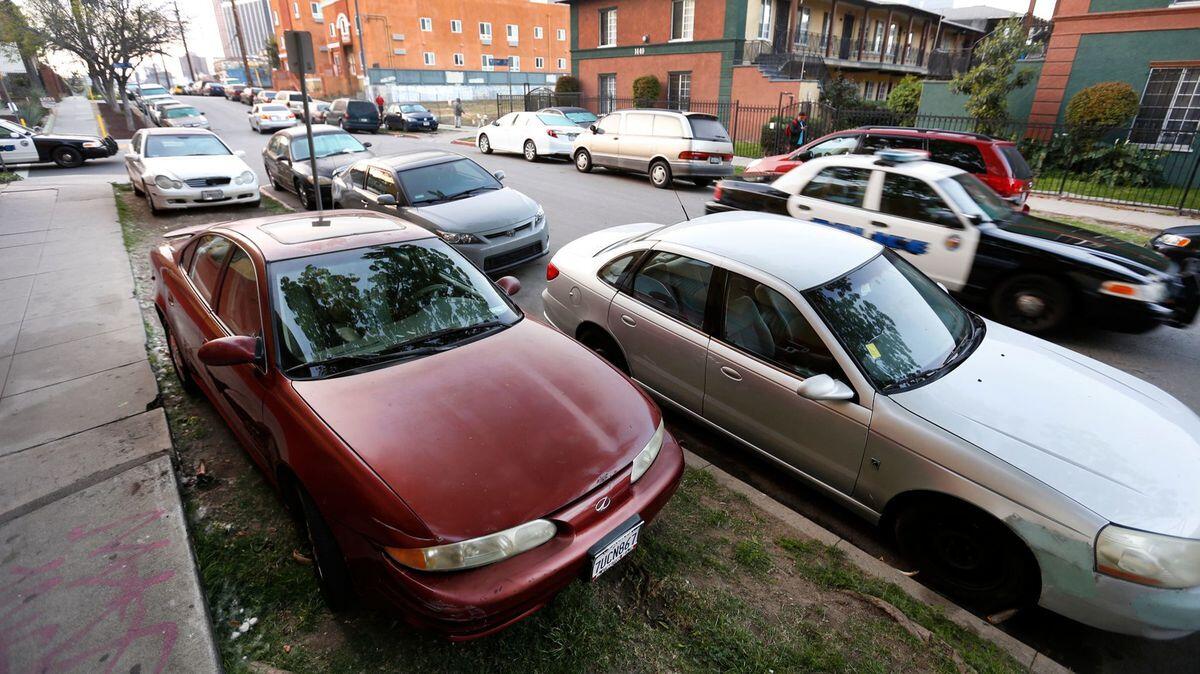
Following reports of increased car break-ins in California, Sen. Scott Wiener (D-San Francisco) said Monday that he will seek to close a loophole in state law that hinders prosecution.
Wiener said car burglaries have reached an “epidemic” level in his hometown. He will introduce a measure, modeled on another, unsuccessful bill he carried earlier this year, that would eliminate a requirement that prosecutors prove that a car’s doors were locked to get a conviction for automobile burglary.
He cited a 26% increase in thefts from vehicles last year in San Francisco, and said thieves are avoiding convictions in cases where they unlock the car, or the car owner leaves the car unlocked.
“The explosion in auto break-ins we’re experiencing is unacceptable, and we need to ensure our police and district attorneys have all the tools they need to address it,” Wiener said.
The Public Policy Institute of California issued a report in June that said there is evidence that some property crimes have increased in the state since voters in 2014 approved Proposition 47, which reduced the penalties for such offenses.
The study said larceny thefts increased by roughly 9% by 2016 to about 135 more thefts per 100,000 residents compared to other states. The report said thefts from motor vehicles accounted for about three-quarters of the increase.
The Los Angeles County Sheriff’s Department last month reported a “significant rise” in auto burglaries in the West Hollywood area suspected to be the work of gang members from the Bay Area. The department said that an investigation resulted in the arrest of two people and the recovery of more than 50 pieces of stolen property, including laptop computers.
- Share via
California Democratic Party chairman under investigation over allegations of sexual misconduct
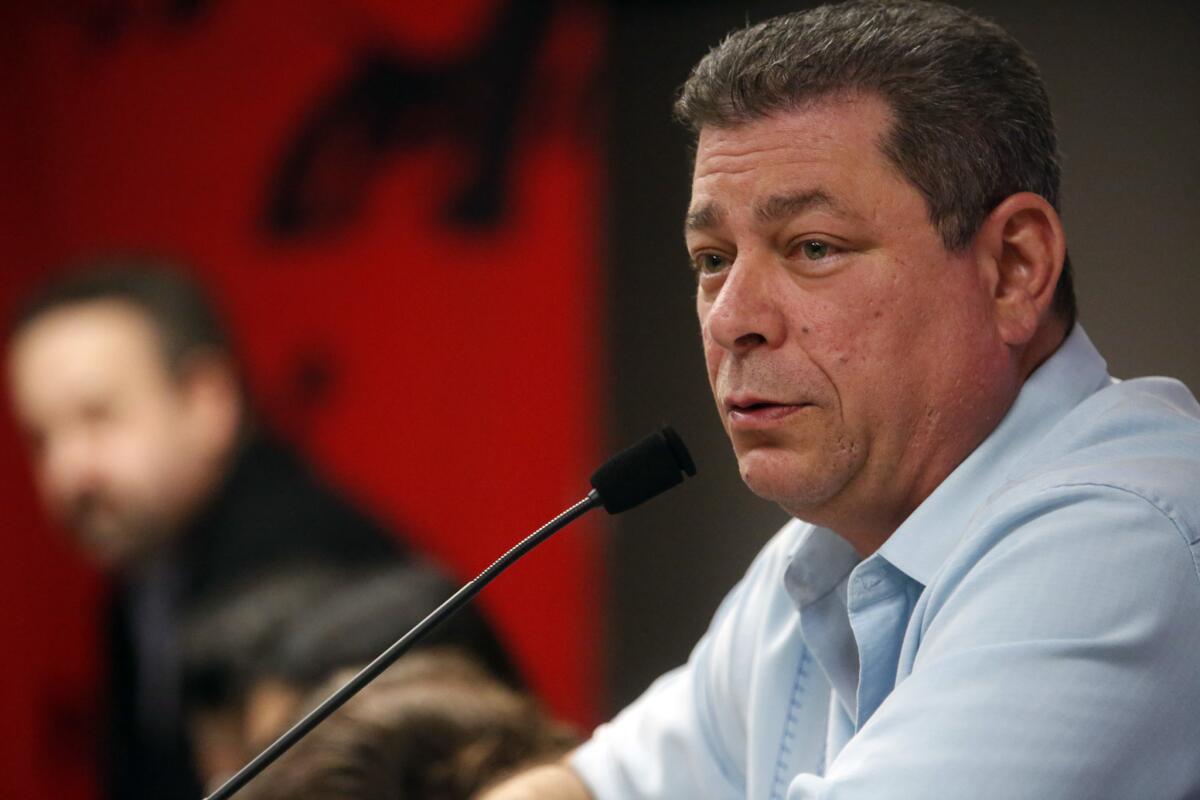
The California Democratic Party has launched an investigation into unspecified allegations of sexual misconduct against Chairman Eric Bauman involving party staff members.
In a statement released Saturday evening, Bauman confirmed an investigation was underway but did not address the allegations against him. He said that independent counsel has been hired to investigate the matter.
“I look forward to putting these allegations behind us and moving forward as unified Democrats,” Bauman said in the statement.
Last week, Daraka Larimore-Hall, a vice chairman of the state party, sent a letter to state Democratic Party leadership calling for Bauman’s removal.
In the letter sent on Tuesday, Larimore-Hall said he learned of the allegations during a recent party executive board meeting a week ago. He said he had spoken to two of the alleged victims and that their stories “illustrate a clear and escalating pattern of Chairman Bauman’s horrific and dehumanizing behavior.”
Larimore-Hall declined to provide details of the specific allegations and said in a public statement on Saturday that he was withholding the names of those involved to protect their privacy.
Bauman was elected chairman of the party in 2017, after a closely contested election against progressive activist Kimberly Ellis. A former nurse and organizer, he led the Los Angeles County Democrats for 17 years and also served as vice chairman for the statewide party for eight years.
According to state Democratic Party sources, the outside counsel hired to investigate the allegations is Debra Henshaw Vierra, an employment law attorney at the Sacramento law firm Churchwell White.
Bauman has been under investigation for at least one harassment complaint involving employees prior to the Nov. 6 election, according to sources familiar with the investigation.
“These allegations are very troubling and deserve a full and thorough investigation,” Gov.-elect Gavin Newsom said in a statement on Sunday. “Sexual harassment has no place in the California Democratic Party, and people who are victims deserve to have their voices heard, free from intimidation and judgement.”
4:08 p.m.: This article was updated with additional background on Bauman and a statement from Gov.-elect Gavin Newsom.
This article was originally published at 10:32 a.m.
- Share via
Jennifer Siebel Newsom will be California’s ‘first partner.’ Her agenda is cultural change
It was Gavin’s big moment. But first it was Jennifer’s.
An hour after her husband was elected California’s next governor, Jennifer Siebel Newsom took the stage alone at his Los Angeles victory party to extol his win, and welcome — in English and Spanish — all Californians to their extended family.
It’s not uncommon for a political spouse to play election-night emcee. Less common was the message staring back at her on the electric-pink T-shirts of a cluster of audience members: WE LOVE GAVIN + JEN.
- Share via
Bail bond industry moves to block sweeping California law, submitting signatures for a 2020 ballot referendum
A coalition of bail bond industry groups took a major step Tuesday toward blocking California’s historic overhaul of the bail system, submitting more than enough signatures required for a statewide referendum on the law in 2020.
If the signatures are verified by elections officials, the law signed by Gov. Jerry Brown in August would be suspended until voters decide whether to overturn it, allowing bail agents to continue doing business before the industry’s future in California is decided.
The effort to end cash bail has picked up critics on both sides of the issue.
- Share via
California Supreme Court recommends Gov. Jerry Brown pardon former state Sen. Roderick Wright
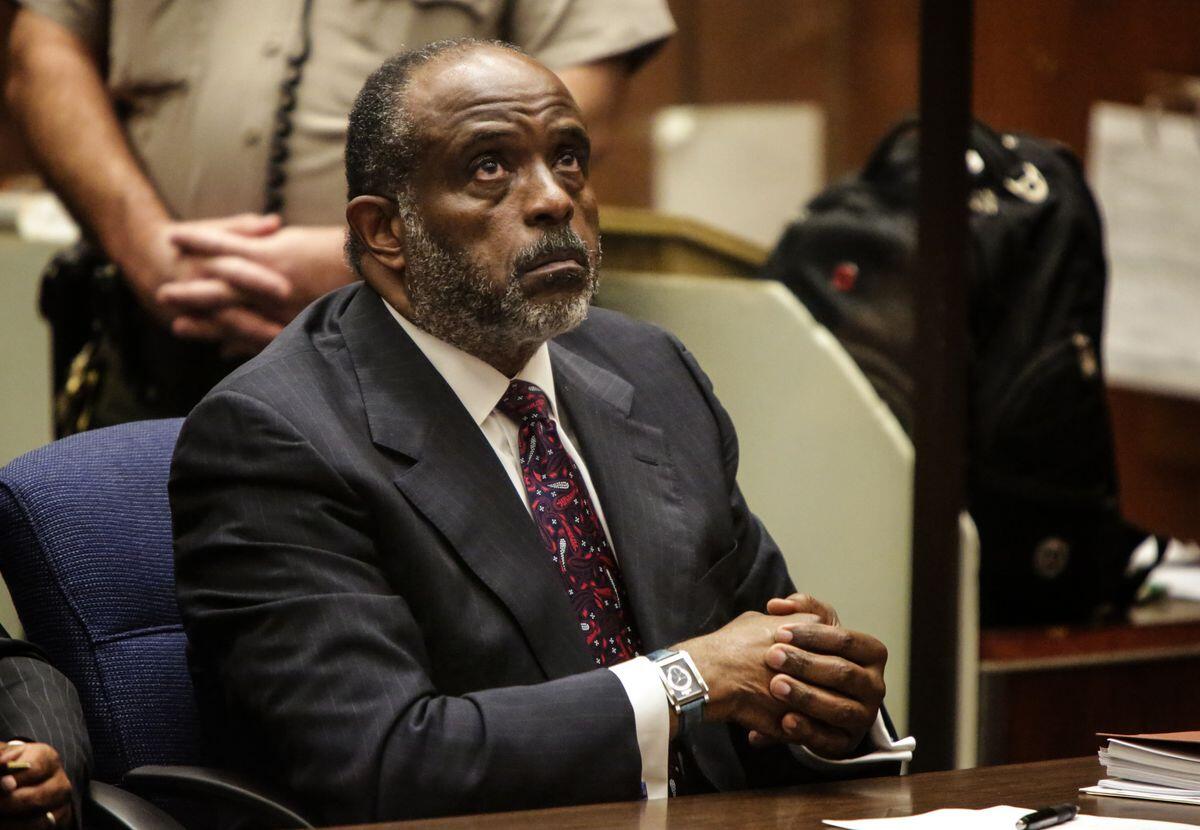
The California Supreme Court on Tuesday paved the way for Gov. Jerry Brown to consider a pardon for former state Sen. Roderick Wright, who resigned after he was convicted in 2014 on felony charges of lying about living in his district.
The court recommended that the governor grant a pardon, according to Jorge E. Navarrete, the clerk of the court. Brown’s office has signaled he is likely to grant clemency in the case before he leaves office in January.
“As the Board of Parole Hearings has found, Sen. Wright’s application presents a favorable case for a pardon,” Peter A. Krause, the governor’s legal affairs secretary, said in a letter to the court last month.
The court does not provide the reasoning for its recommendation, which it made based on the record that includes a recommendation by the parole board in September.
Wright, 66, said he believed he complied with state law.
“I’m certainly sorry for the challenges I brought forth in terms of questions about my house, and I take full responsibility,” Wright said in a recent interview. “I thought I was correct, but the jury didn’t agree with me.”
Wright, a Democrat, resigned from the Senate and was barred for life from holding public office as a result of the conviction on eight felony charges that included perjury and voting fraud. He was sentenced to three months in jail but served less than a day because of jail overcrowding.
During the criminal trial, prosecutors said Wright had made it appear that he lived in a rental complex he owns in Inglewood to run for the Senate seat in 2008, but that his true residence was a house in Baldwin Hills, outside the district.
Wright told a Los Angeles County jury that he believed he had taken the necessary steps to establish the Inglewood property as his domicile and had not intended to deceive voters when he arranged to rent a bedroom in the unit.
Wright, who has been teaching at UC Davis, said the law on residency was ambiguous.
“The problem is there is nothing in the election code that says how many days you have to sleep in your domicile,” Wright said. “People commonly say you have to live in your district, but that is not in the elections code.”
Brown’s office gave the court a review of the pardon request and letters from people who support a pardon, but the governor’s staff refused to make those documents public.
Wright’s application also requests a pardon for a 1972 conviction, when Wright was 19, for taking a motor vehicle without the owner’s consent. He served three years’ probation for the older conviction.
“The crimes for which Sen. Wright was convicted — vehicle theft, perjury, false declaration of candidacy, and fraudulent voting — were nonviolent in nature,” Krause wrote to the court. “Moreover, Sen. Wright has devoted much of his life to public service, including serving six years in the California State Senate and six years in the California Assembly. Since his conviction, Sen. Wright has been employed as a consultant on government affairs and is an adjunct professor.”
The law requires four Supreme Court judges to concur in the recommendation of the parole board before it can go to Brown for consideration.
Krause noted that after Wright’s conviction, the Legislature enacted a new law that clarifies the requirements regarding where legislators live, writing that the Board of Parole Hearings found that “establishing a domicile in the manner Mr. Wright did during the period of 2007 to 2009 would be permissible under the bill.”
- Share via
California’s tab to fight Camp and Woolsey fires tops $118 million

California’s costs to fight two deadly wildfires that ignited less than two weeks ago have already topped $118 million — a sizable financial hit to a program that needed an unexpected cash infusion just two months ago.
Cal Fire officials said Tuesday that $589.7 million has been paid out by the state’s fire emergency, or “e-fund,” account since July 1. Officials are poised to free up additional dollars before lawmakers consider a new state budget early next year.
Cal Fire officials said battling the Camp fire, which has killed 79 people and burned more than 151,000 acres across Butte County, has cost more than $68 million. The state’s response to the Woolsey fire, which has burned almost 97,000 acres in Ventura and Los Angeles counties and killed at least three people, has cost more than $50 million.
Those costs will rise, perhaps sharply, in the coming weeks. Both fires were sparked on Nov. 8, and crews continue to make progress toward containment.
State officials are quick to point out that firefighting costs are fully paid, no matter the final tally. Lawmakers initially budgeted $442.8 million in e-fund spending for the fiscal year that runs through early summer 2019. In September, they added another $234 million to the program. That decision is similar to those made in recent years as the number and size of California fires have increased.
Even so, the magnitude of firefighting expenses in just the first five months of the state’s fiscal year is sobering. By the end of July, just weeks after Gov. Jerry Brown signed a new state budget into law, the price tag of fires had already hit almost $115 million — before the massive Carr fire outside Redding erupted at the end of the month, burning close to 230,000 acres and killing eight people.
For most of the past decade, state government e-fund costs have outpaced budgeted expenses. The money is used for whatever items or services firefighters and emergency crews need to respond to an incident. State finance officials have the flexibility to dip into other cash reserves as needed to cover those costs.
Cal Fire officials on Tuesday said that approximately 7,000 firefighters were working to bring the Camp and Woolsey fires under control.
- Share via
California should spend $1.6 billion more next year to combat its child poverty crisis, new task force finds
California must significantly increase the money it spends on child care, food assistance and other social services — by as much as $1.6 billion in the first year alone — to narrow an income divide that has left almost 2 million children living below the poverty line, a new state task force said Monday.
The group, assembled by state government last year to address the child poverty crisis, is calling on Gov.-elect Gavin Newsom to earmark money in next year’s state budget for expansion of antipoverty programs. It has crafted a plan to phase in nearly $14 billion for the efforts over the next decade, saying the savings to the state will balance out the costs in the long term.
Task force members say the recommendations in their first report are meant to strengthen the social safety net for low-income families and could help create better living conditions for as many as 450,000 of the most impoverished children in the state over the next four years alone. The group hopes to find an ally in Newsom, who has vowed to combat homelessness and closed out his winning campaign with a focus on the needs of the youngest Californians.